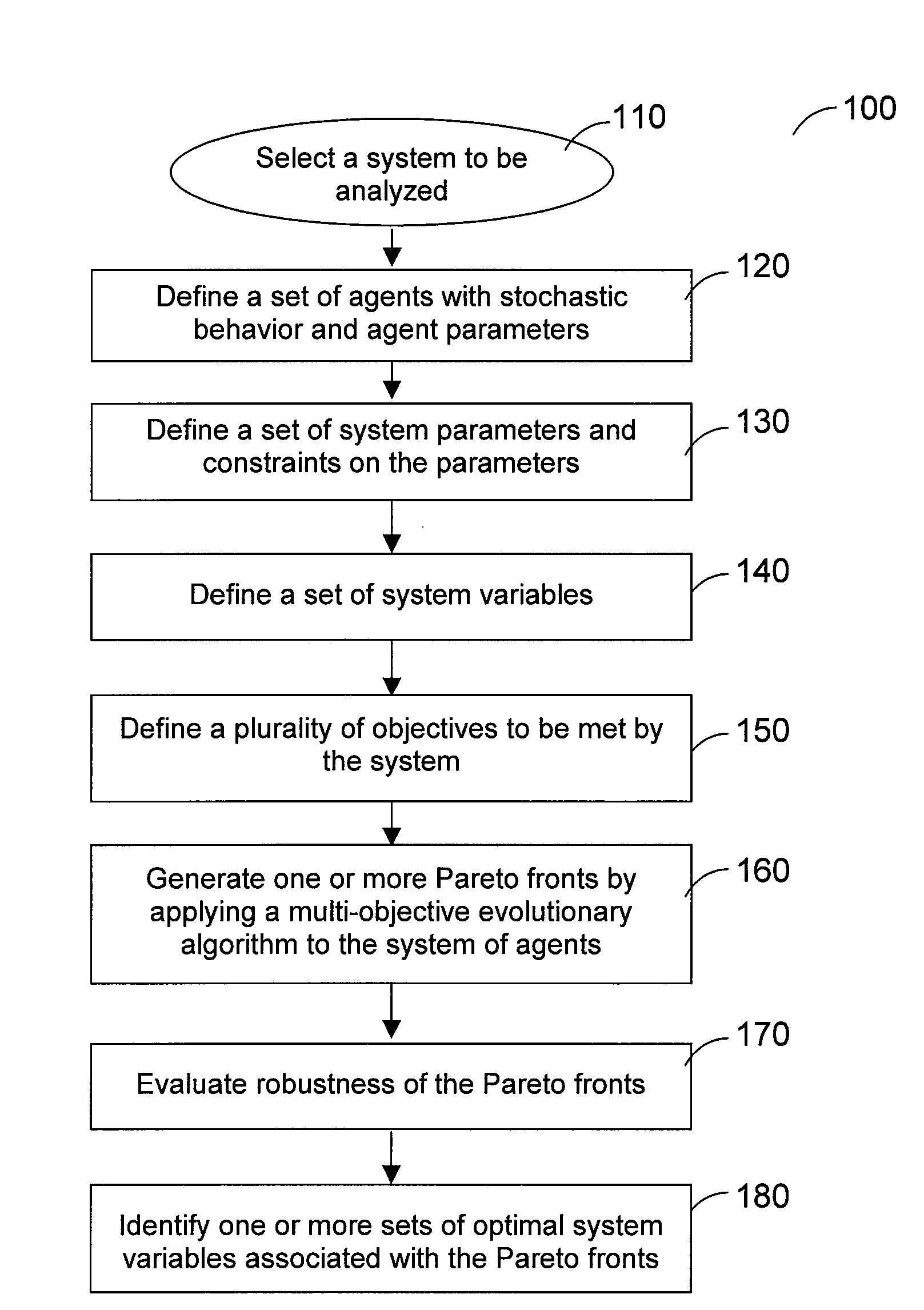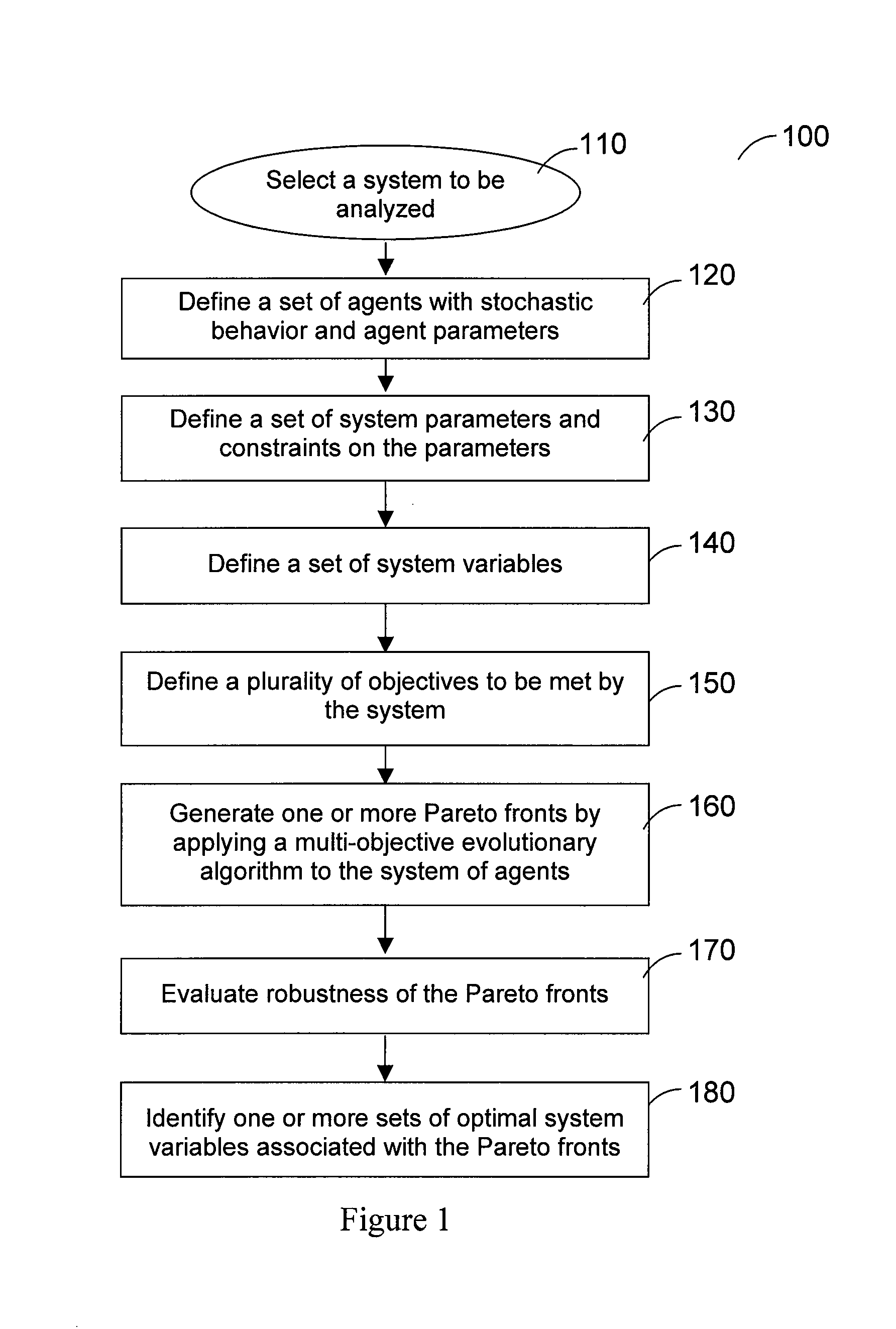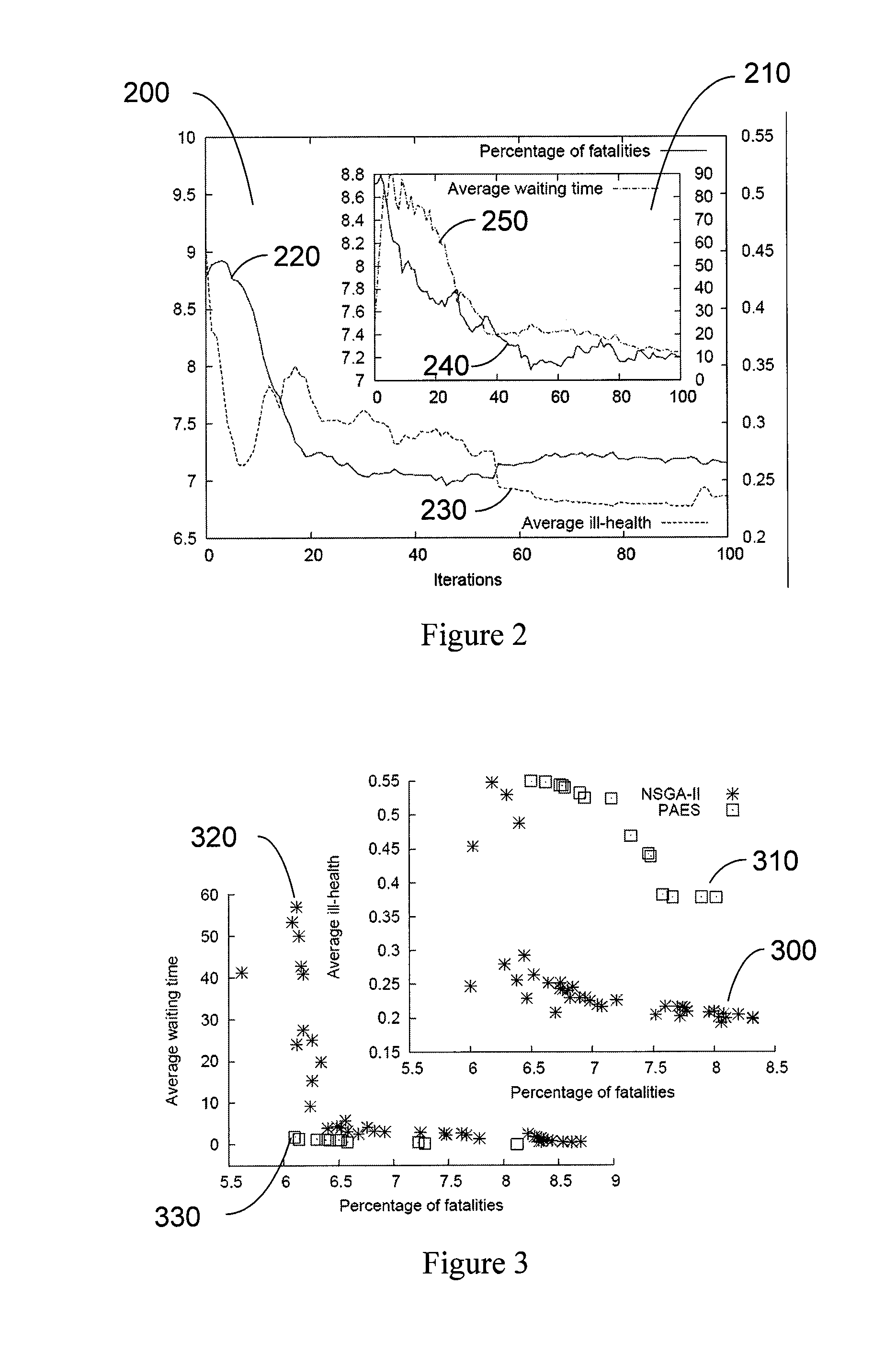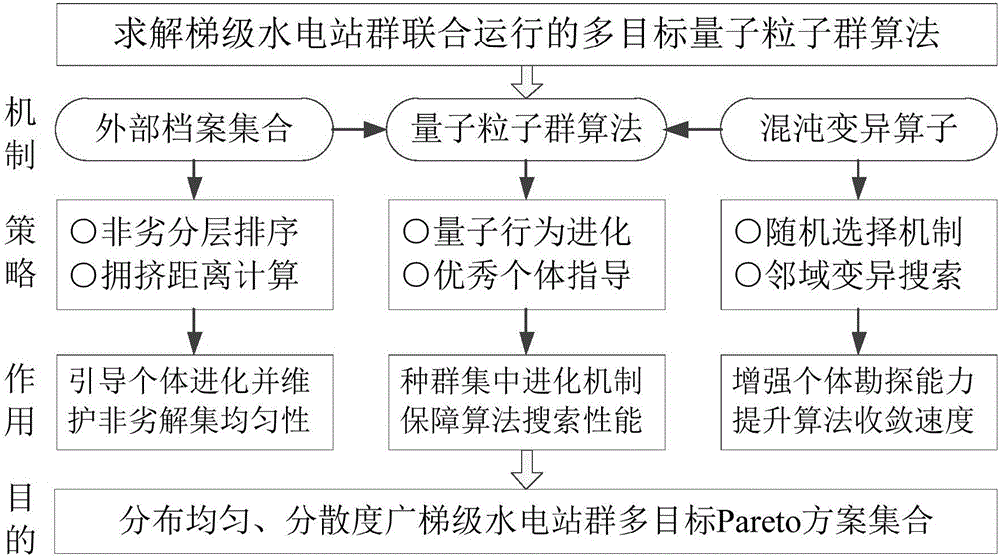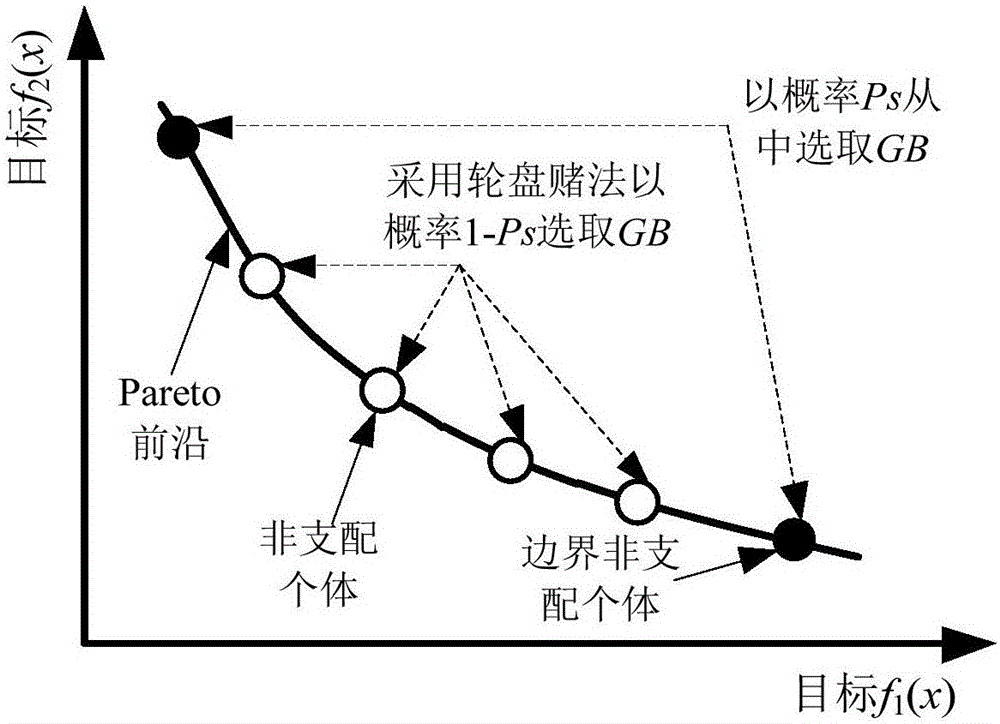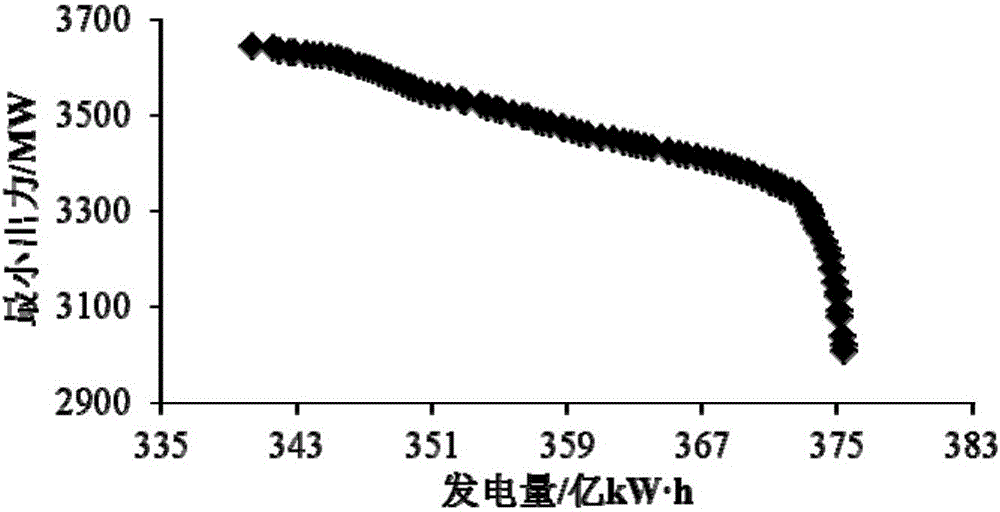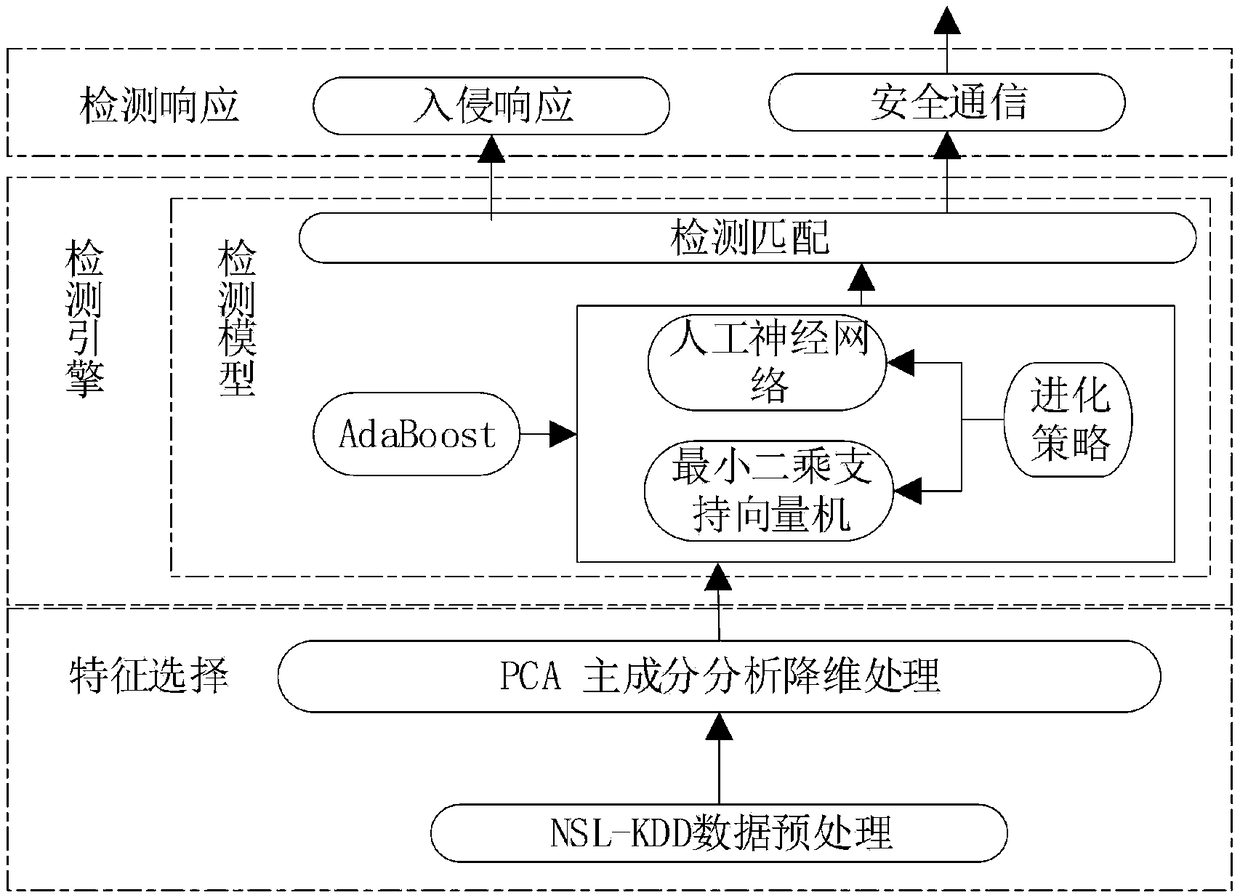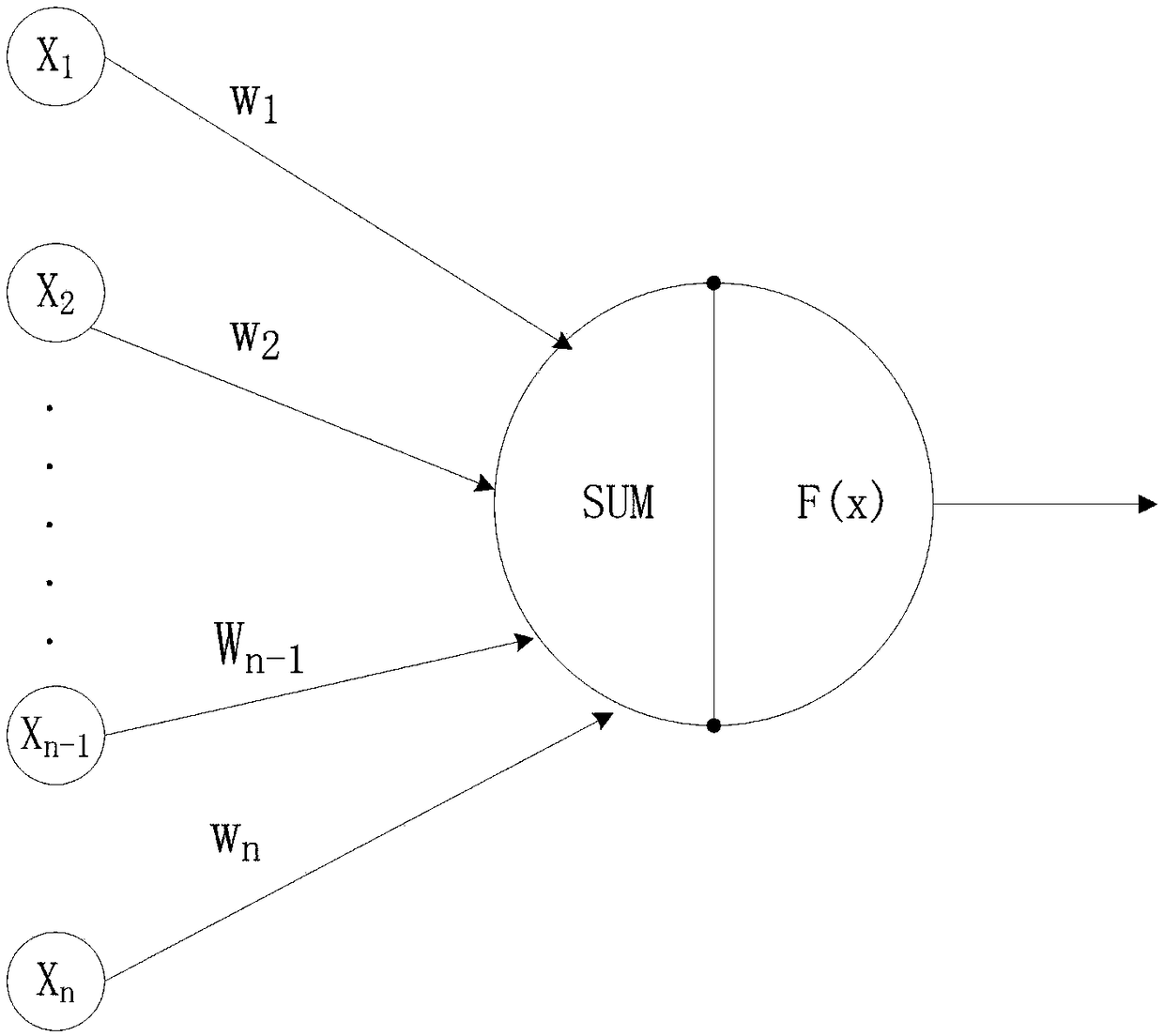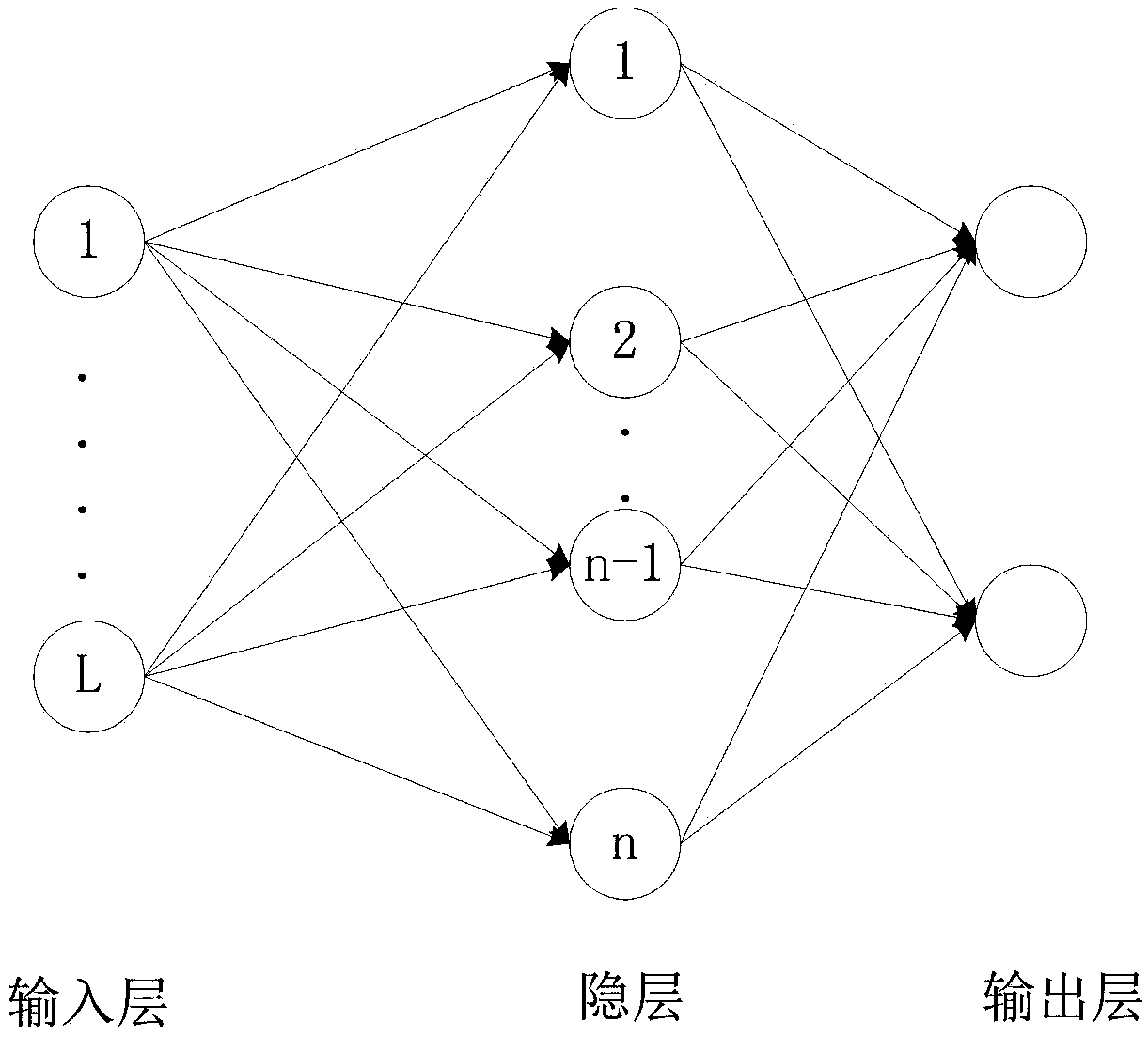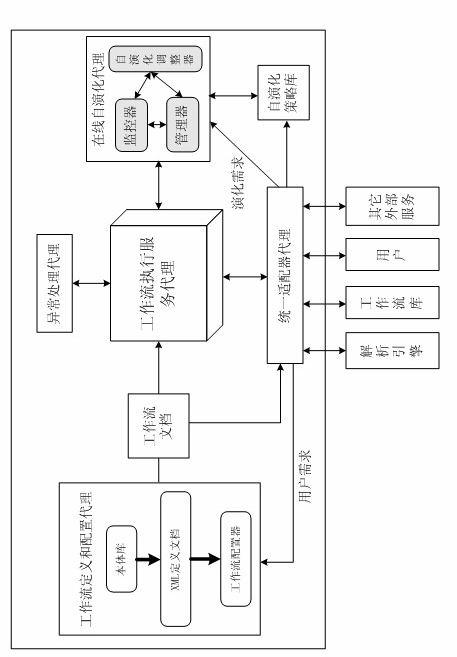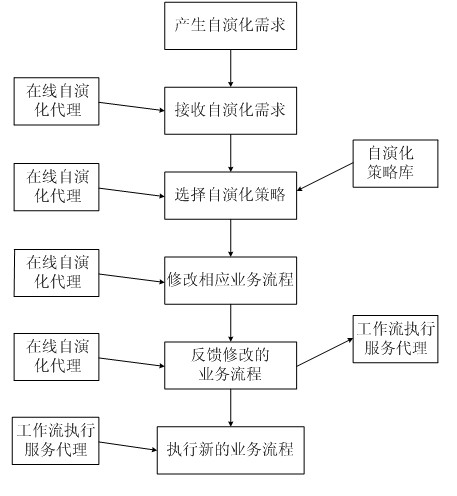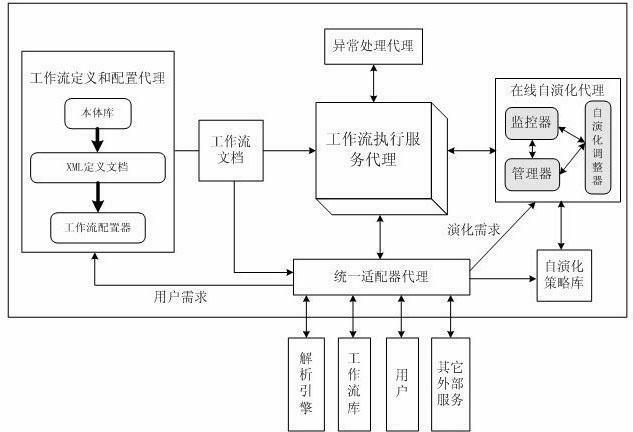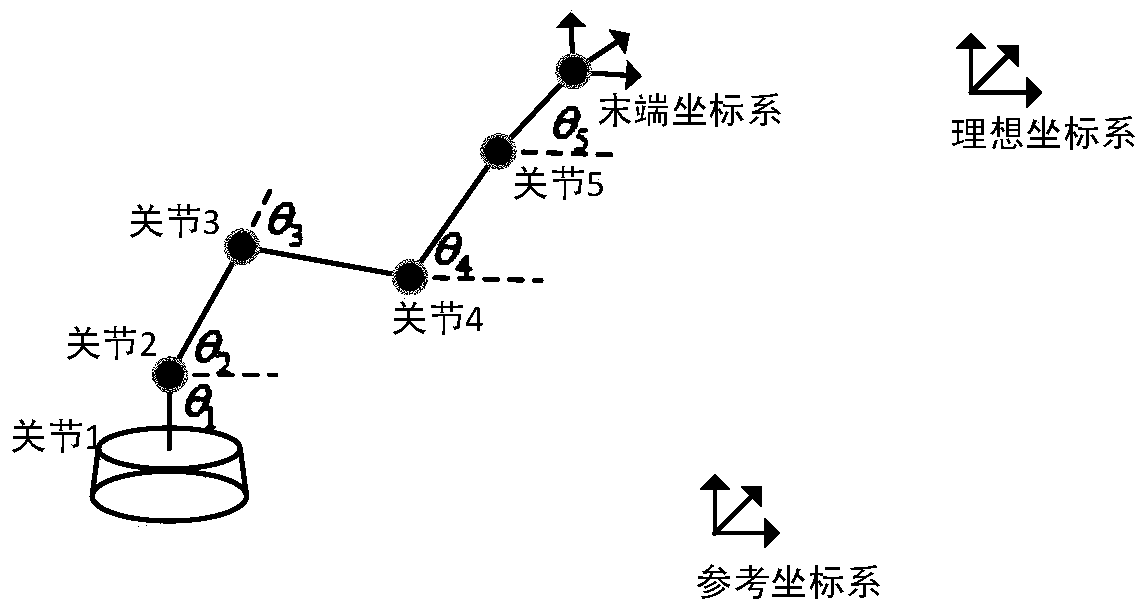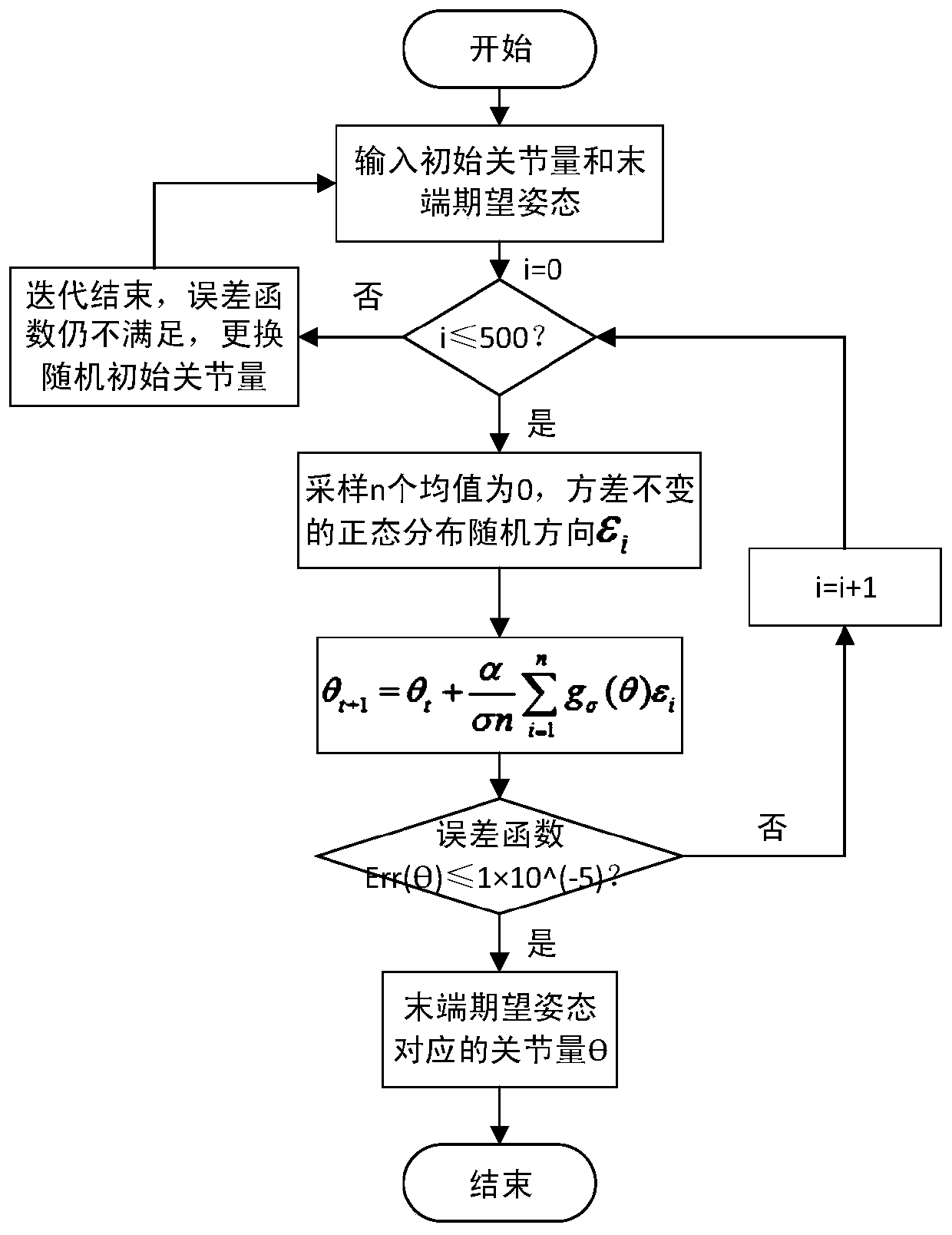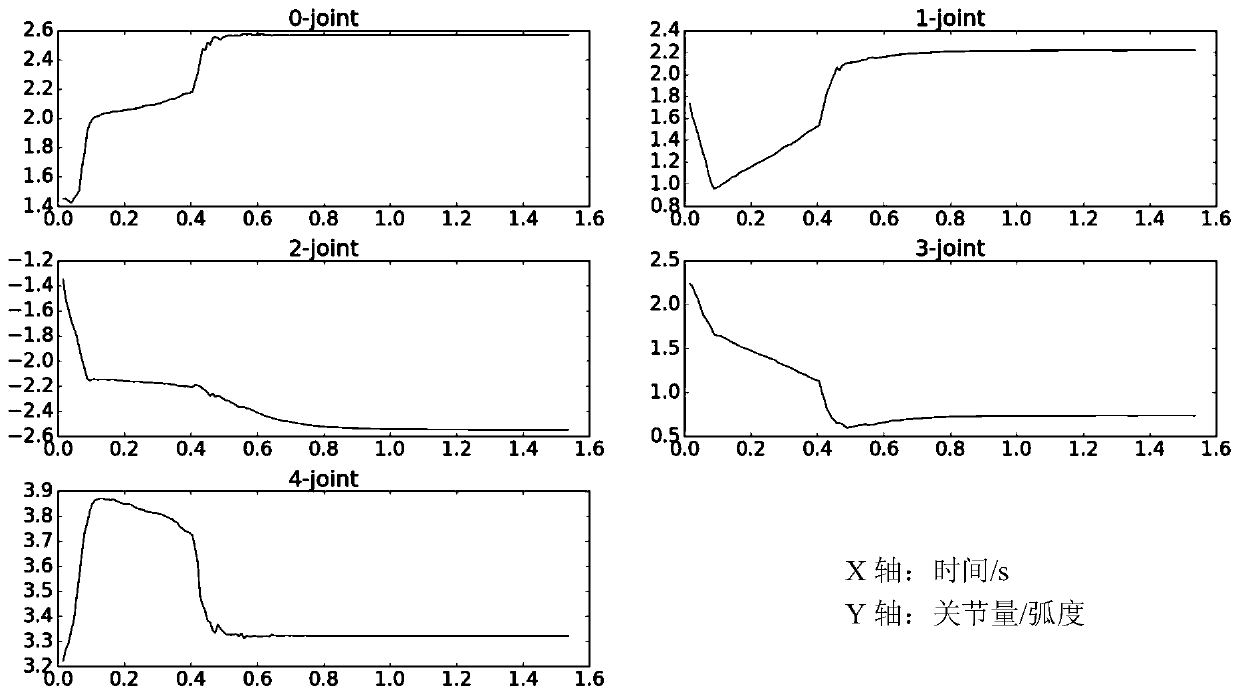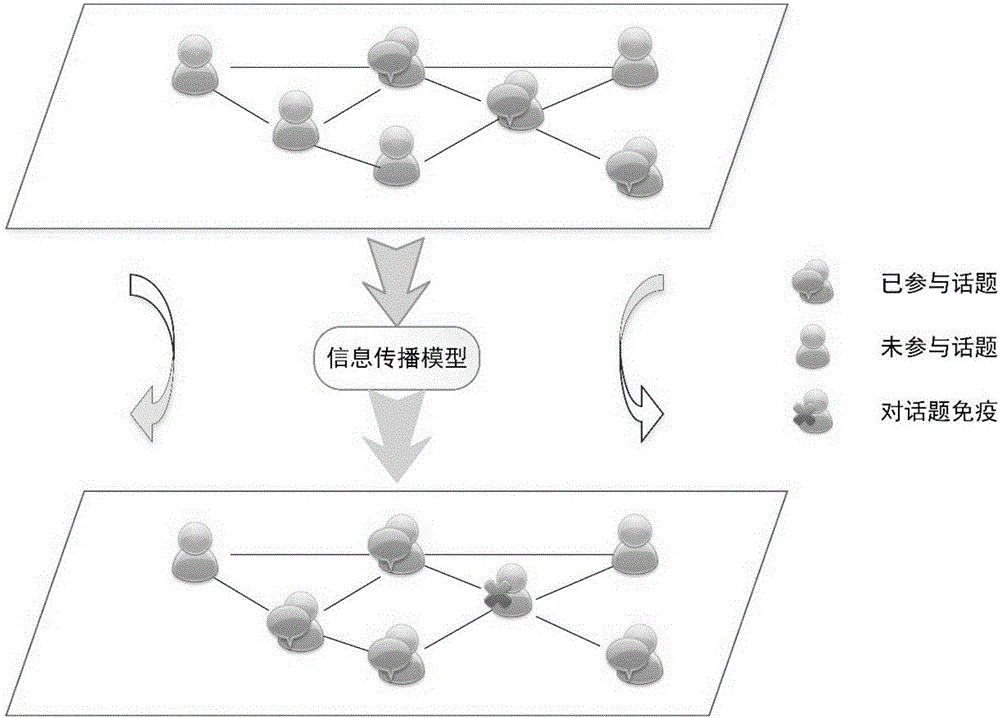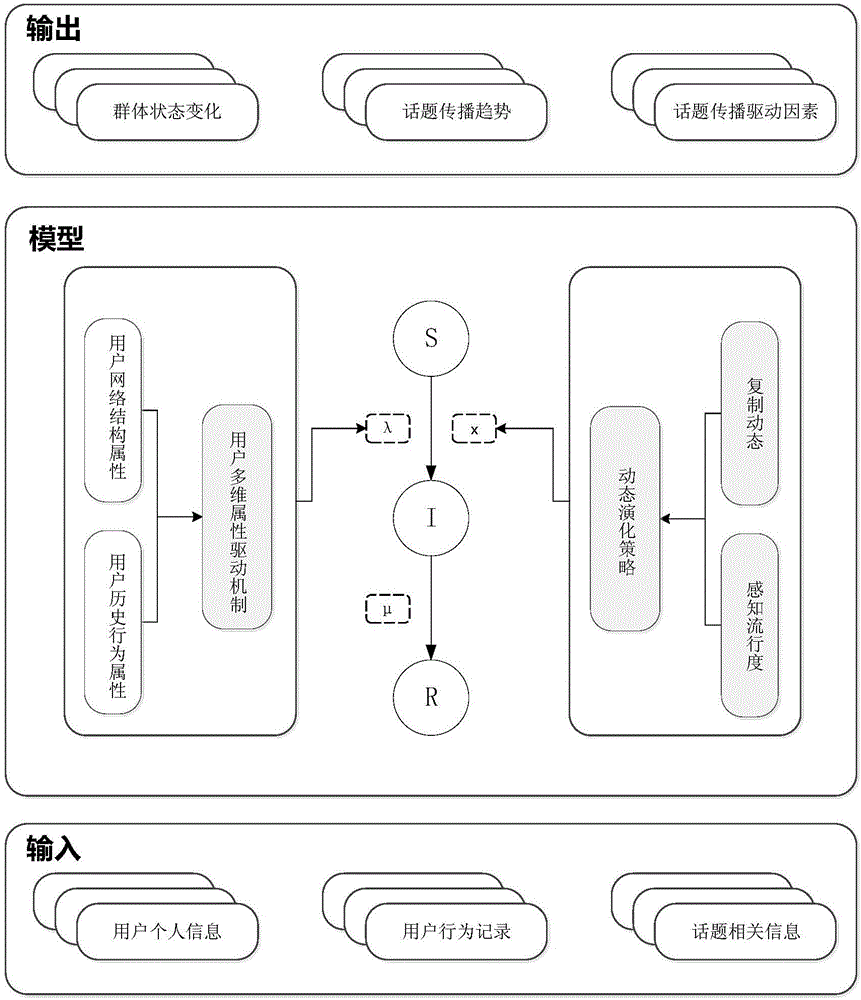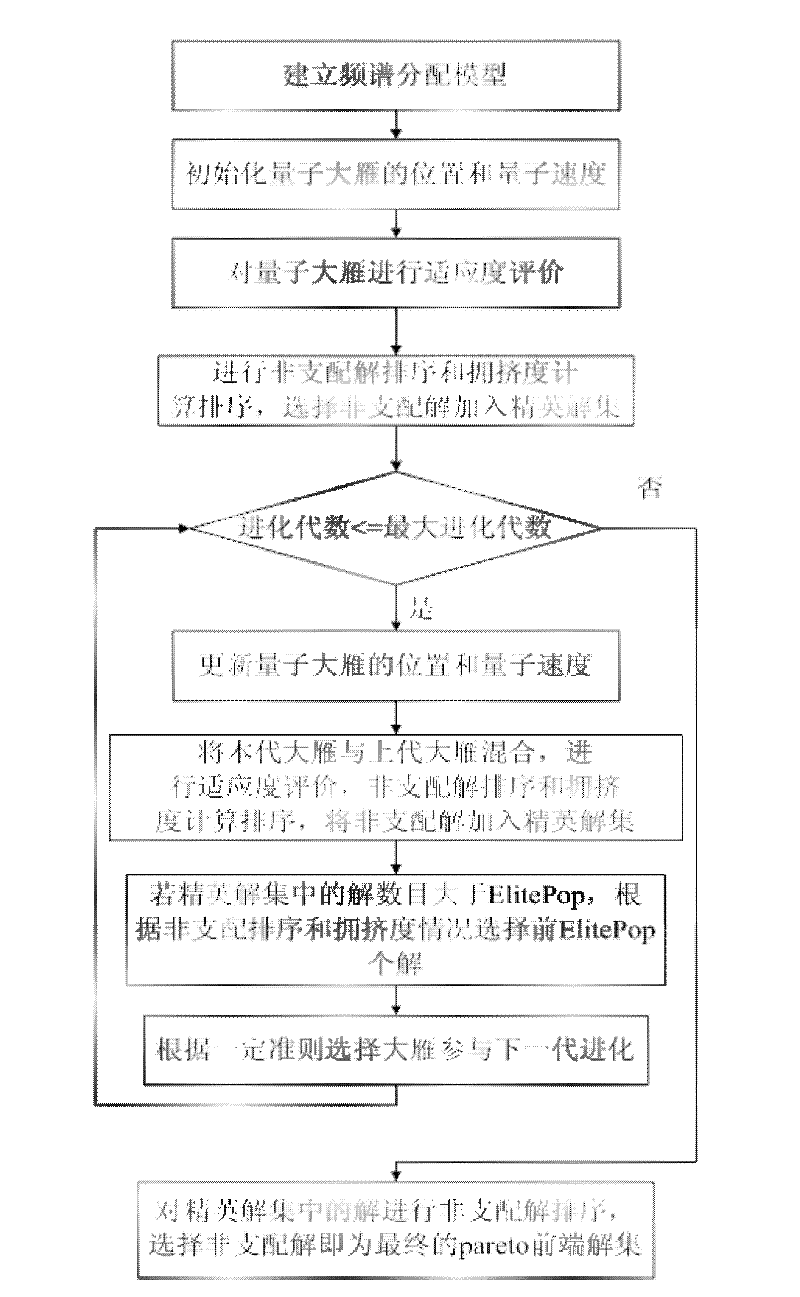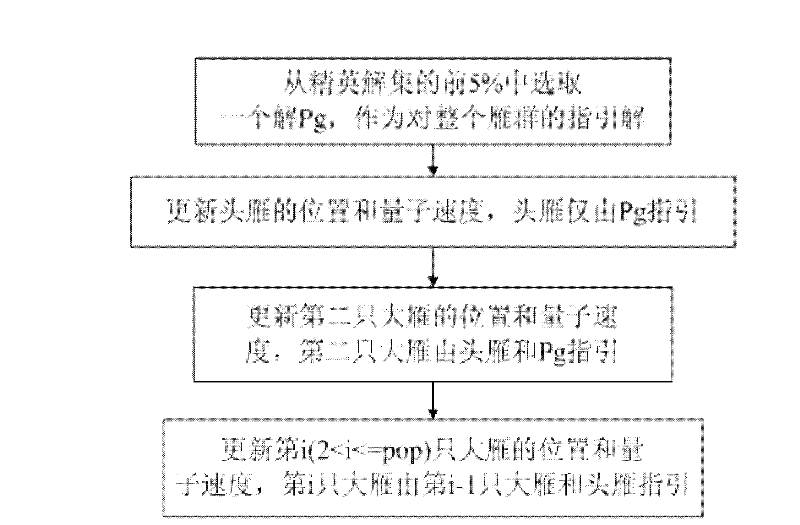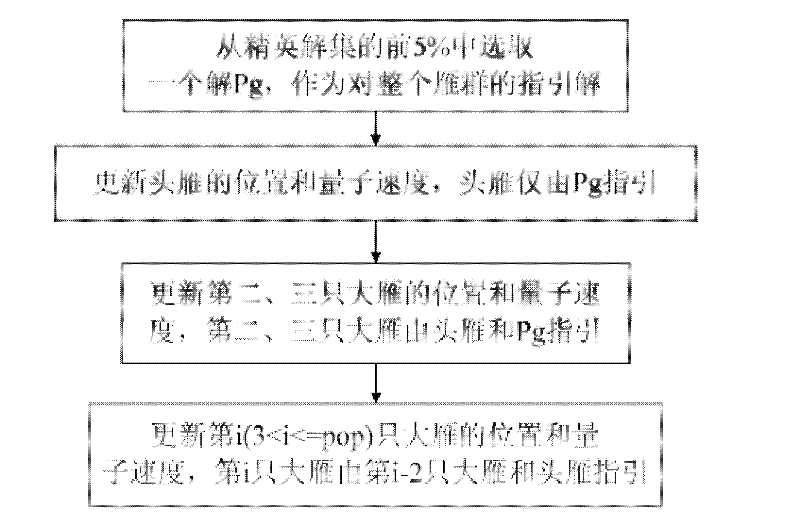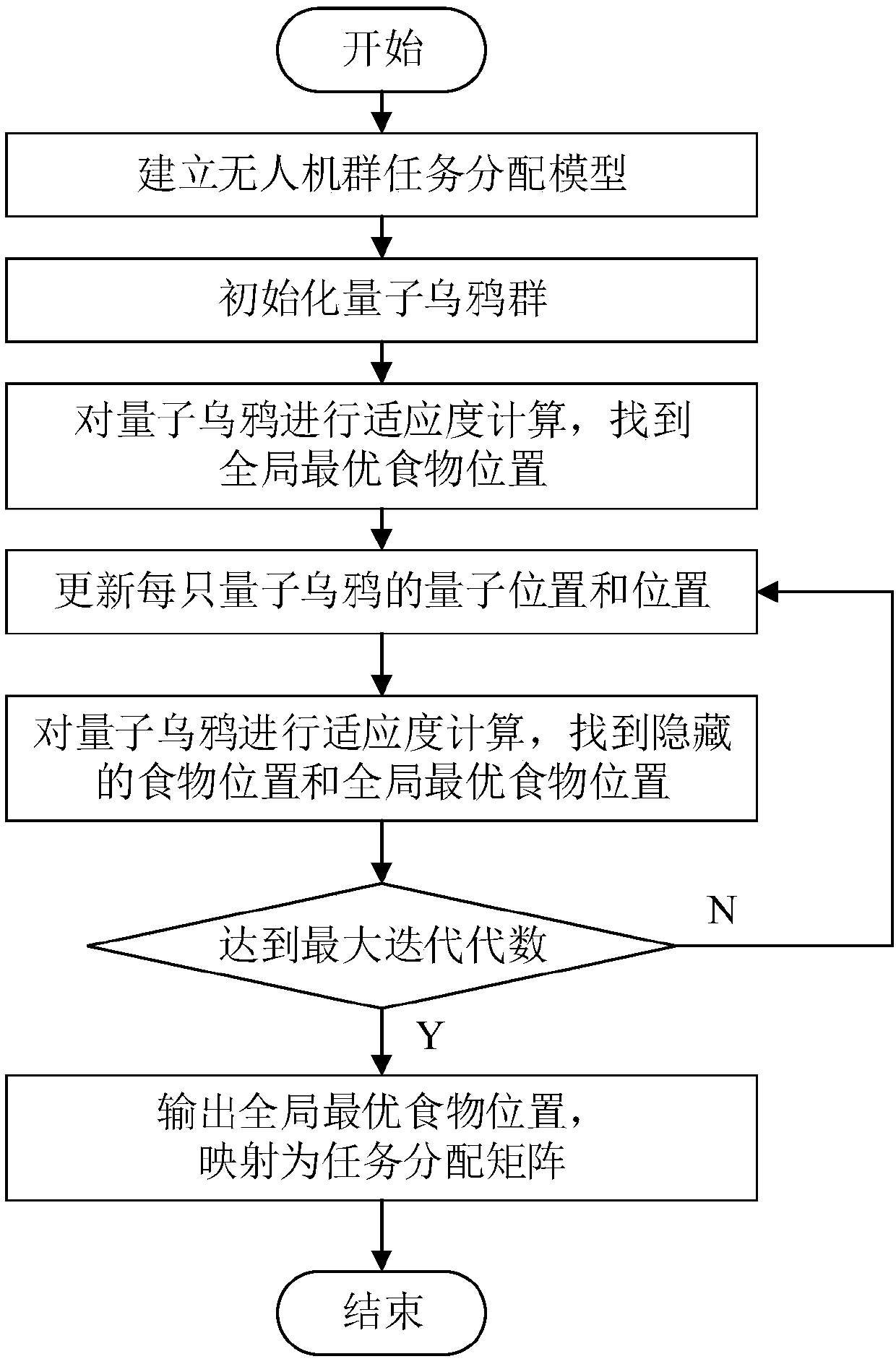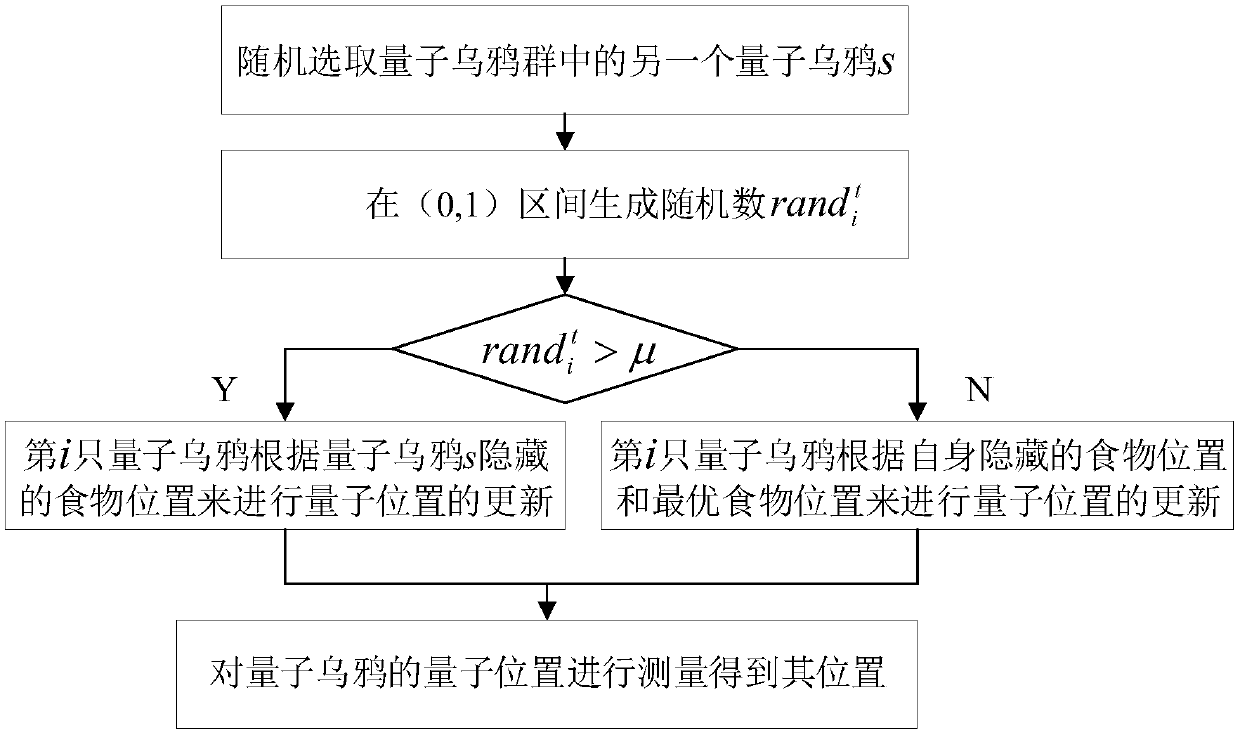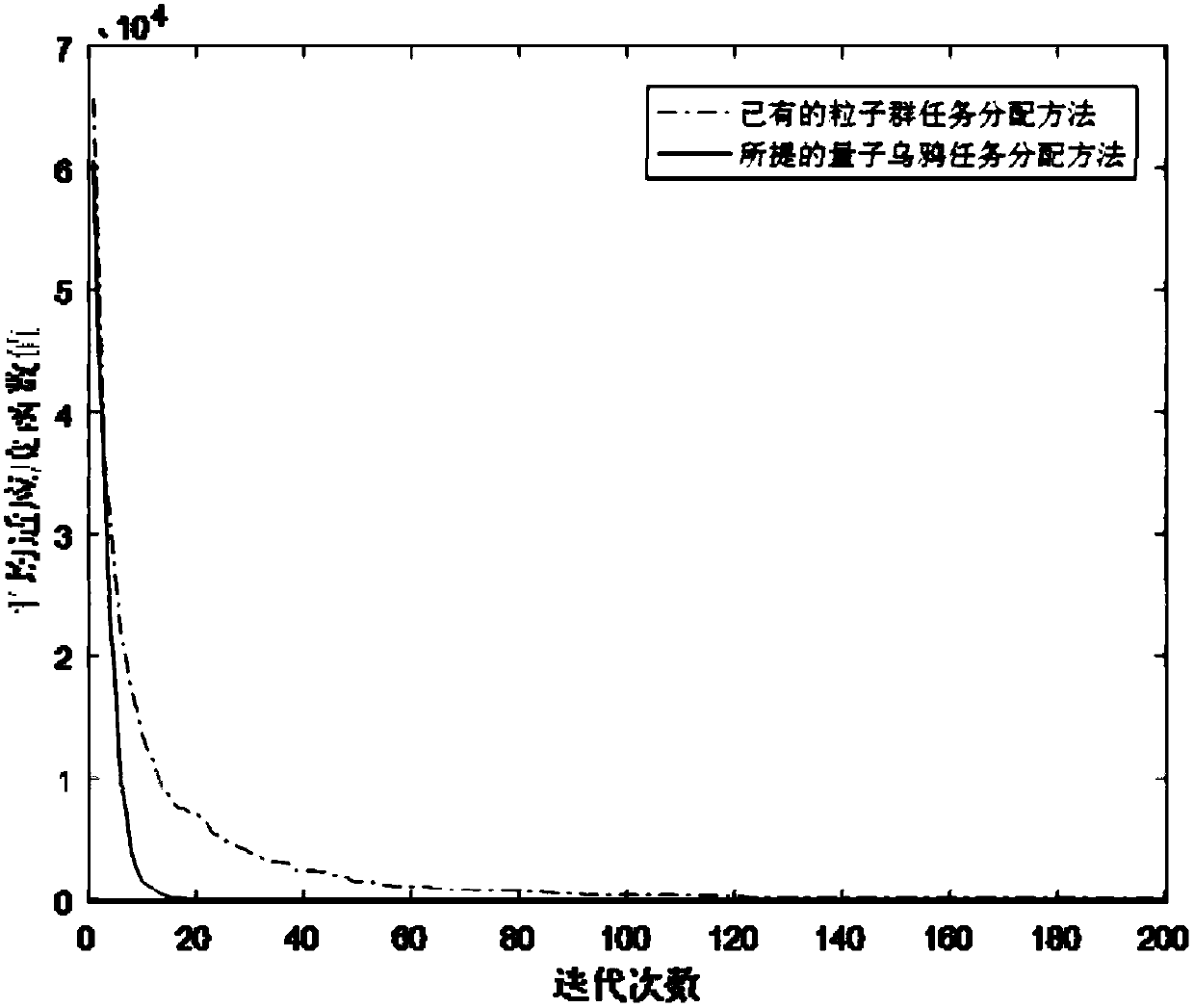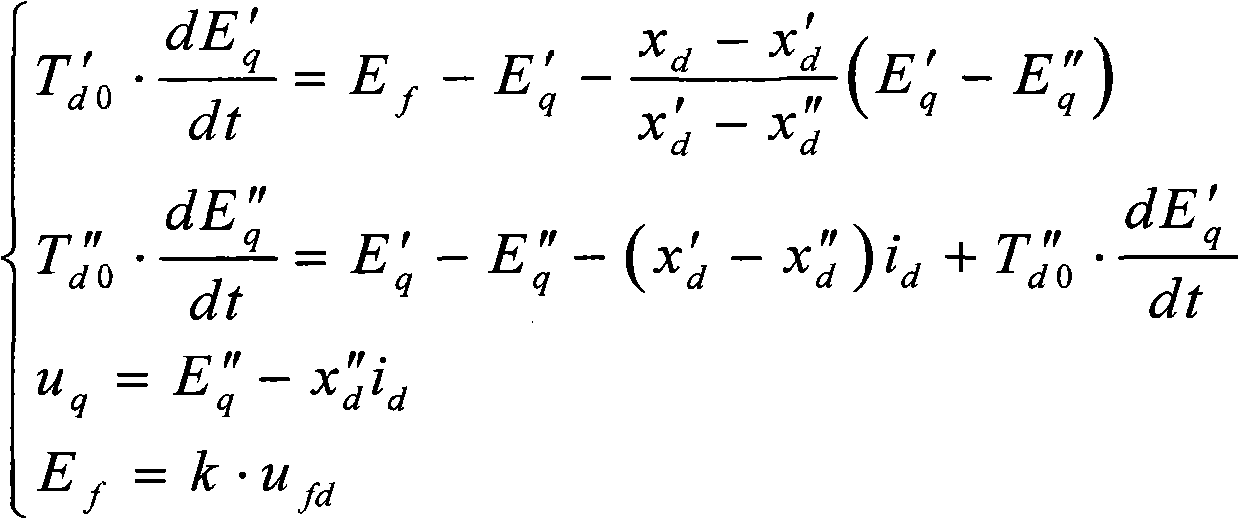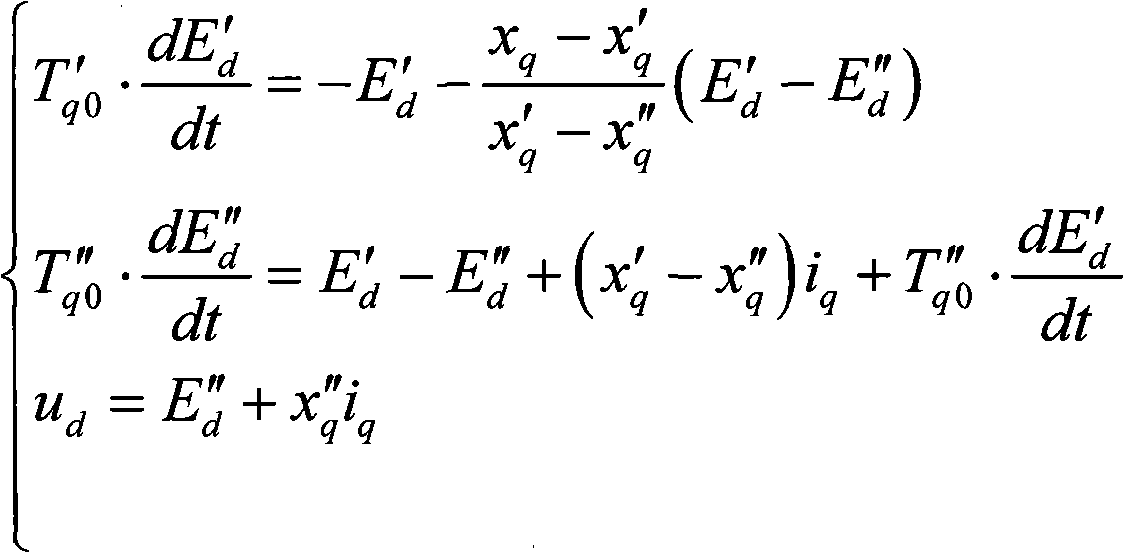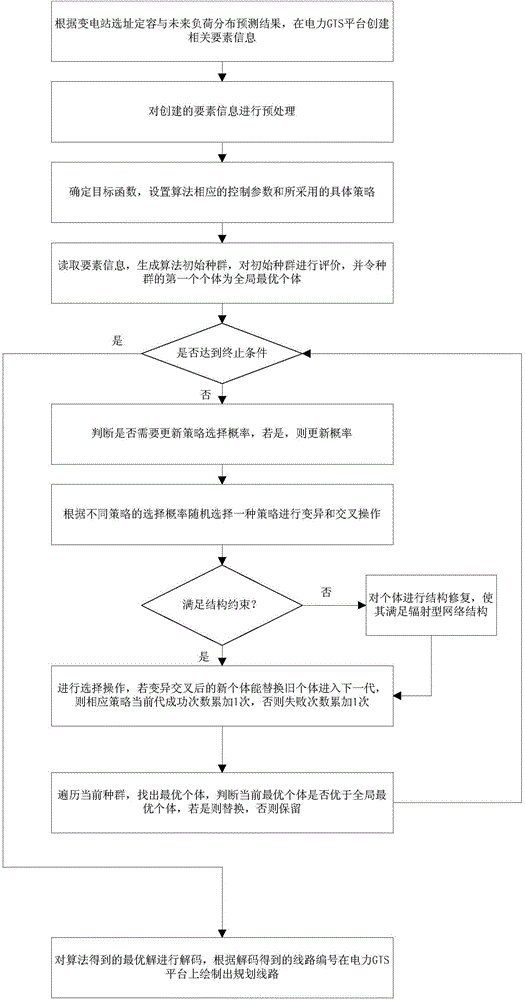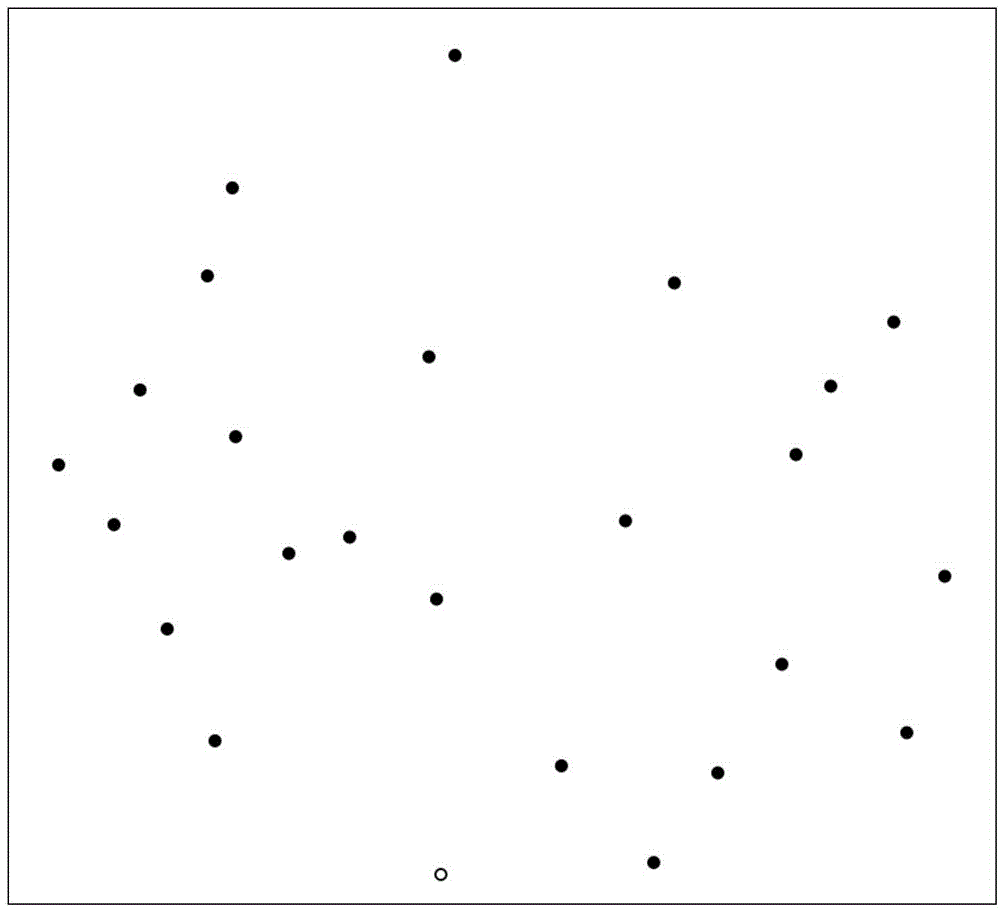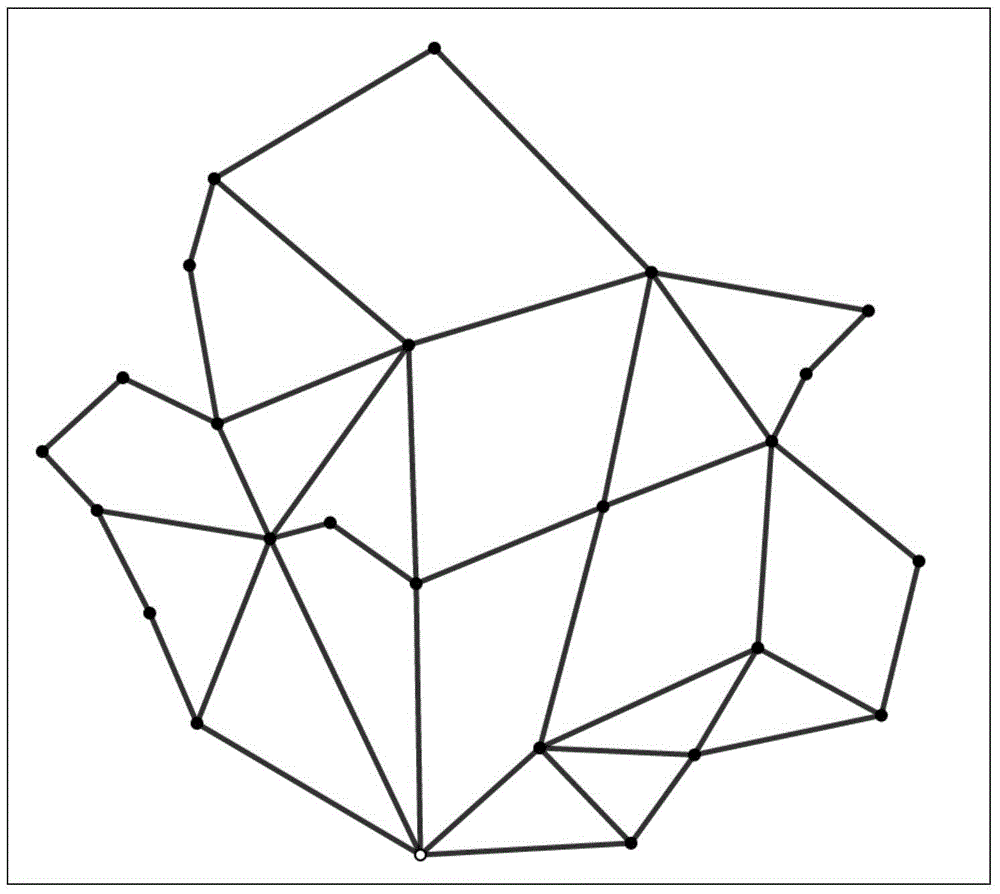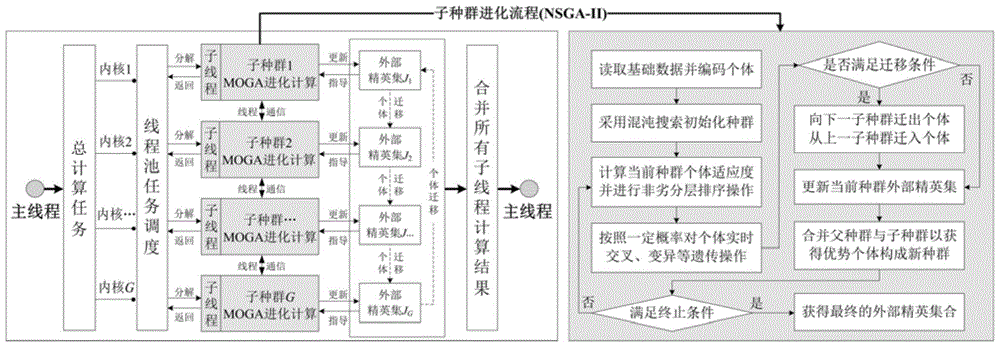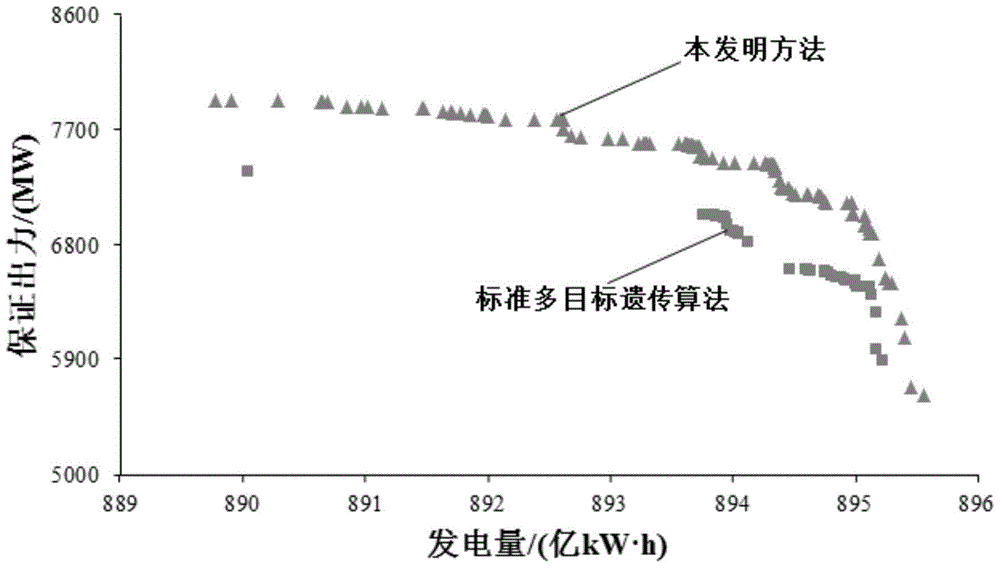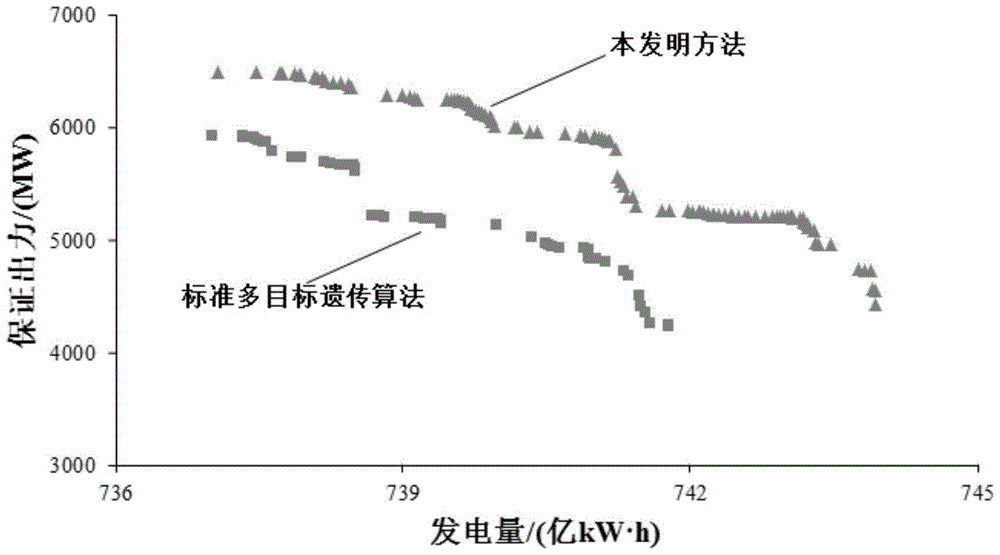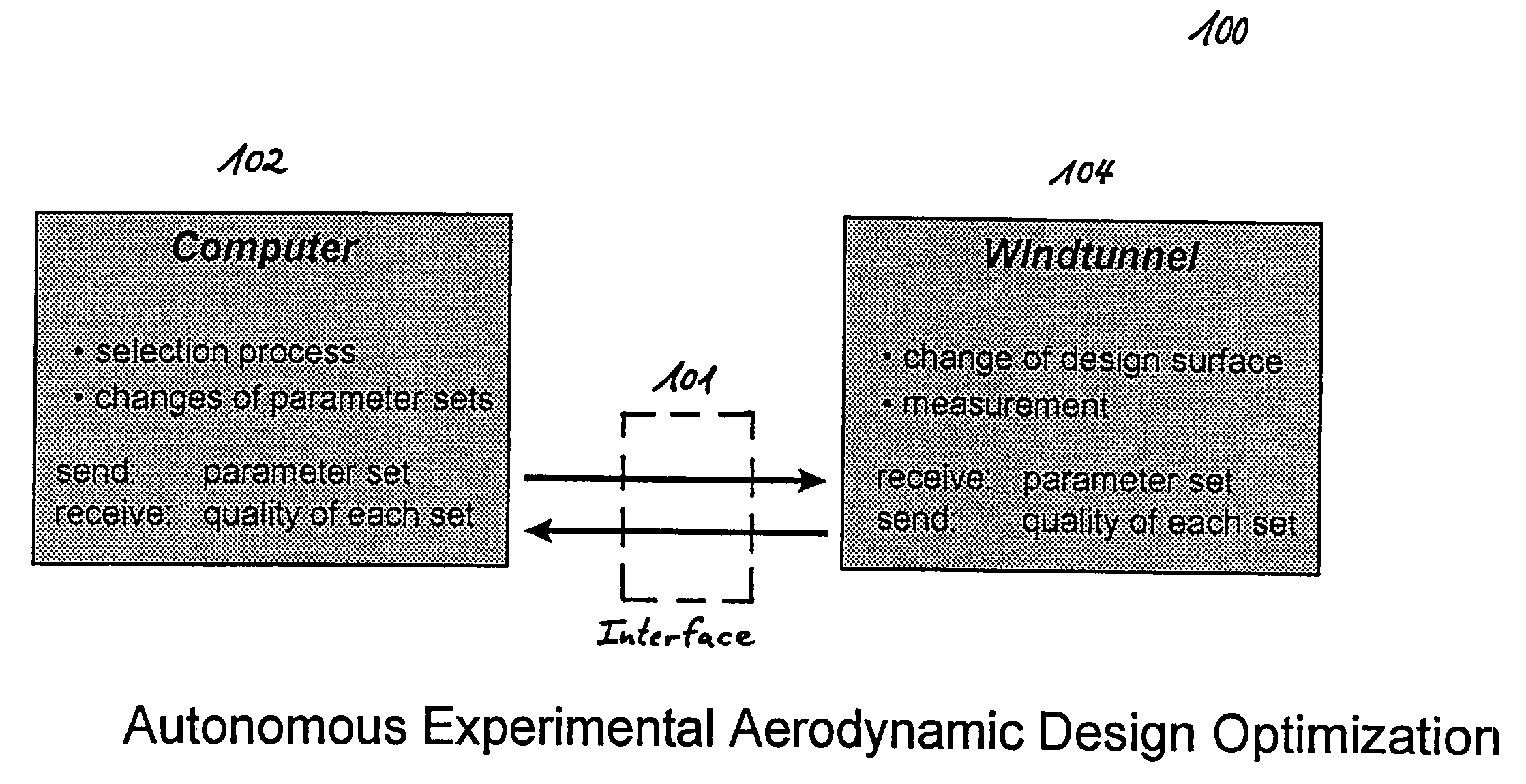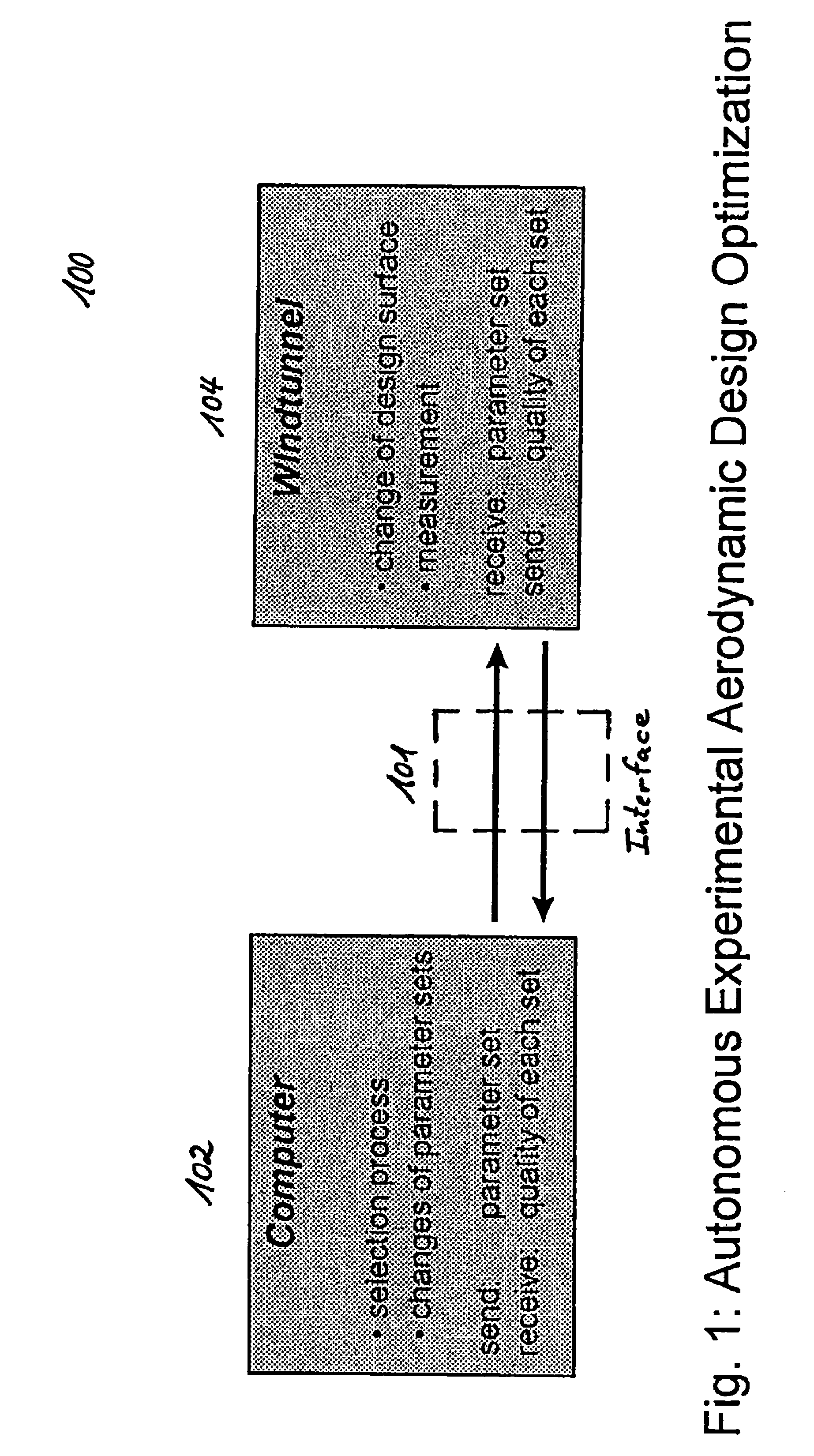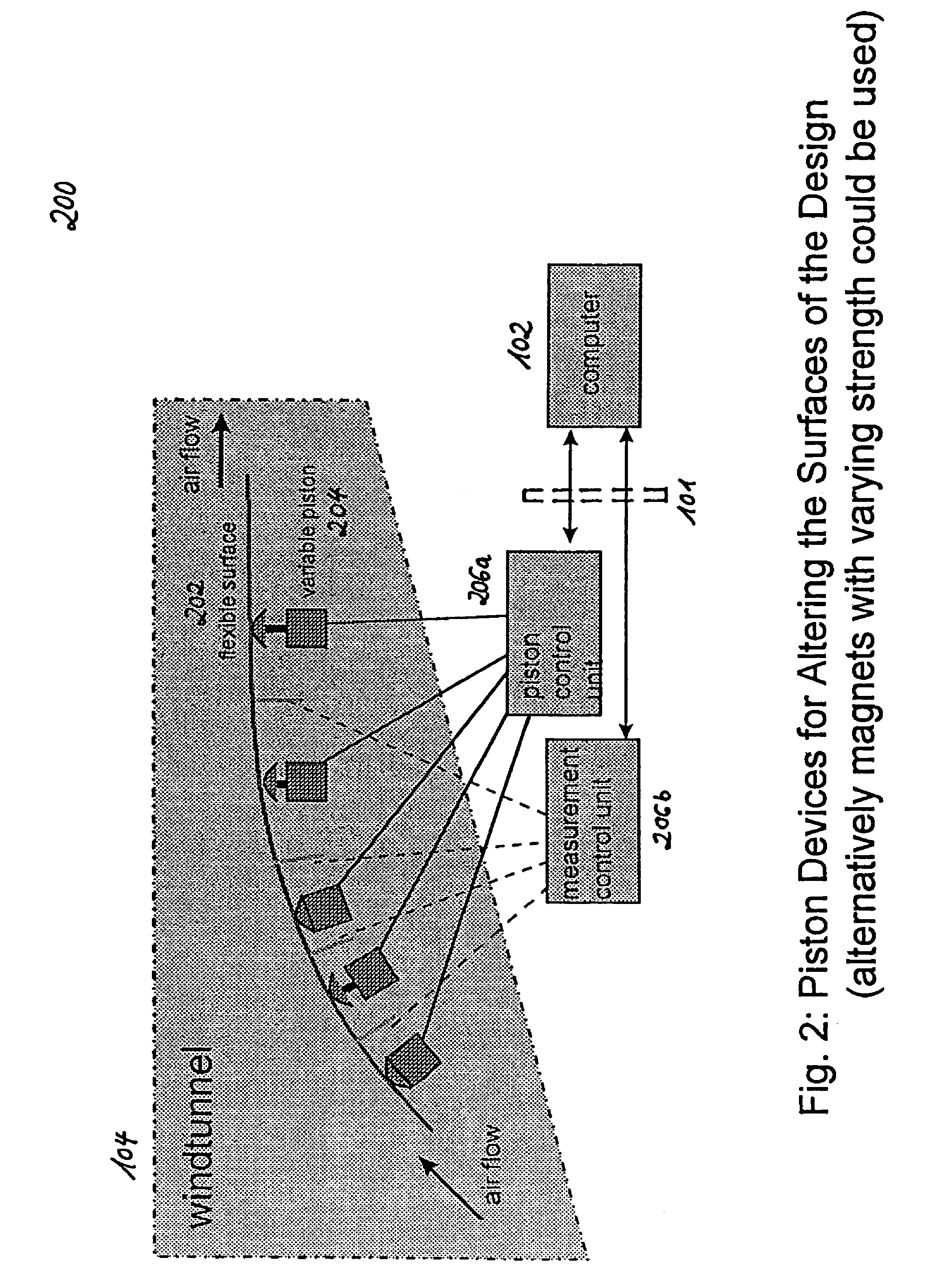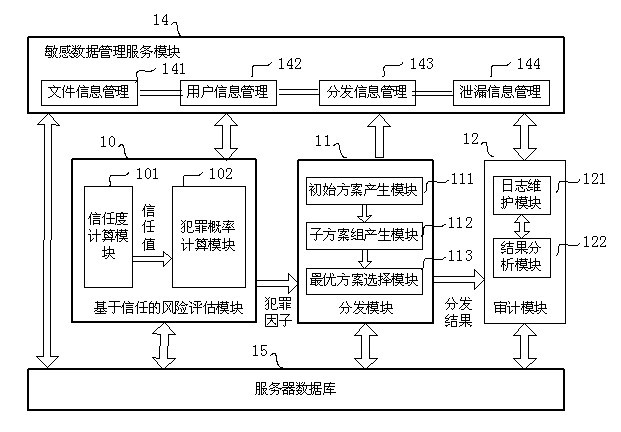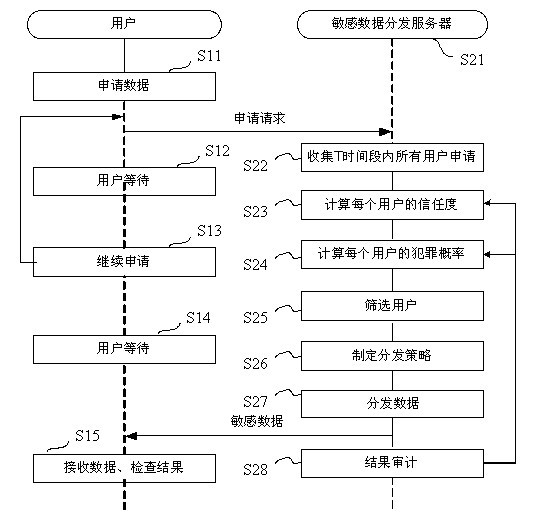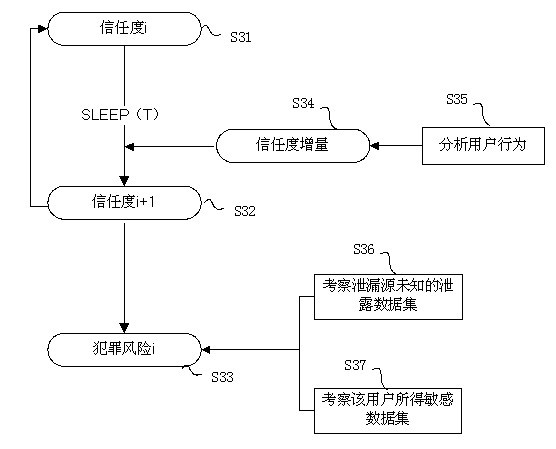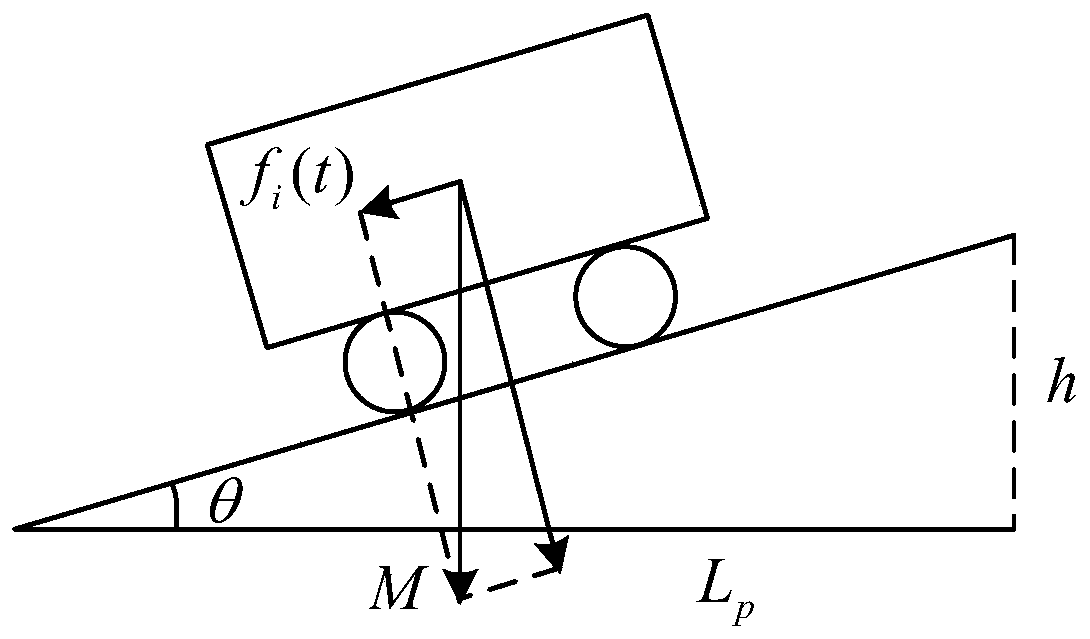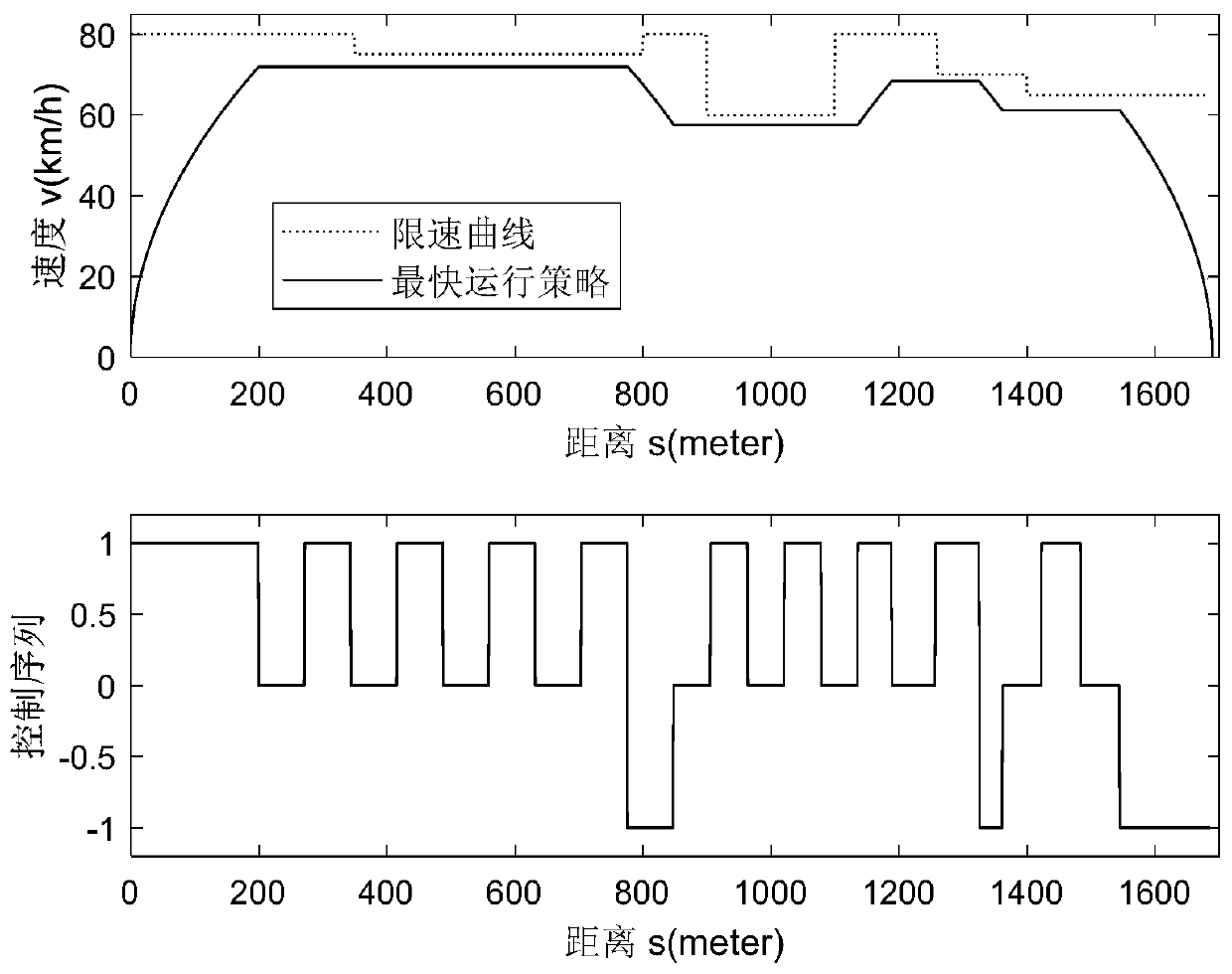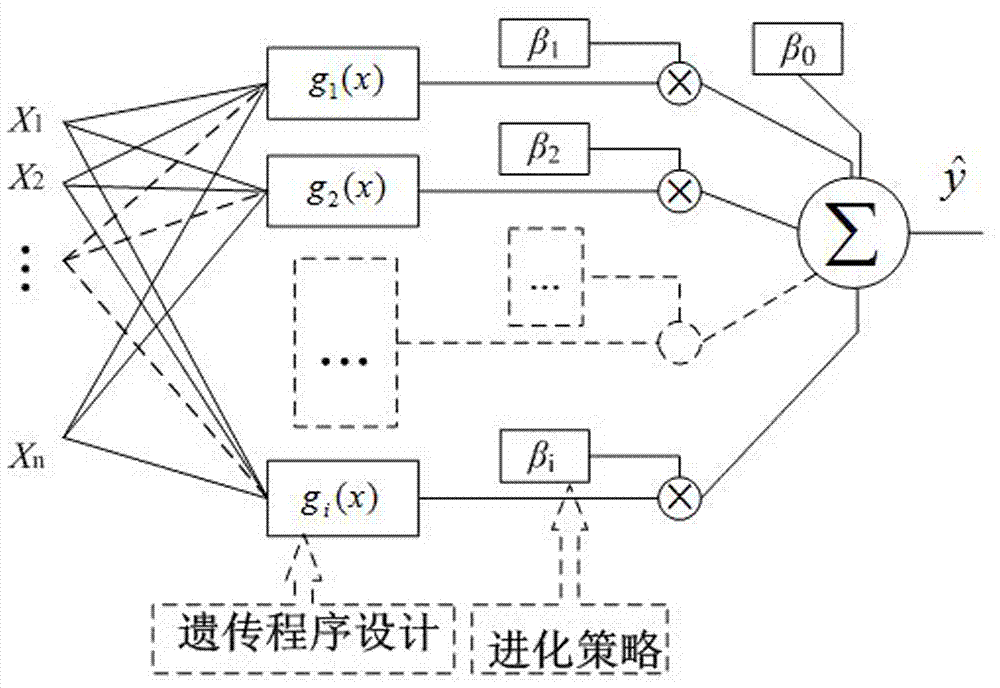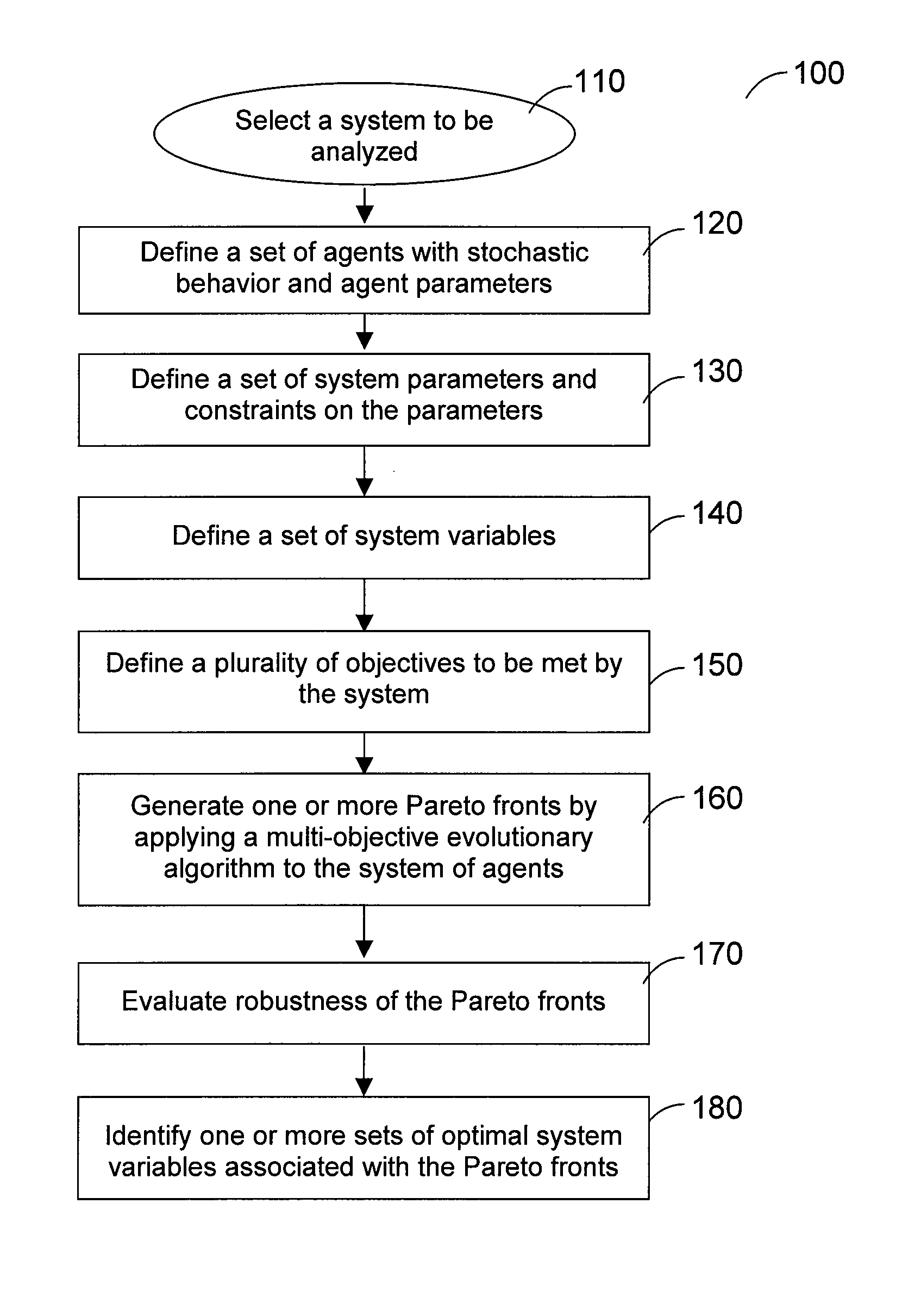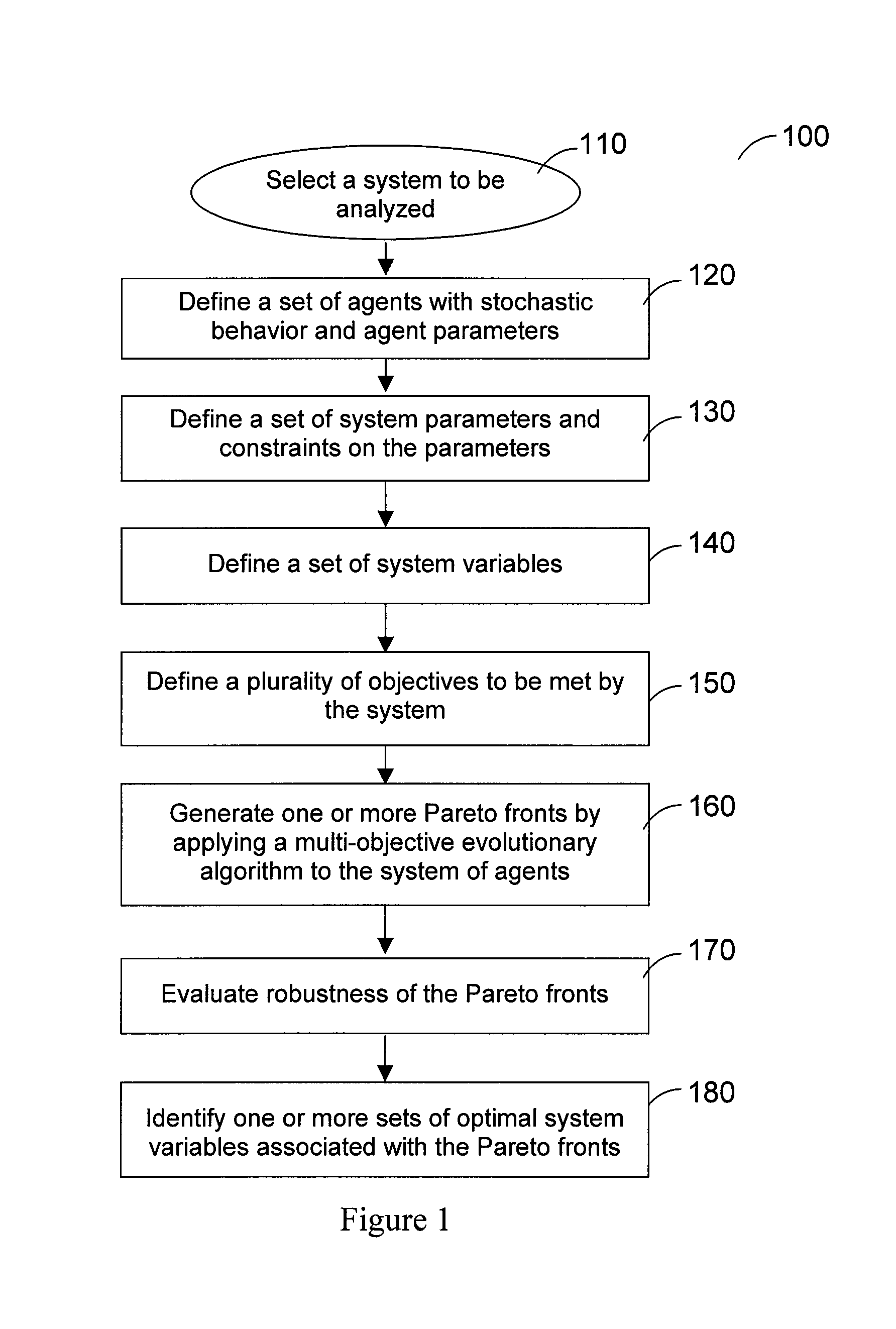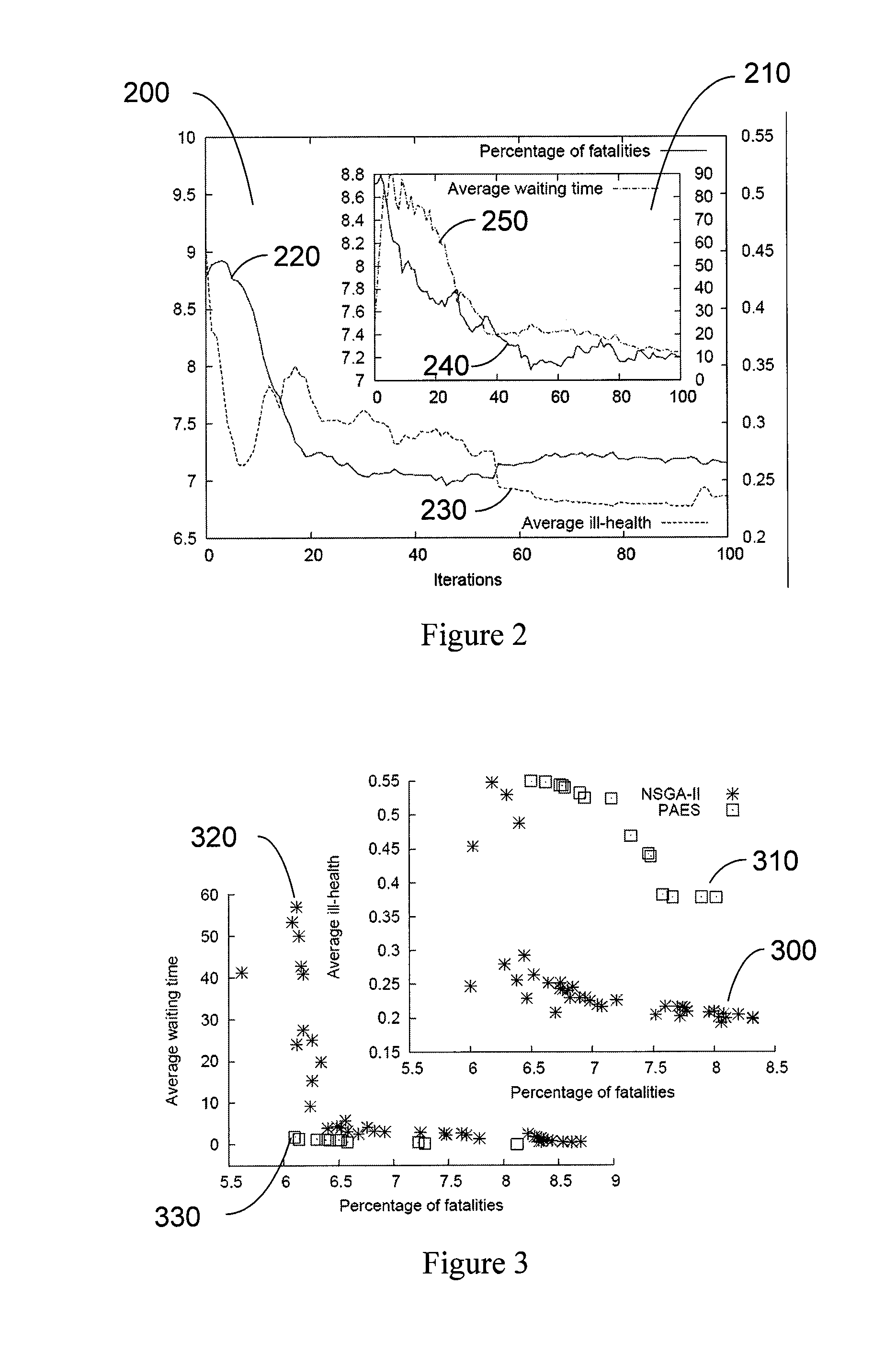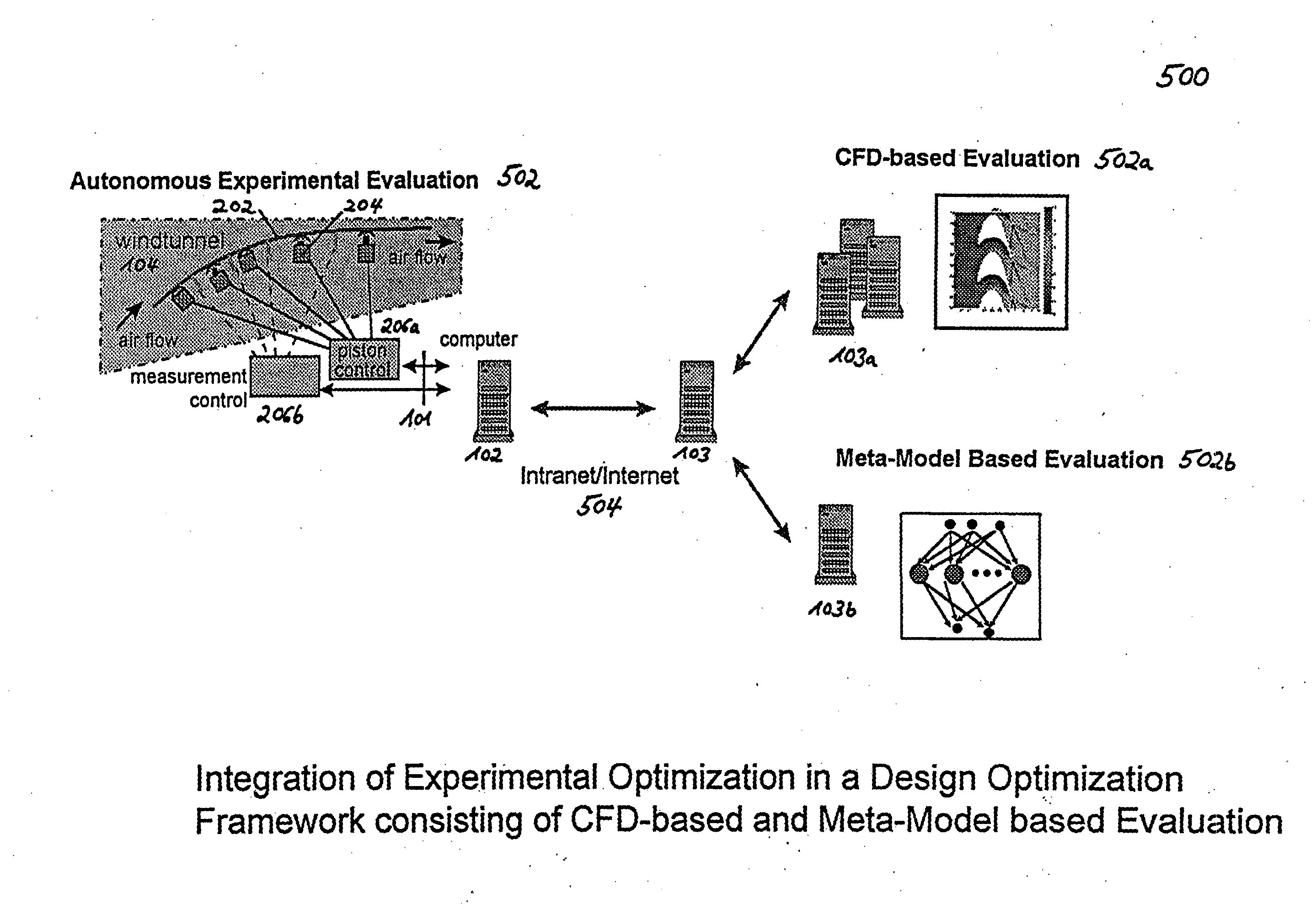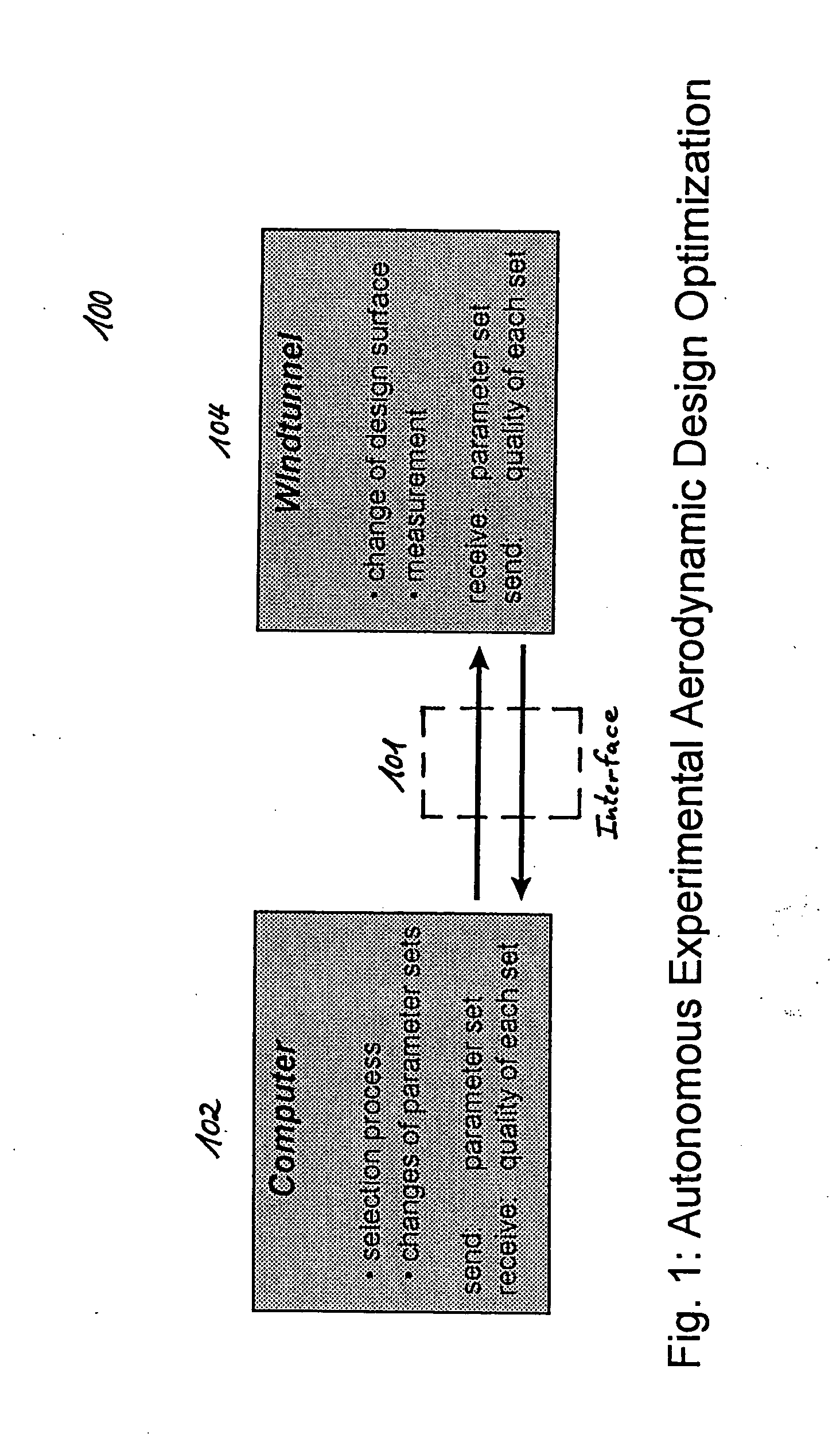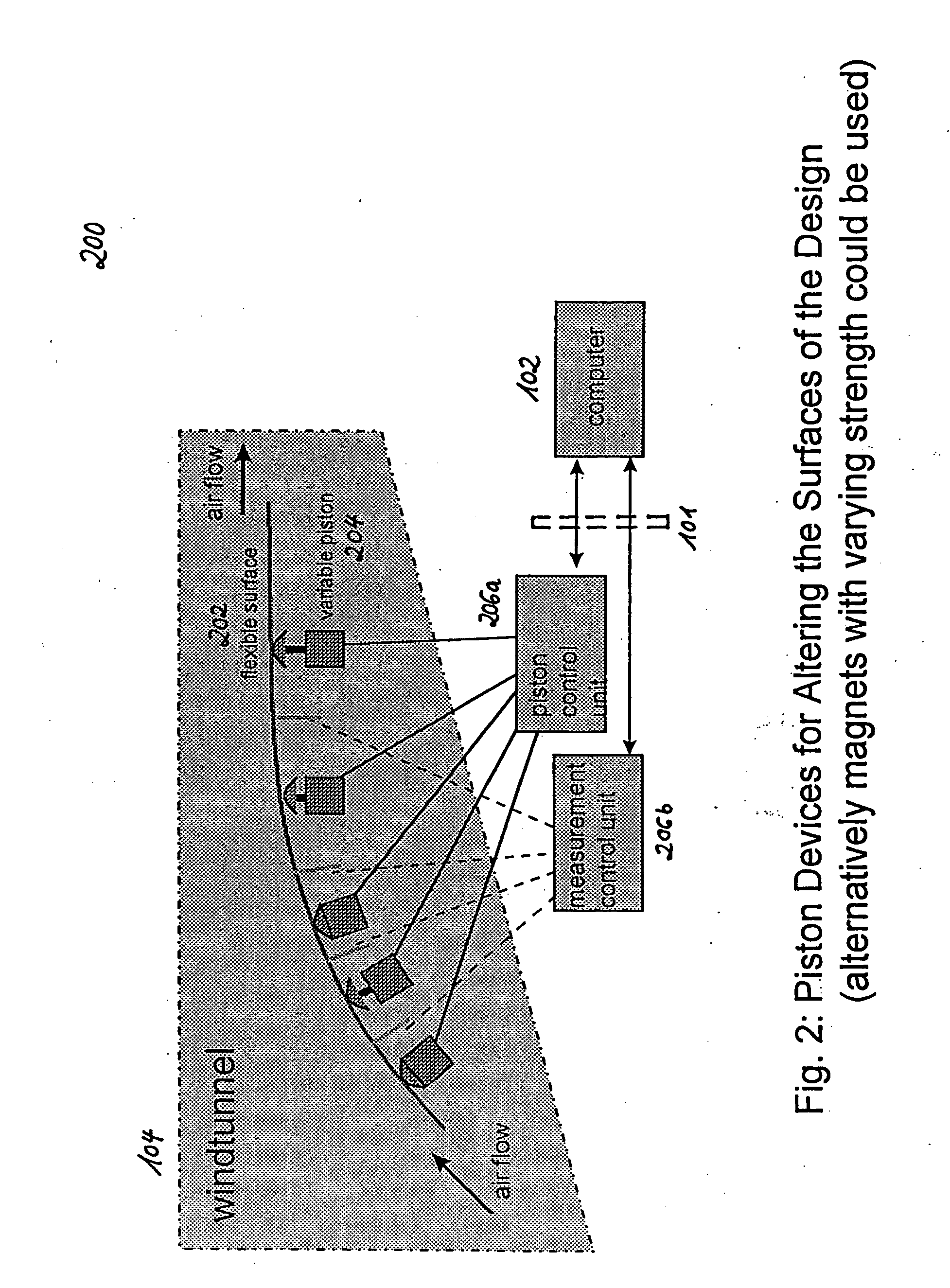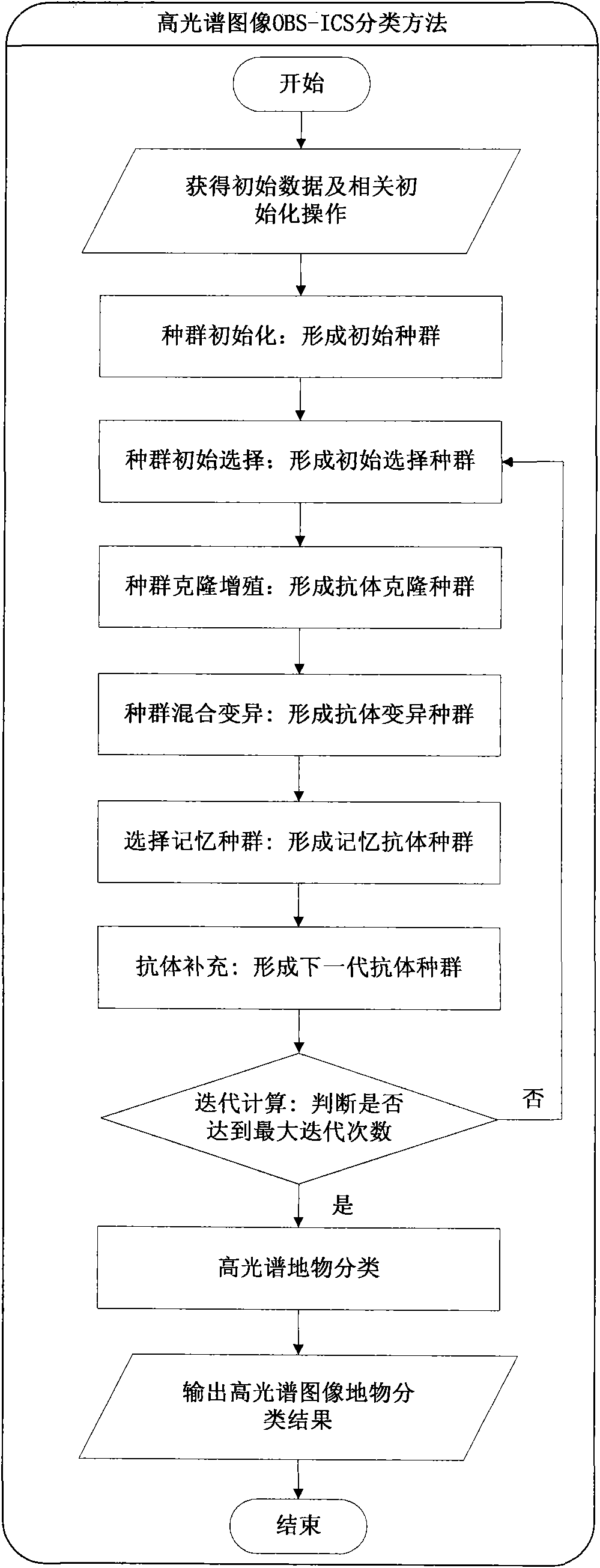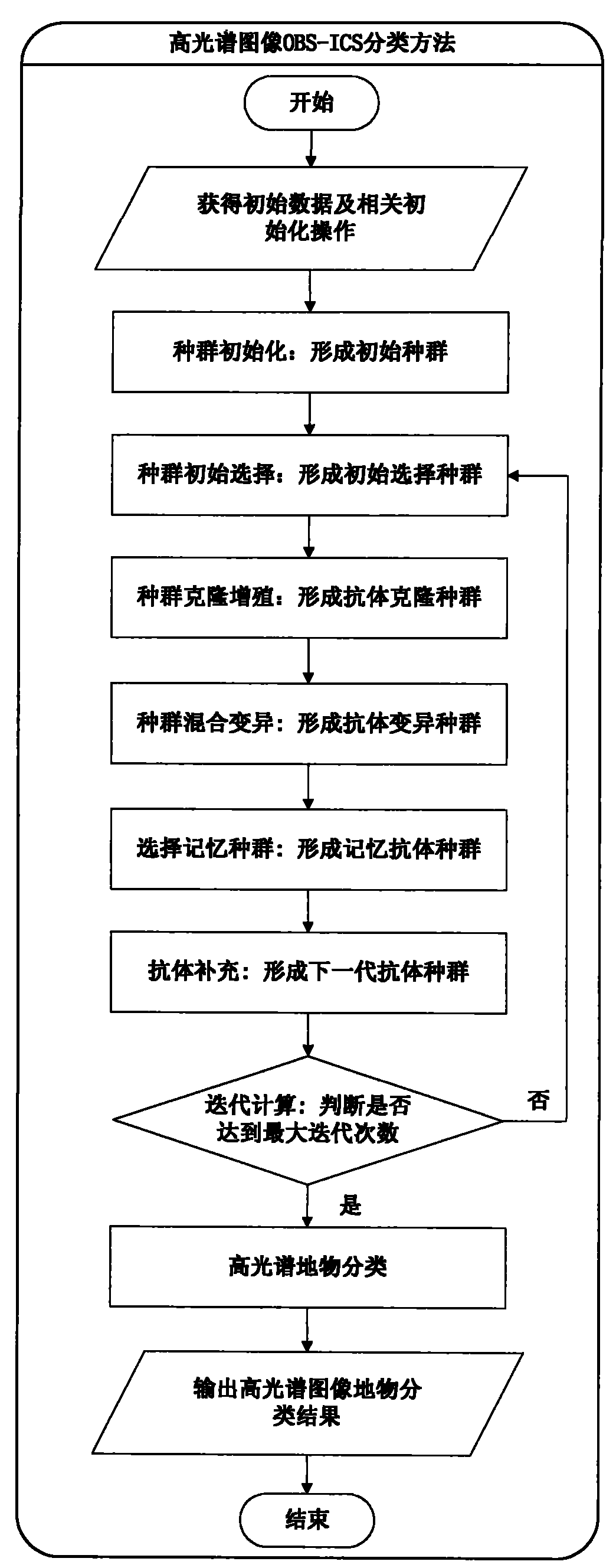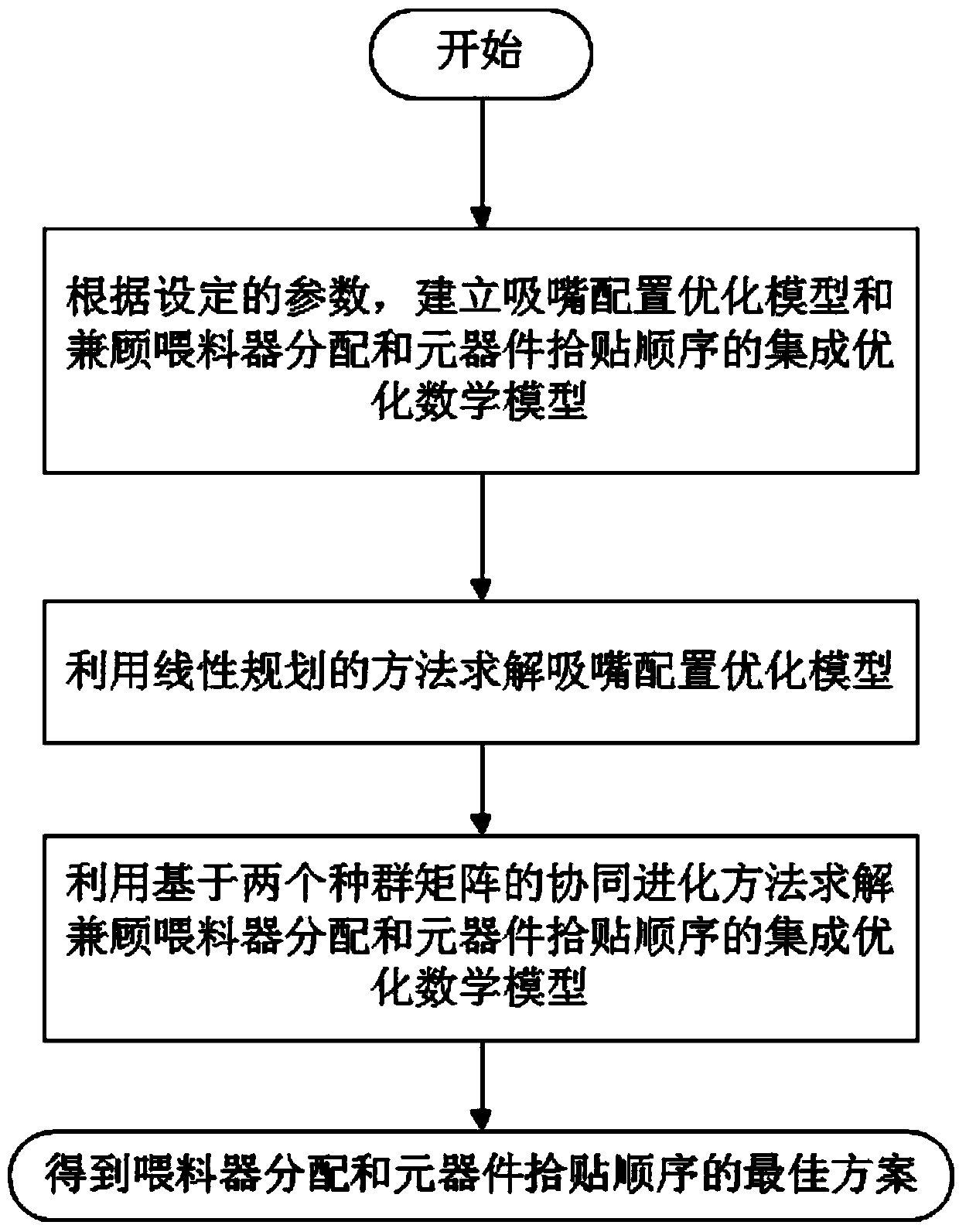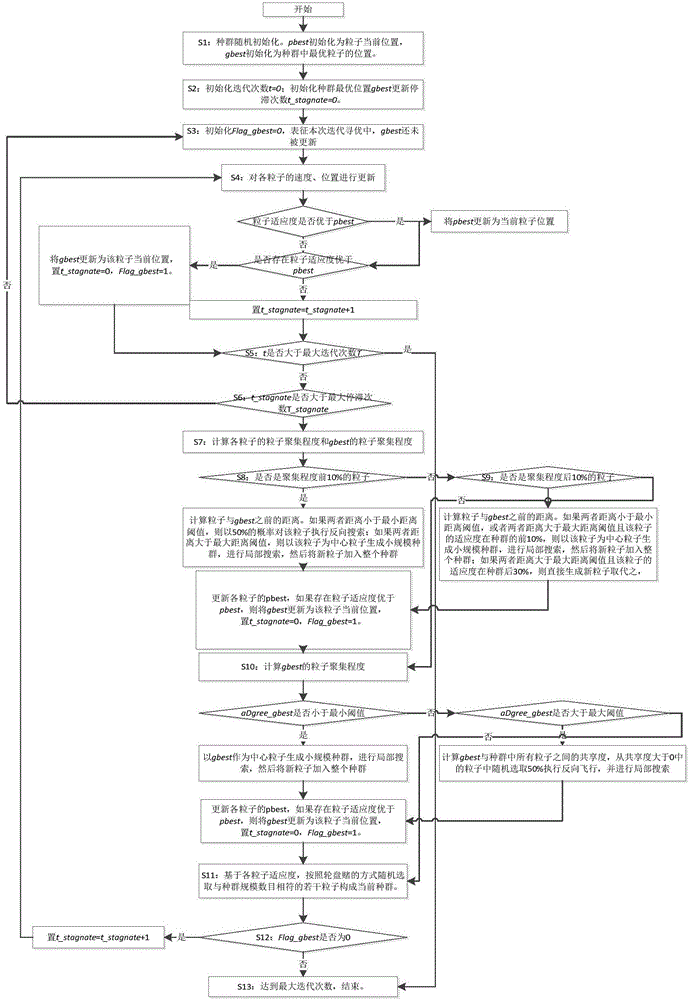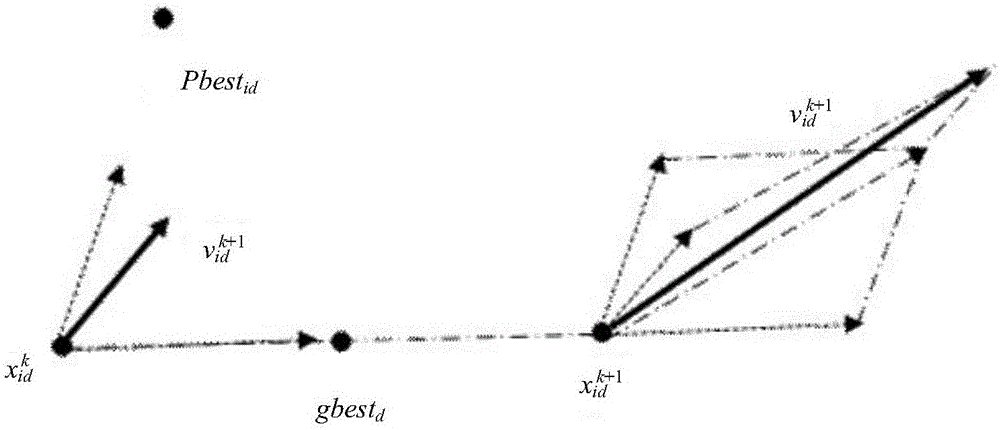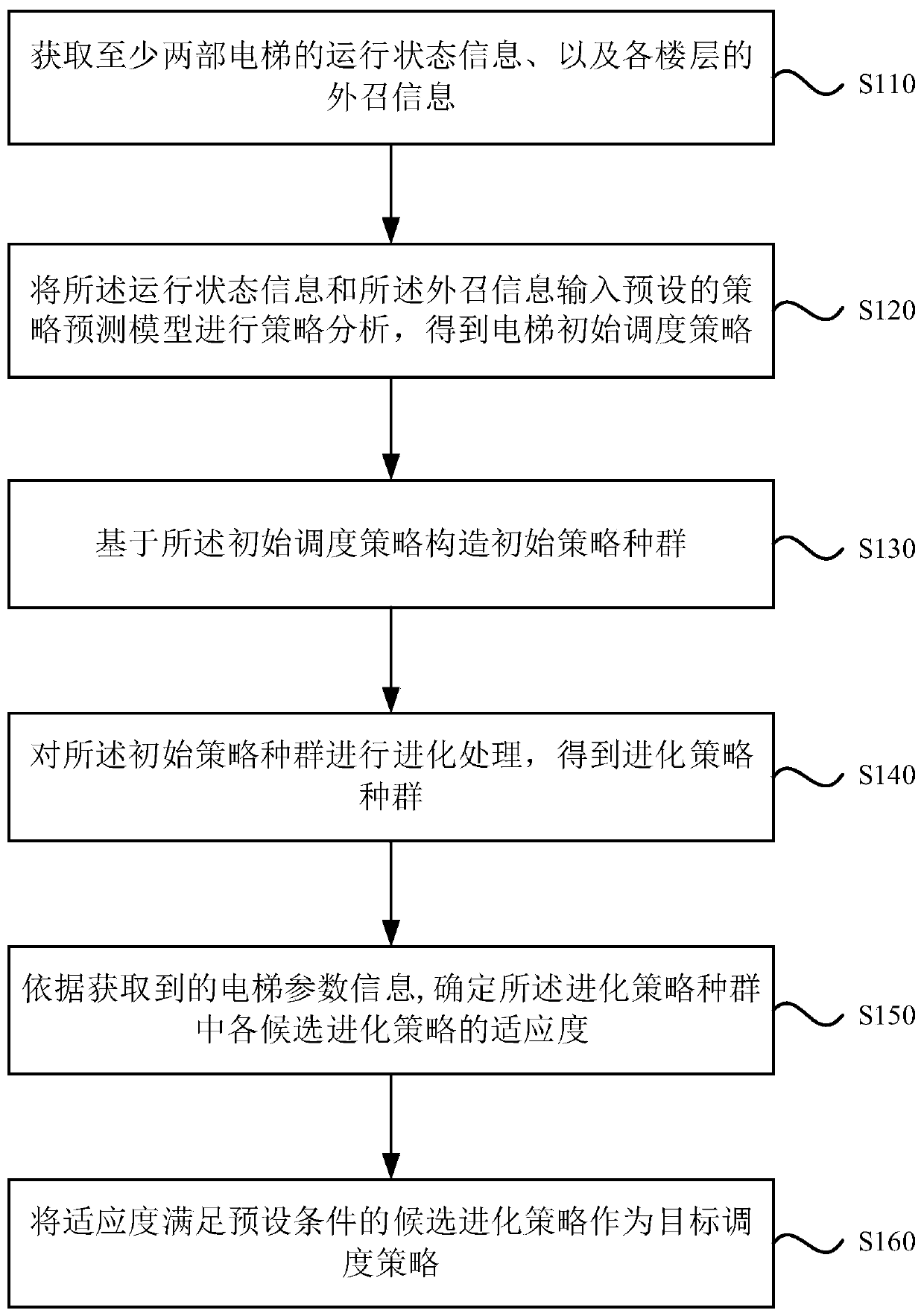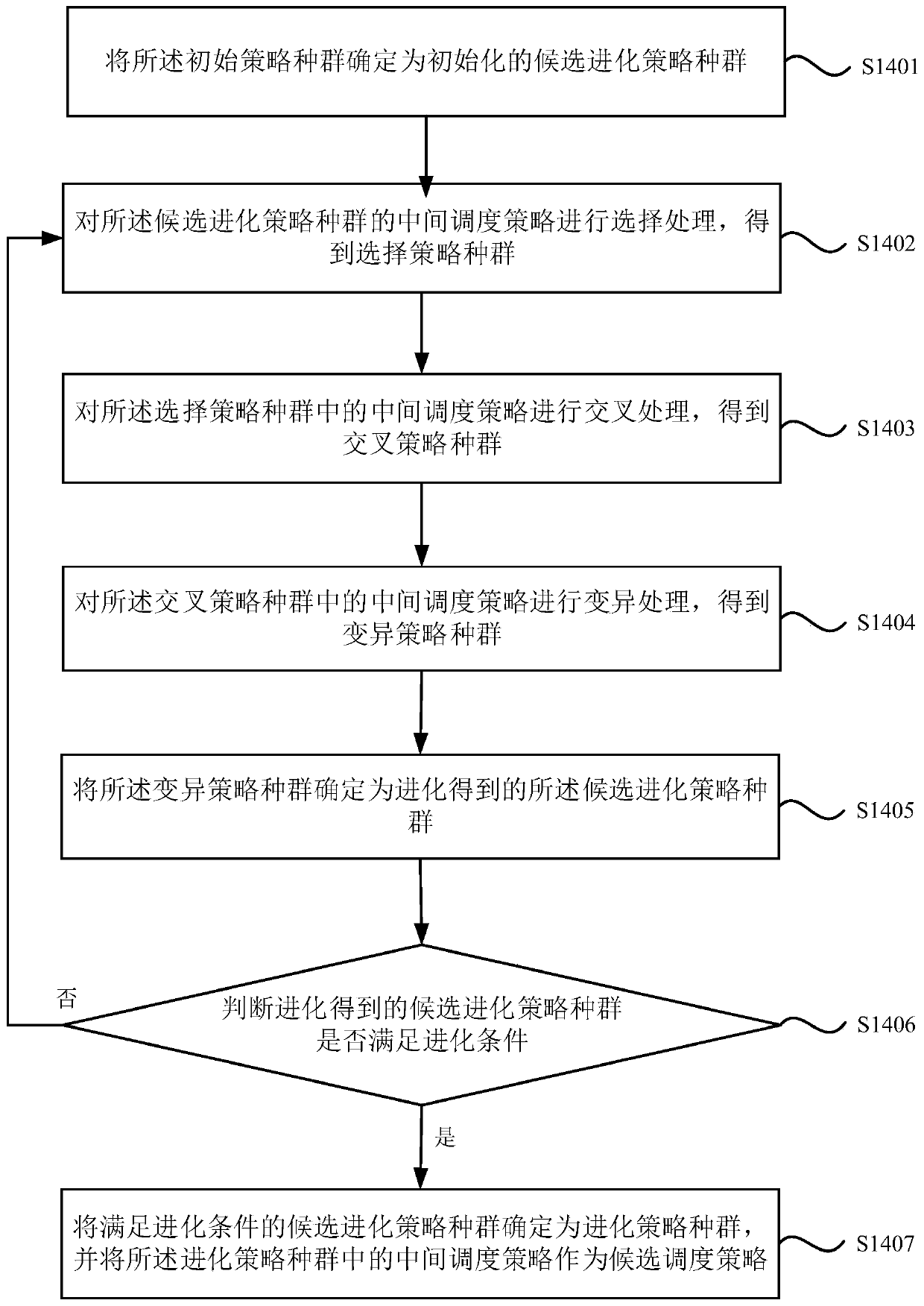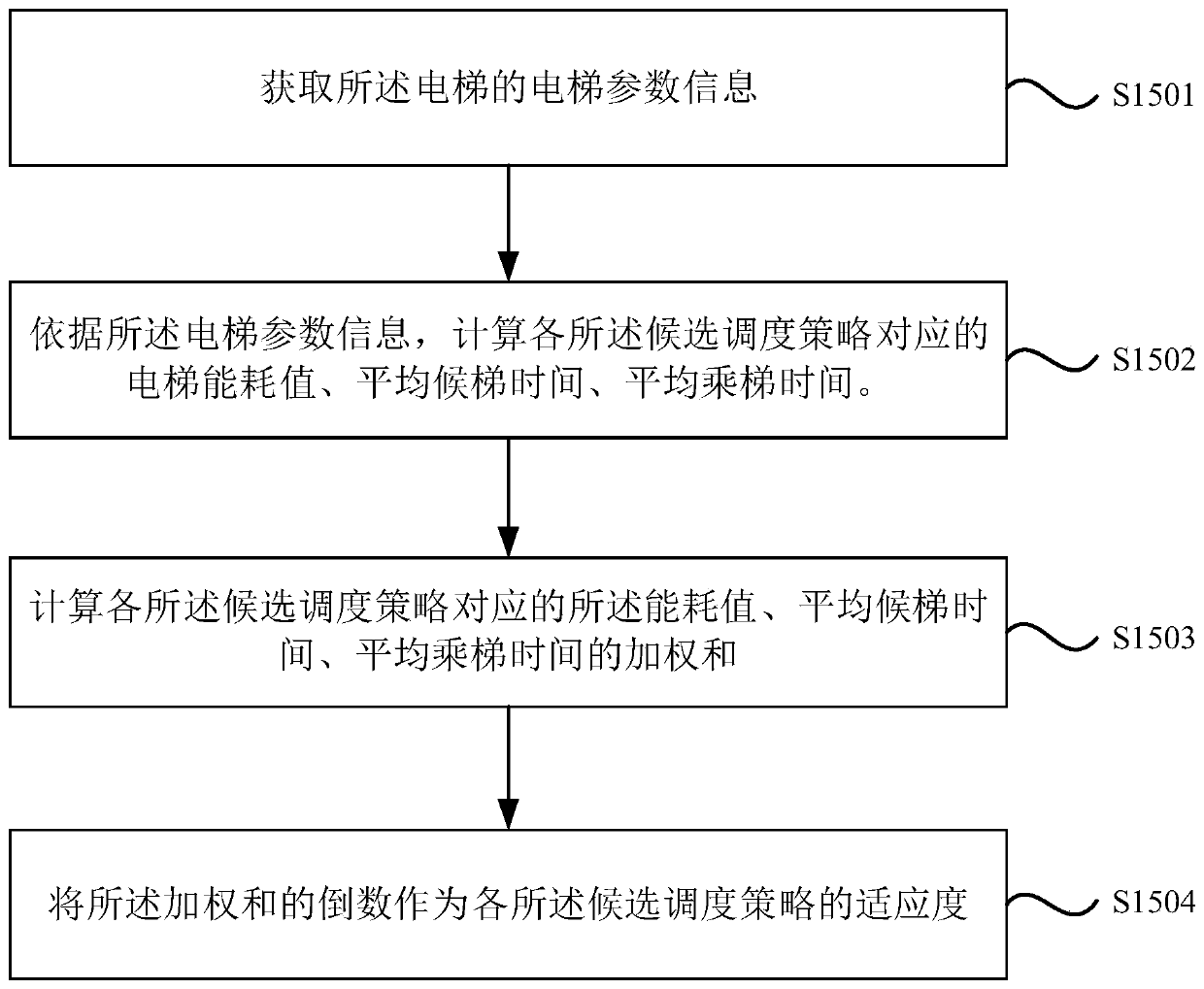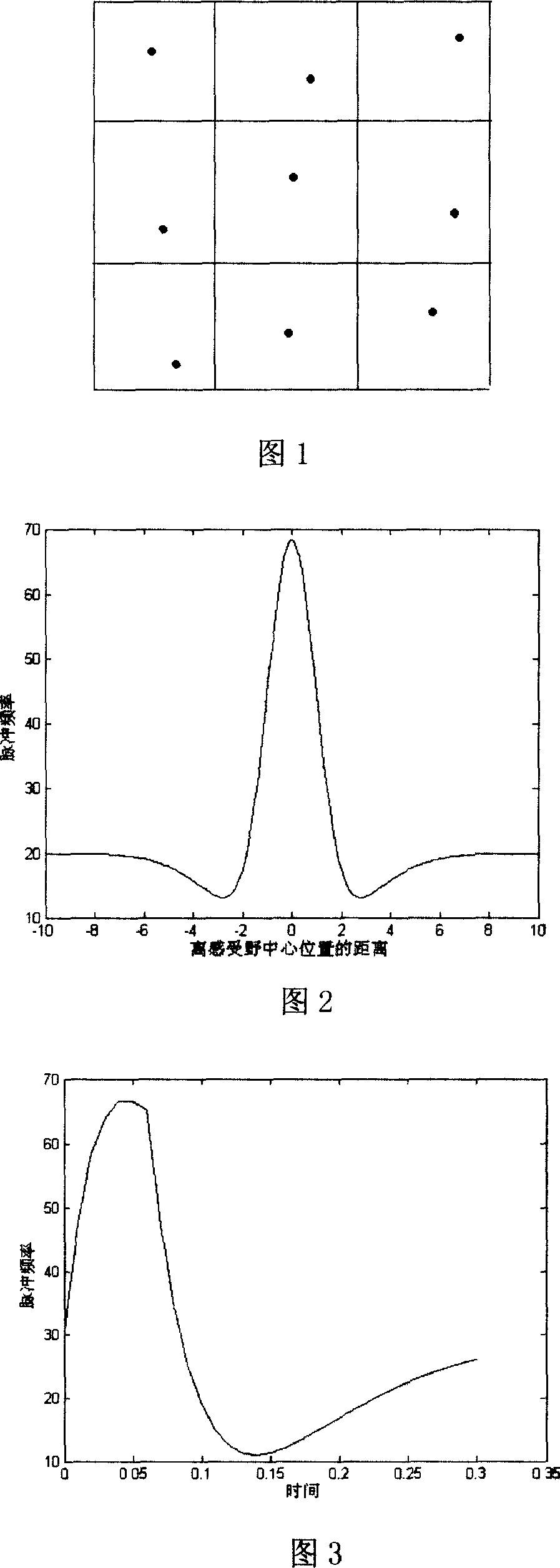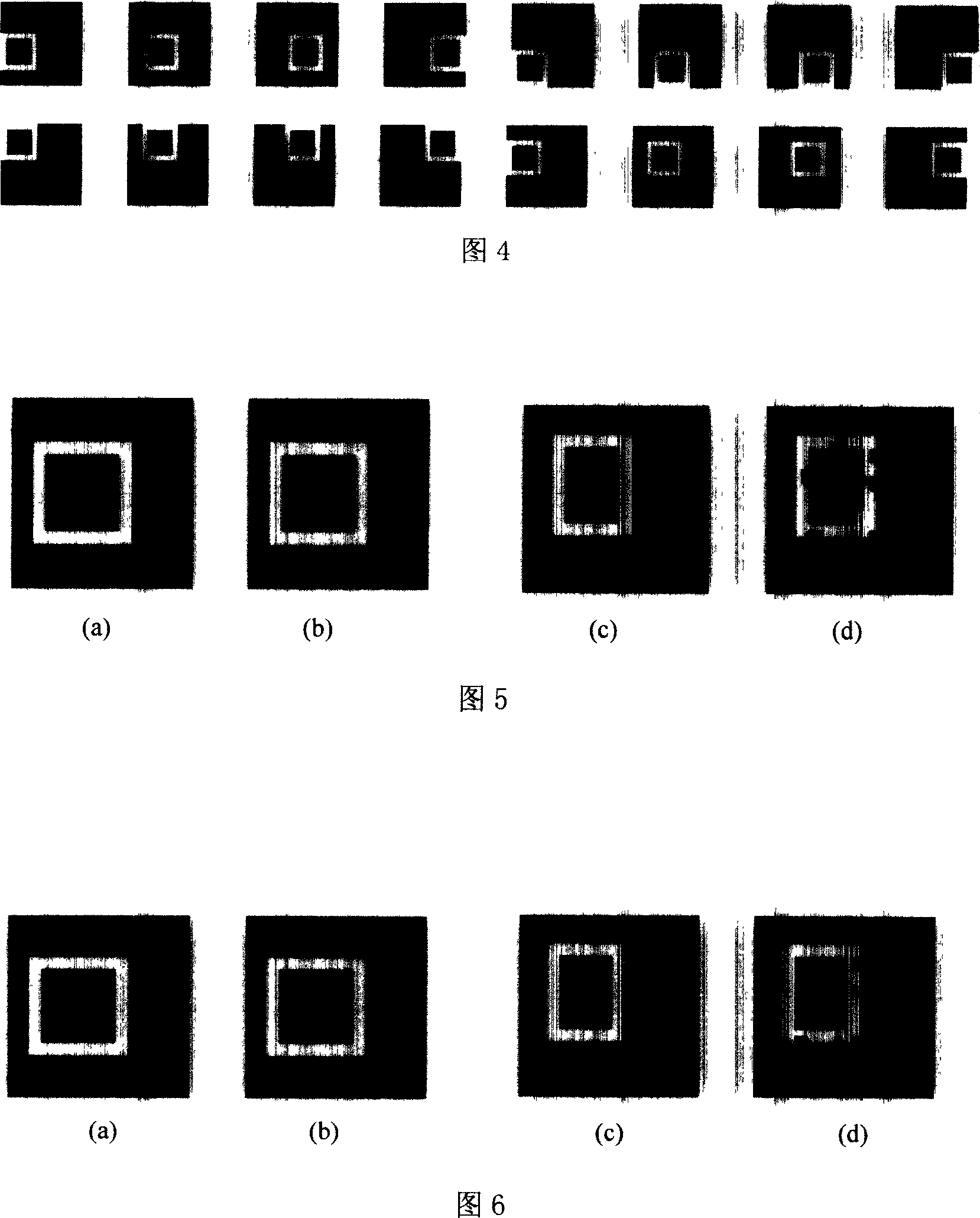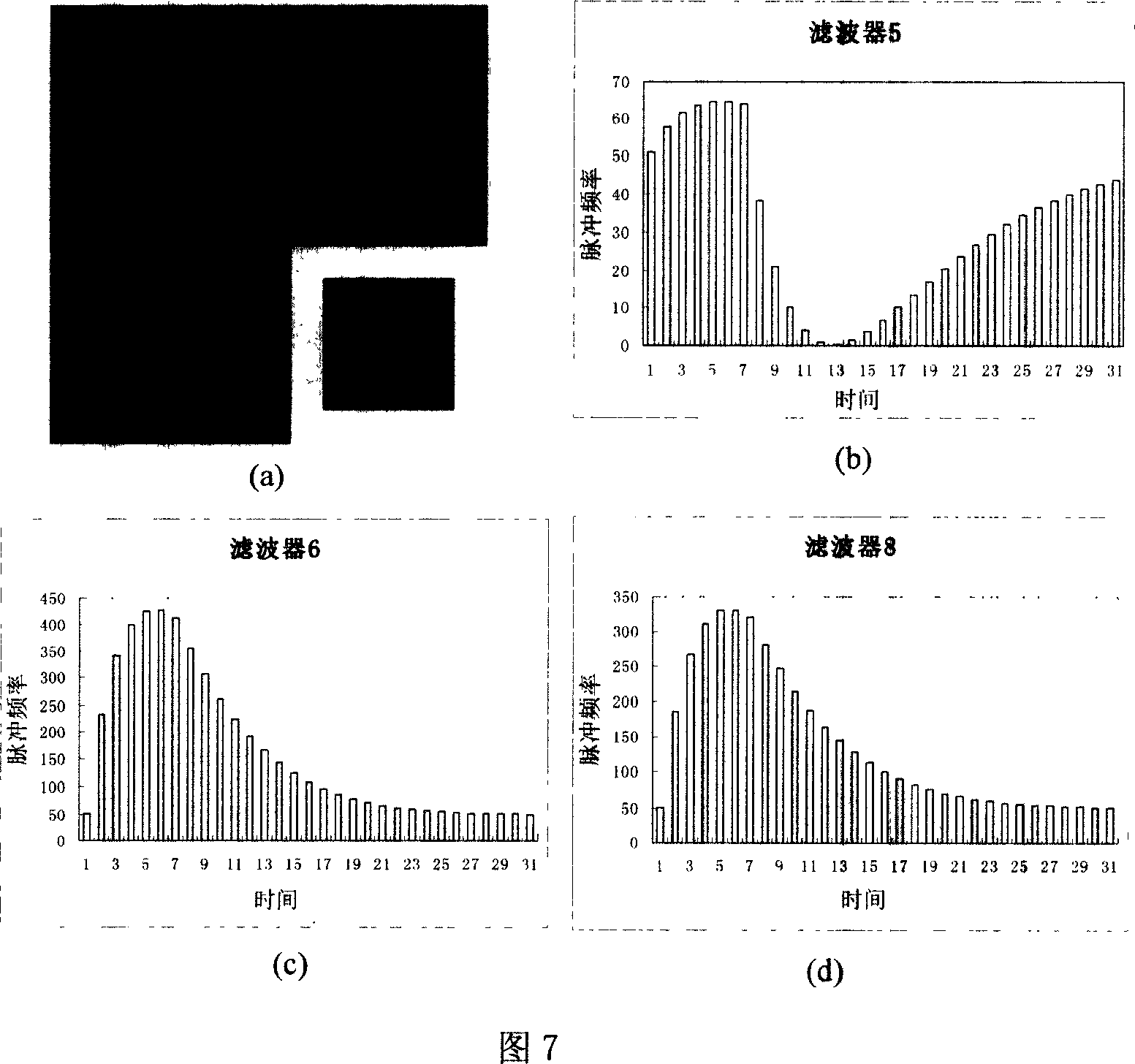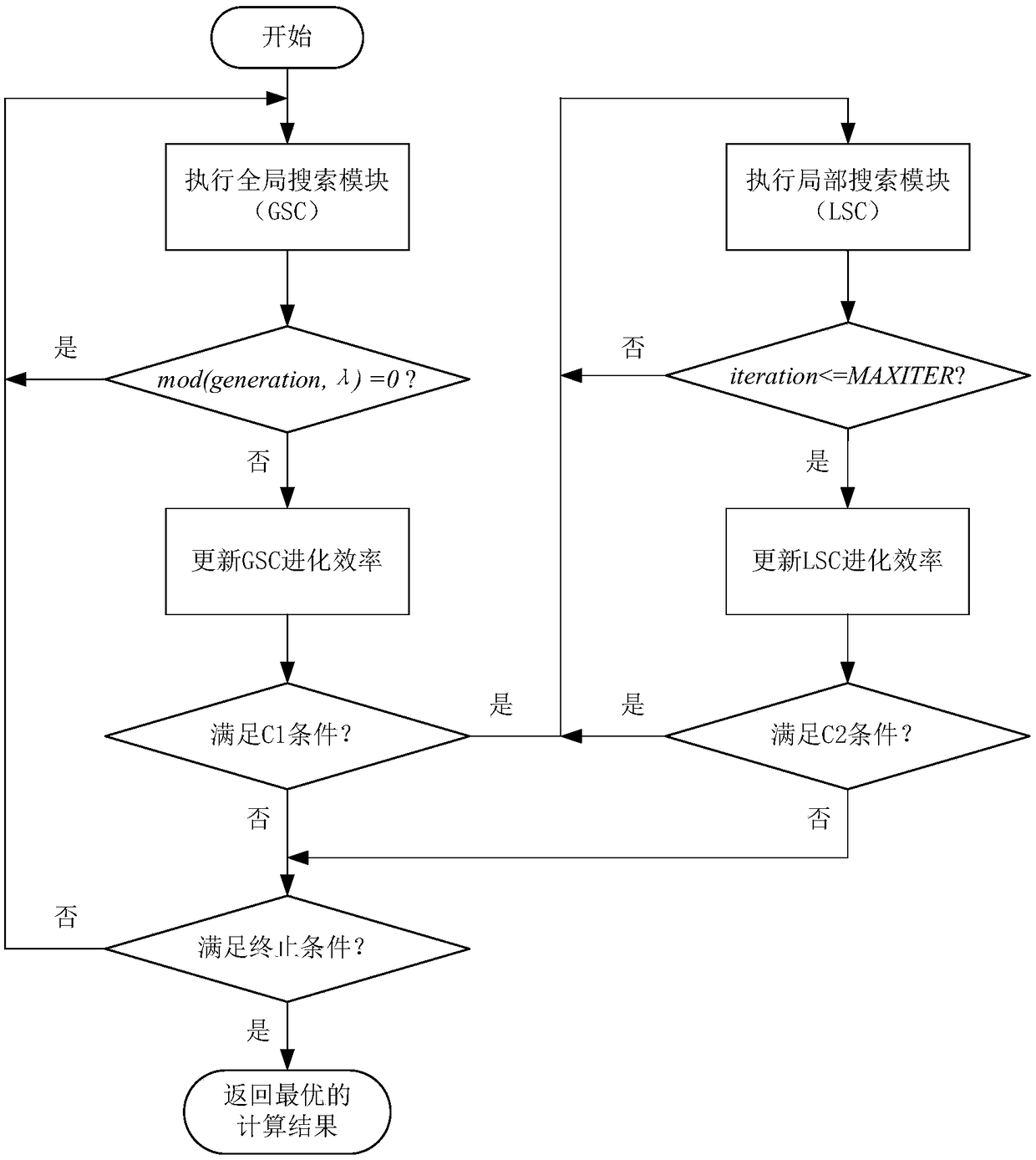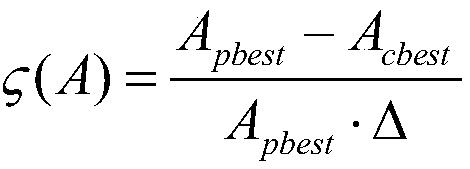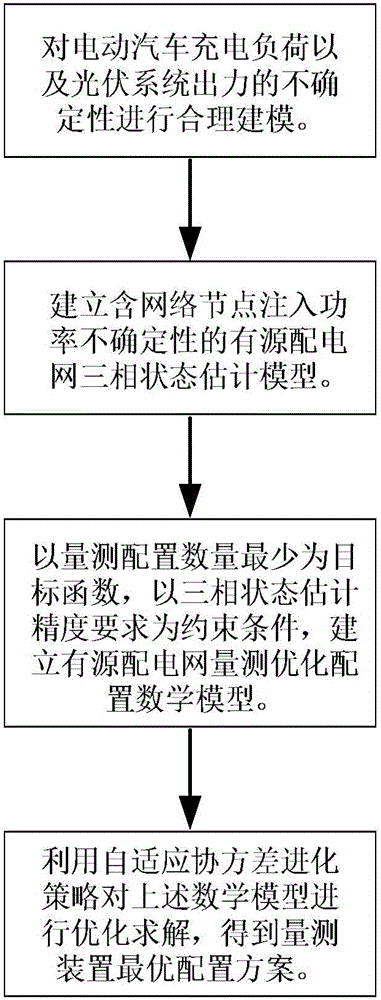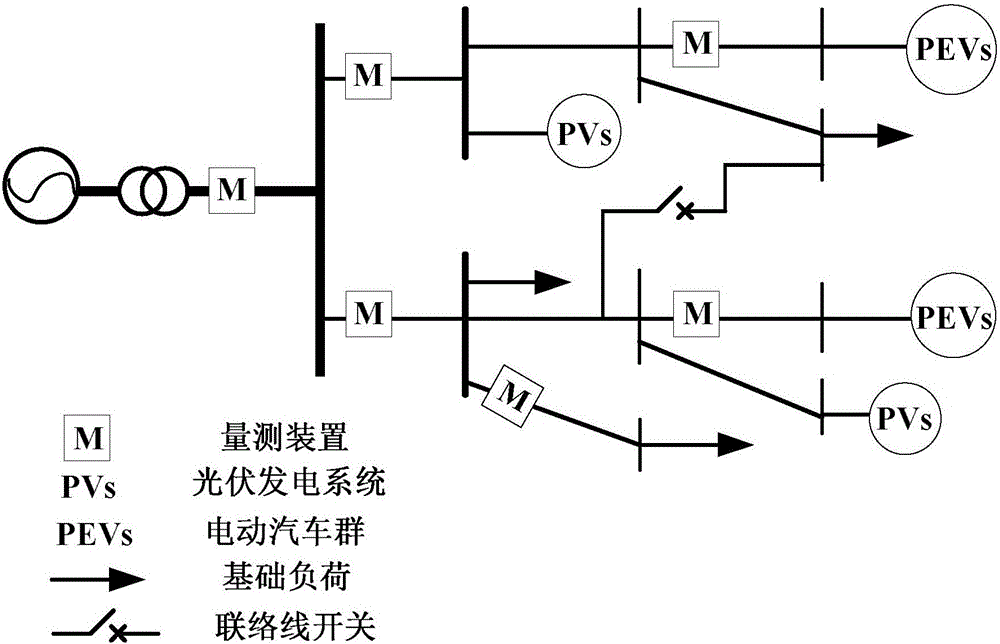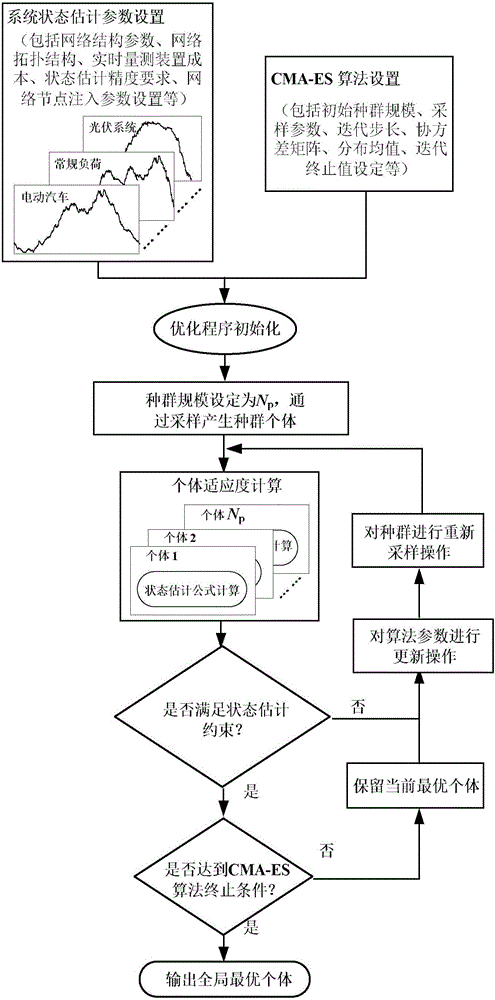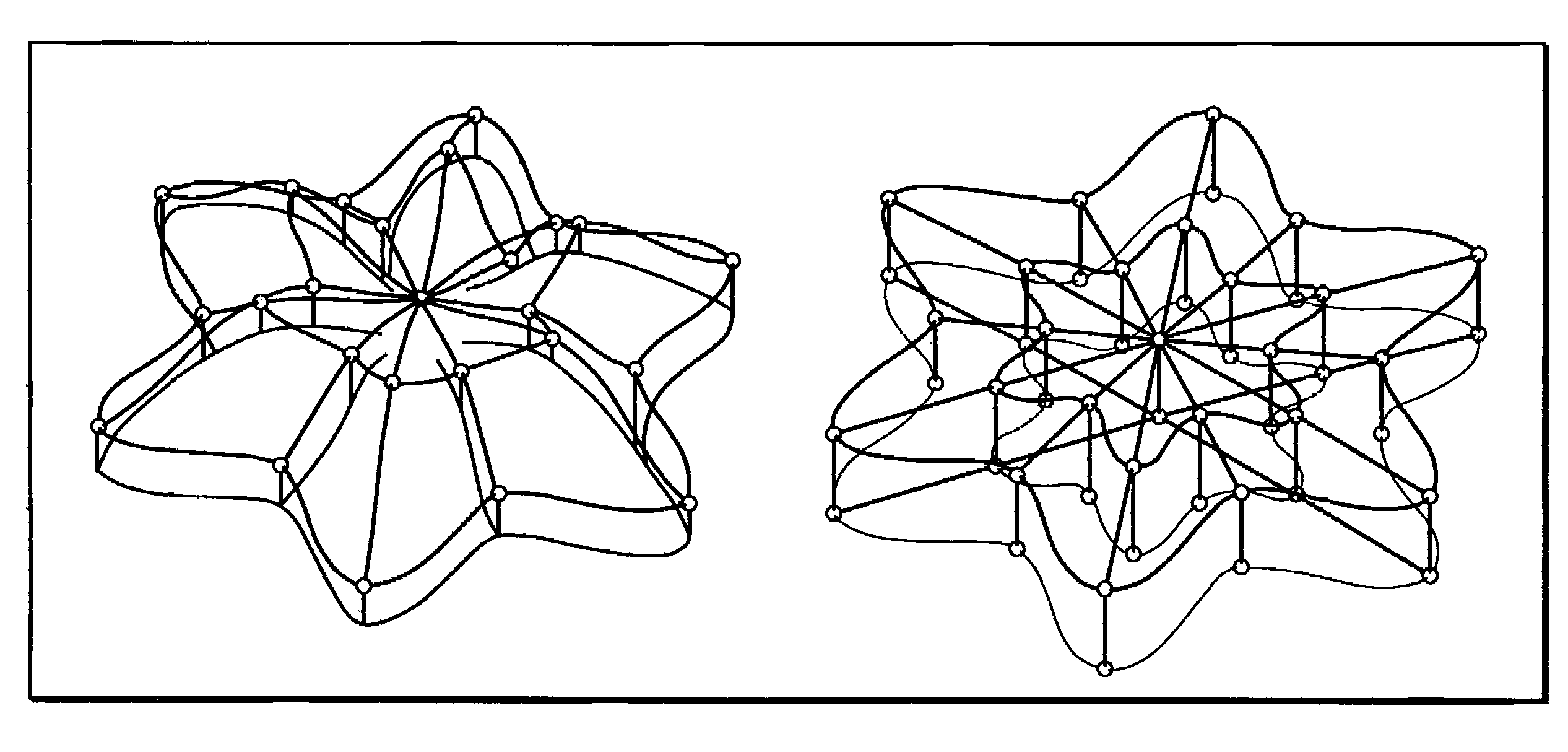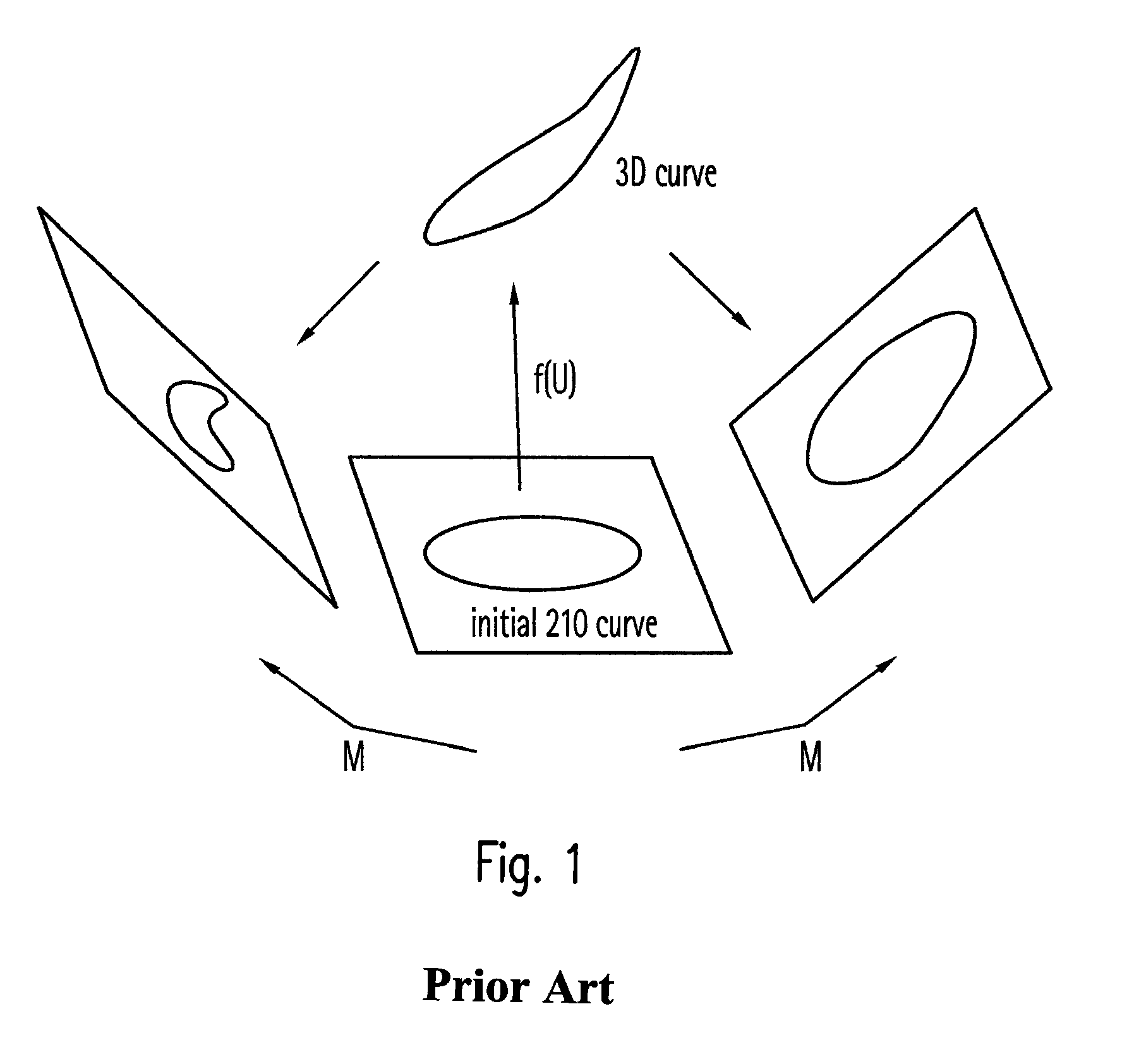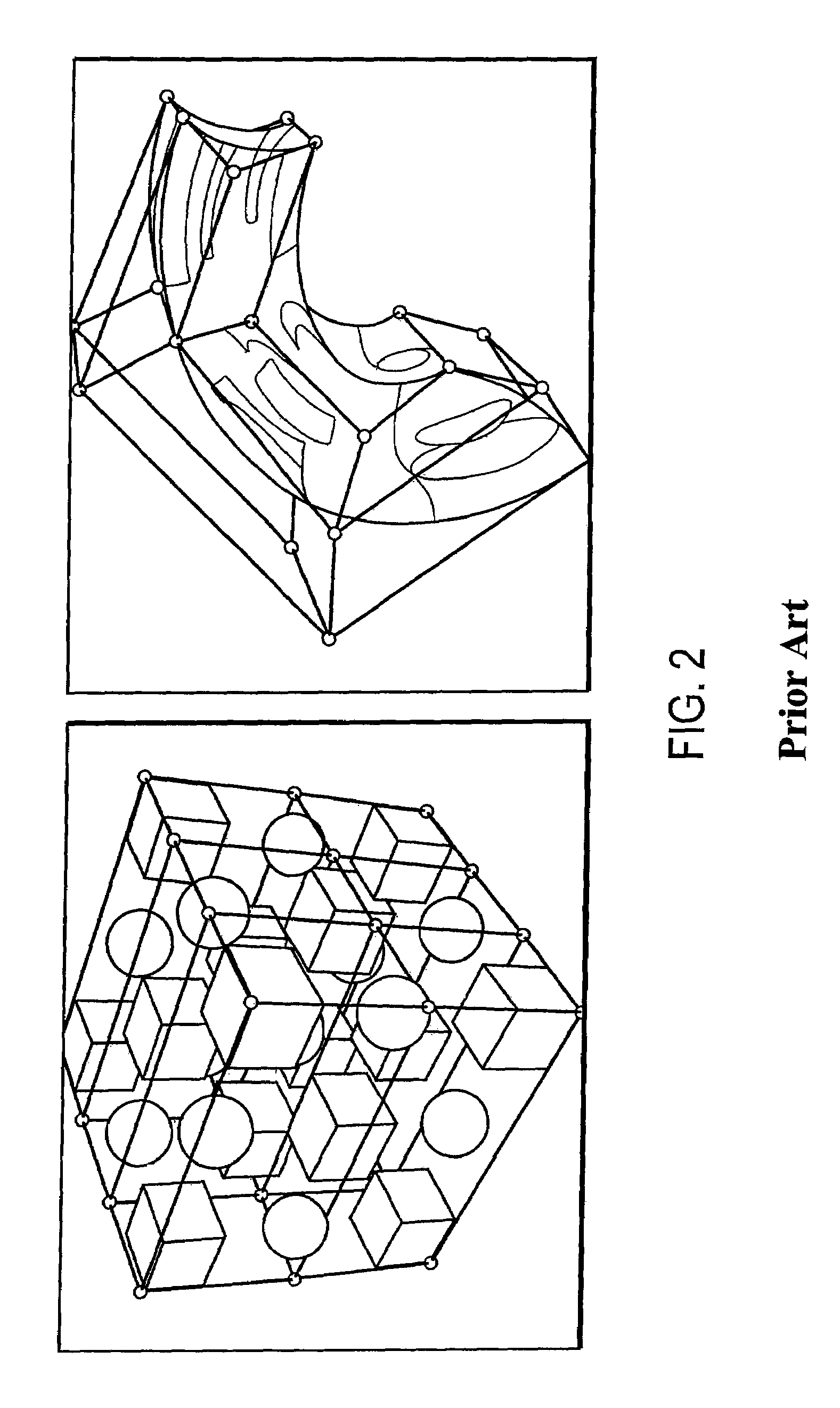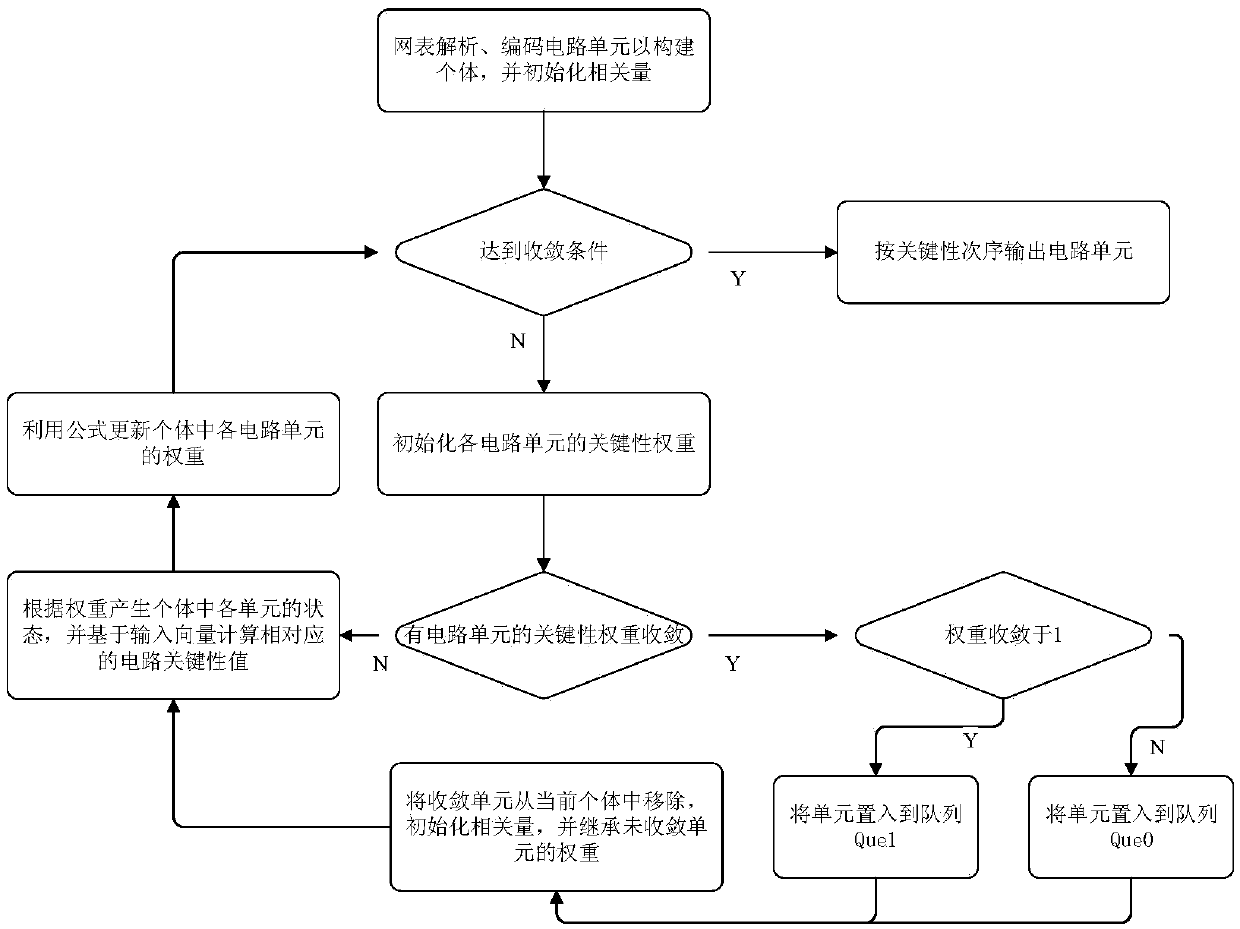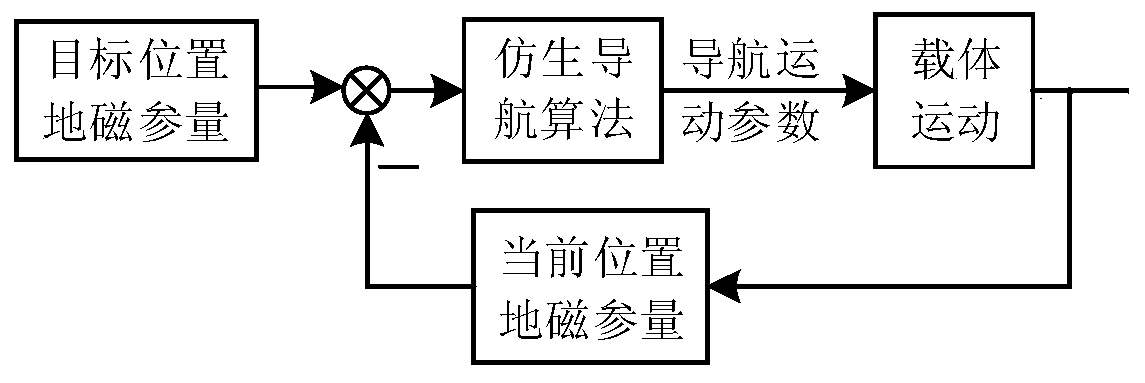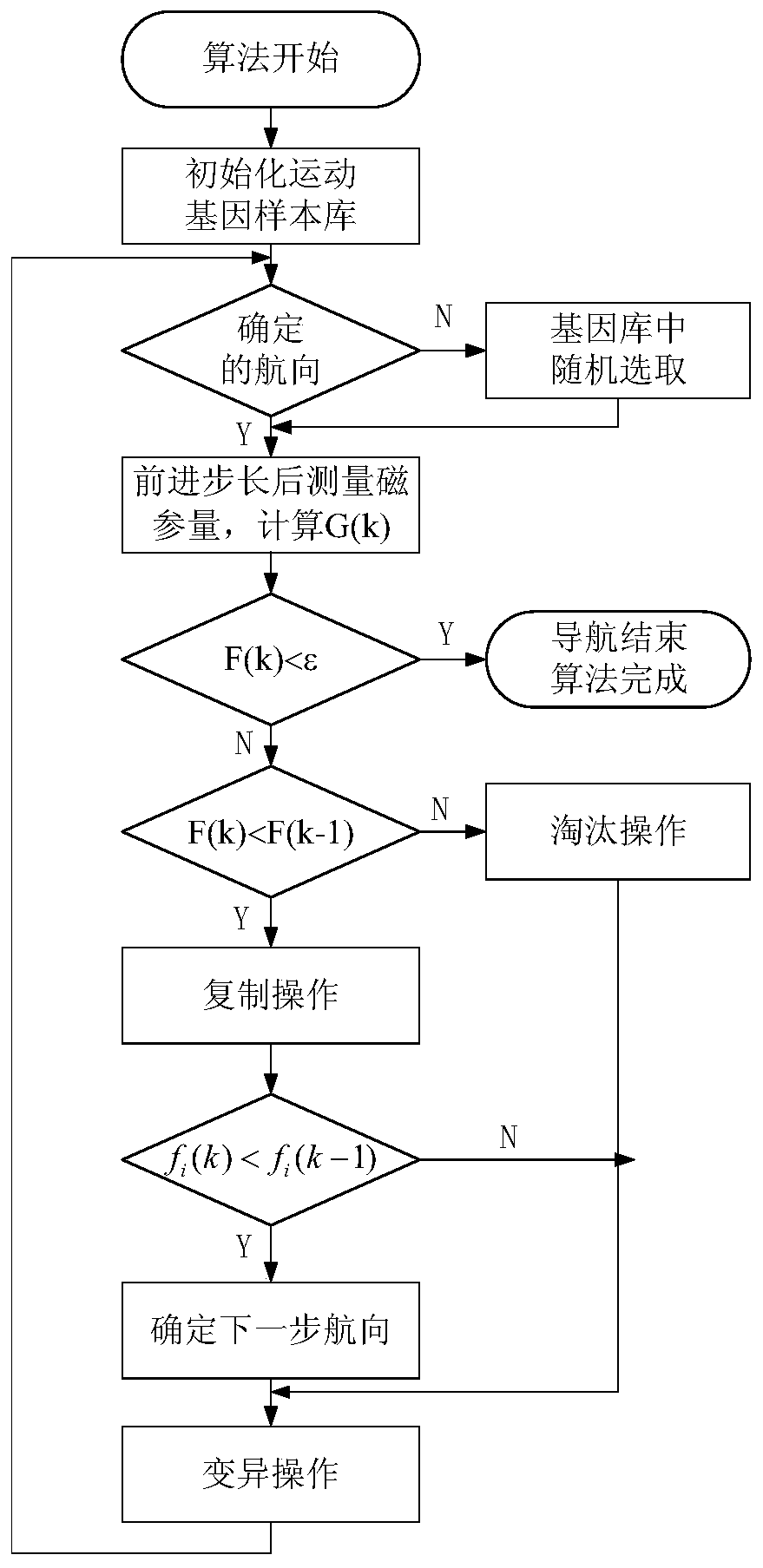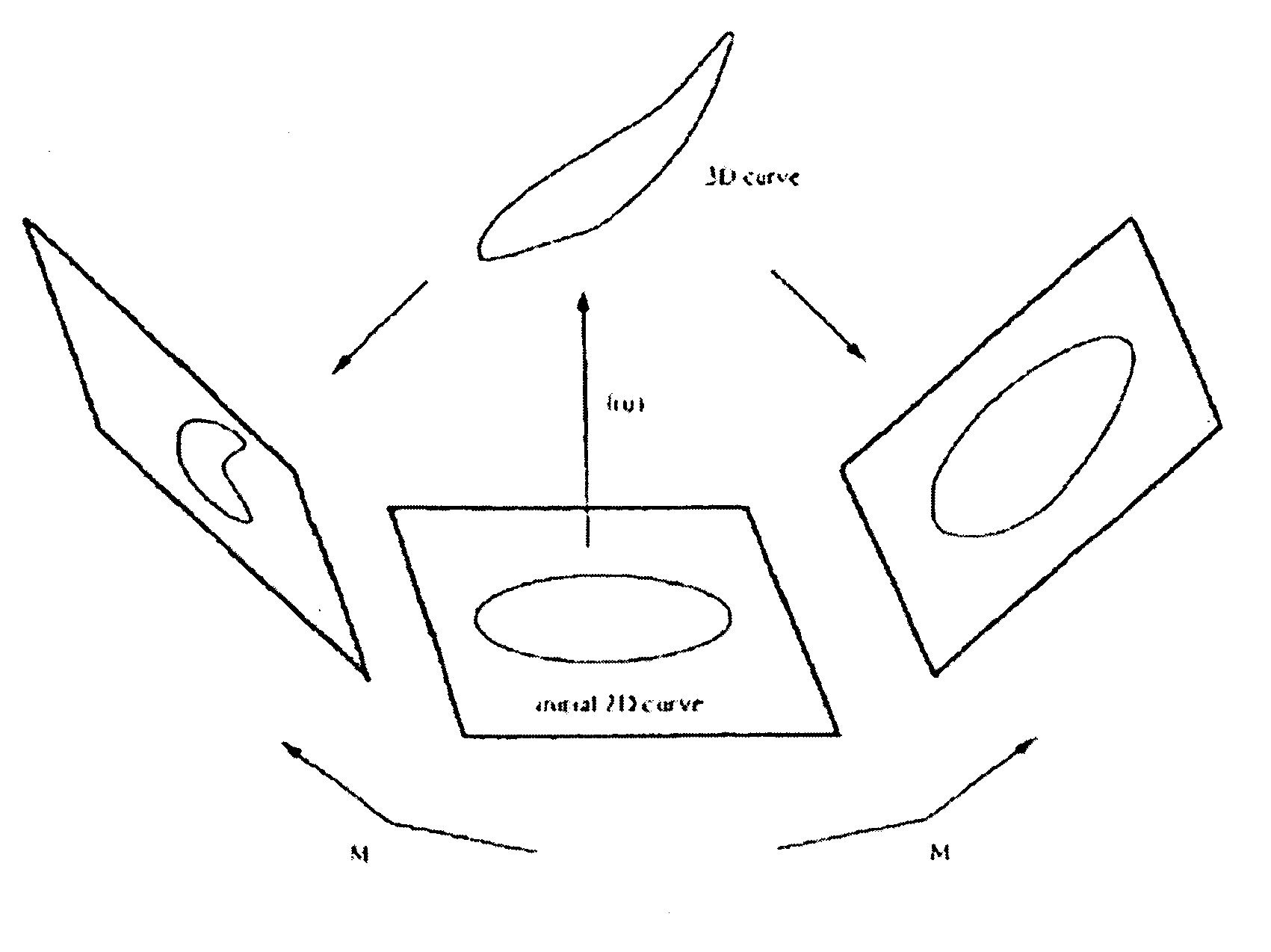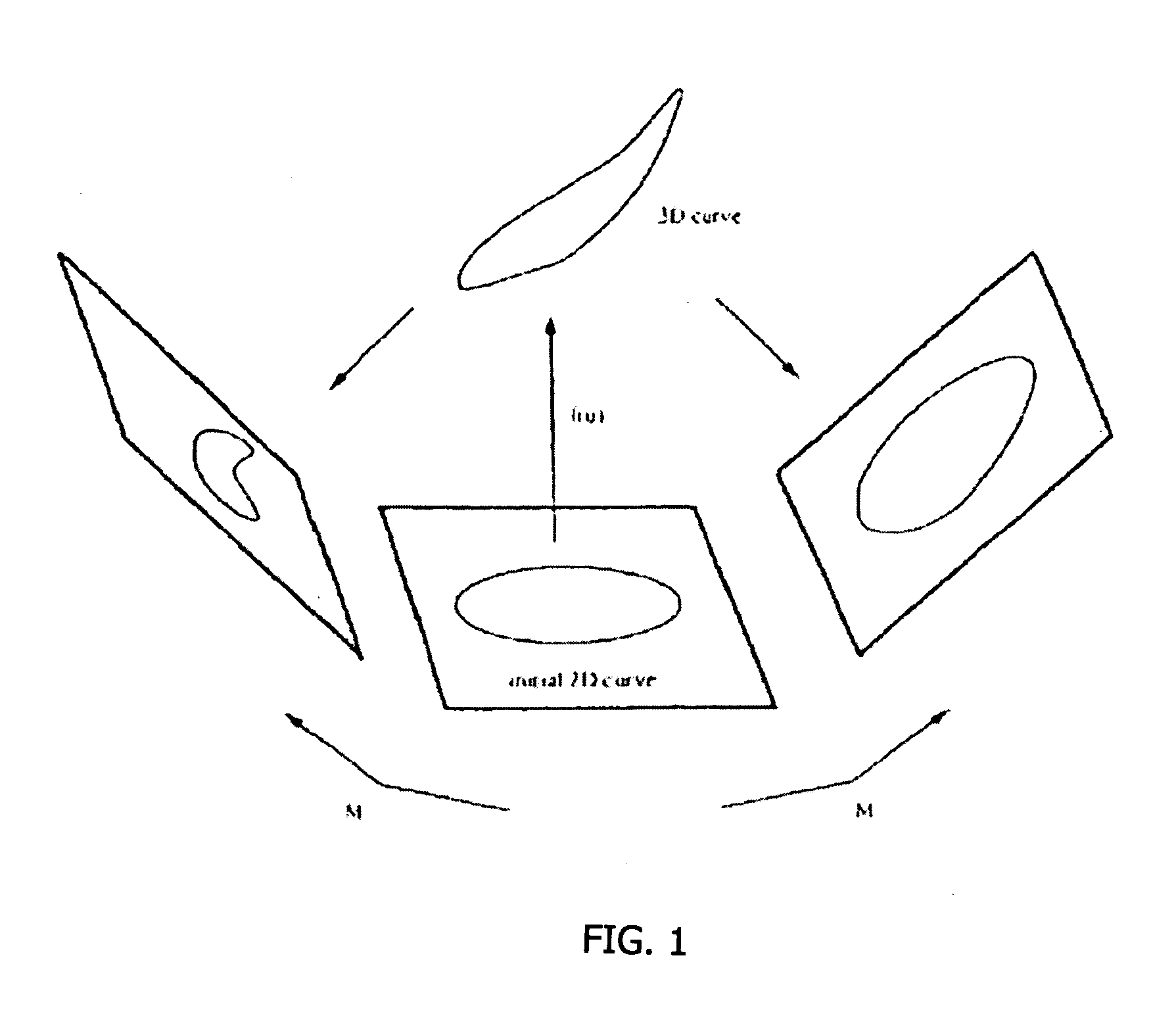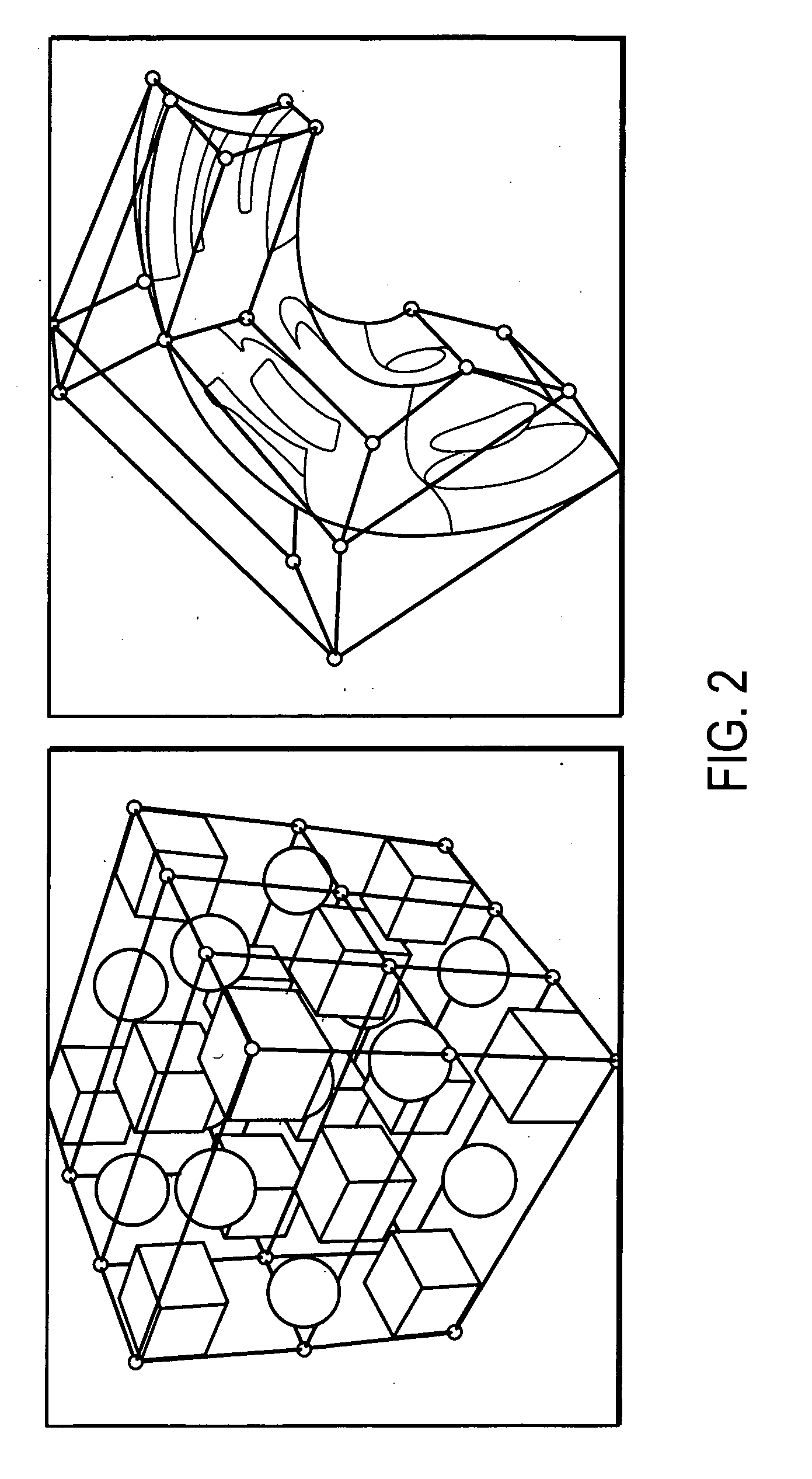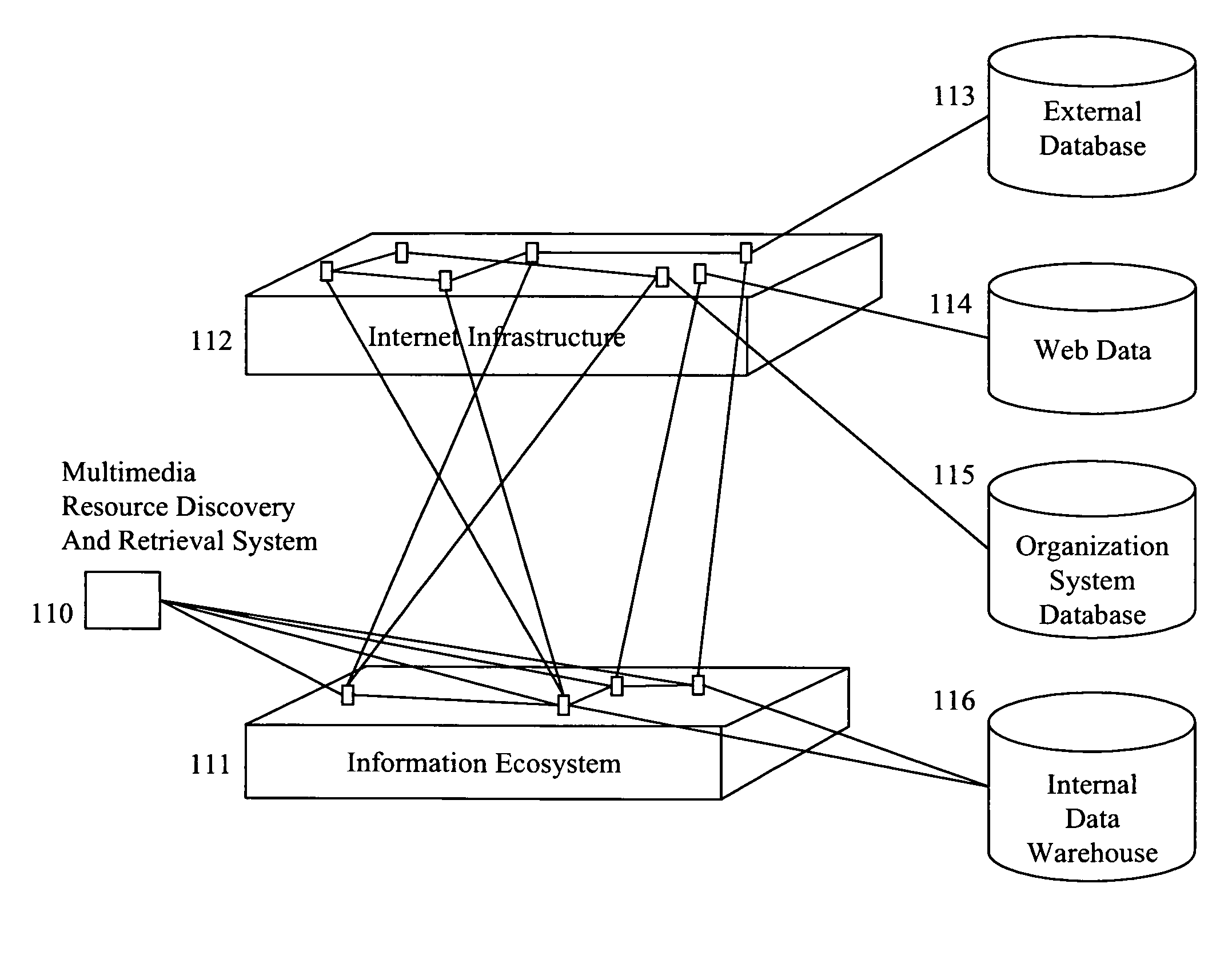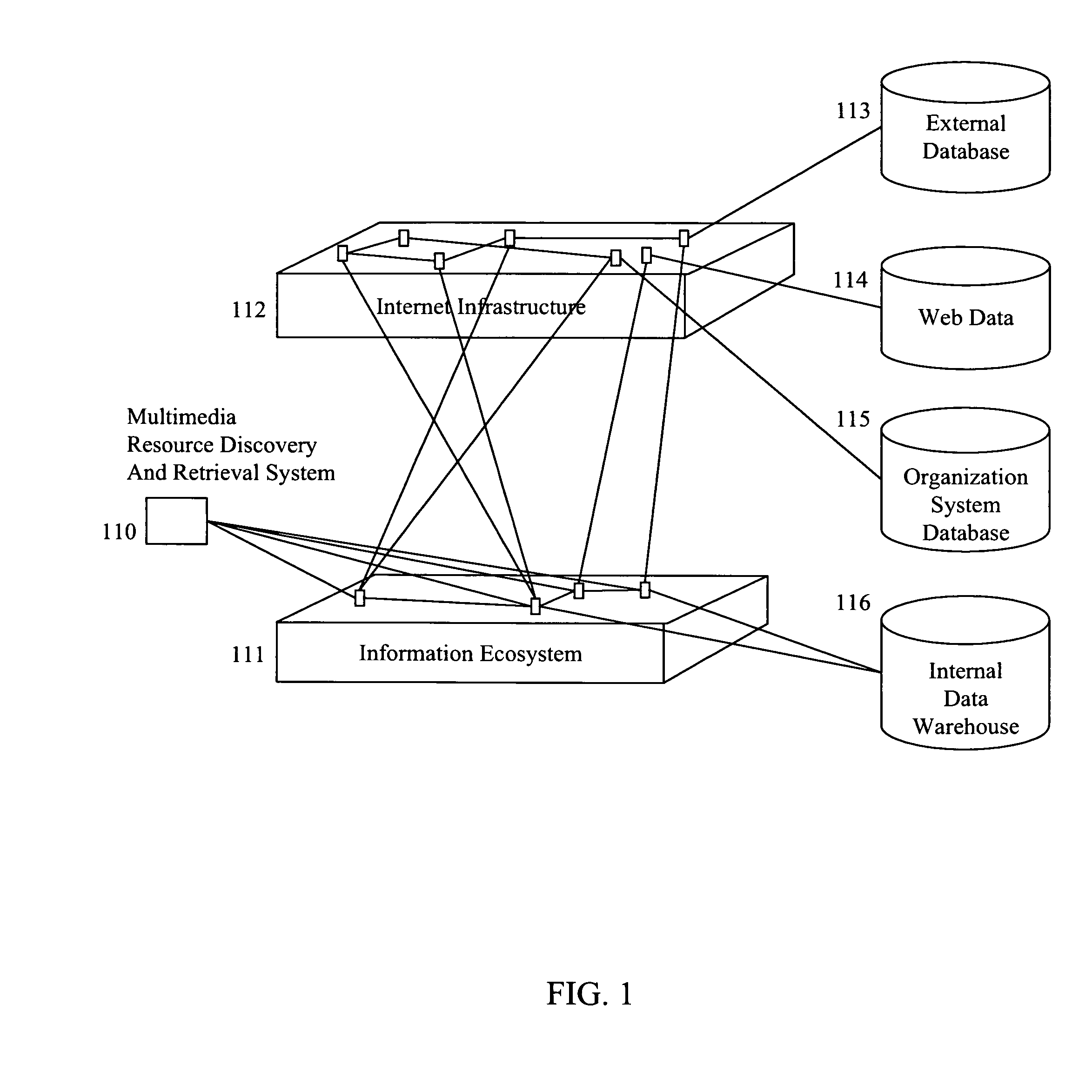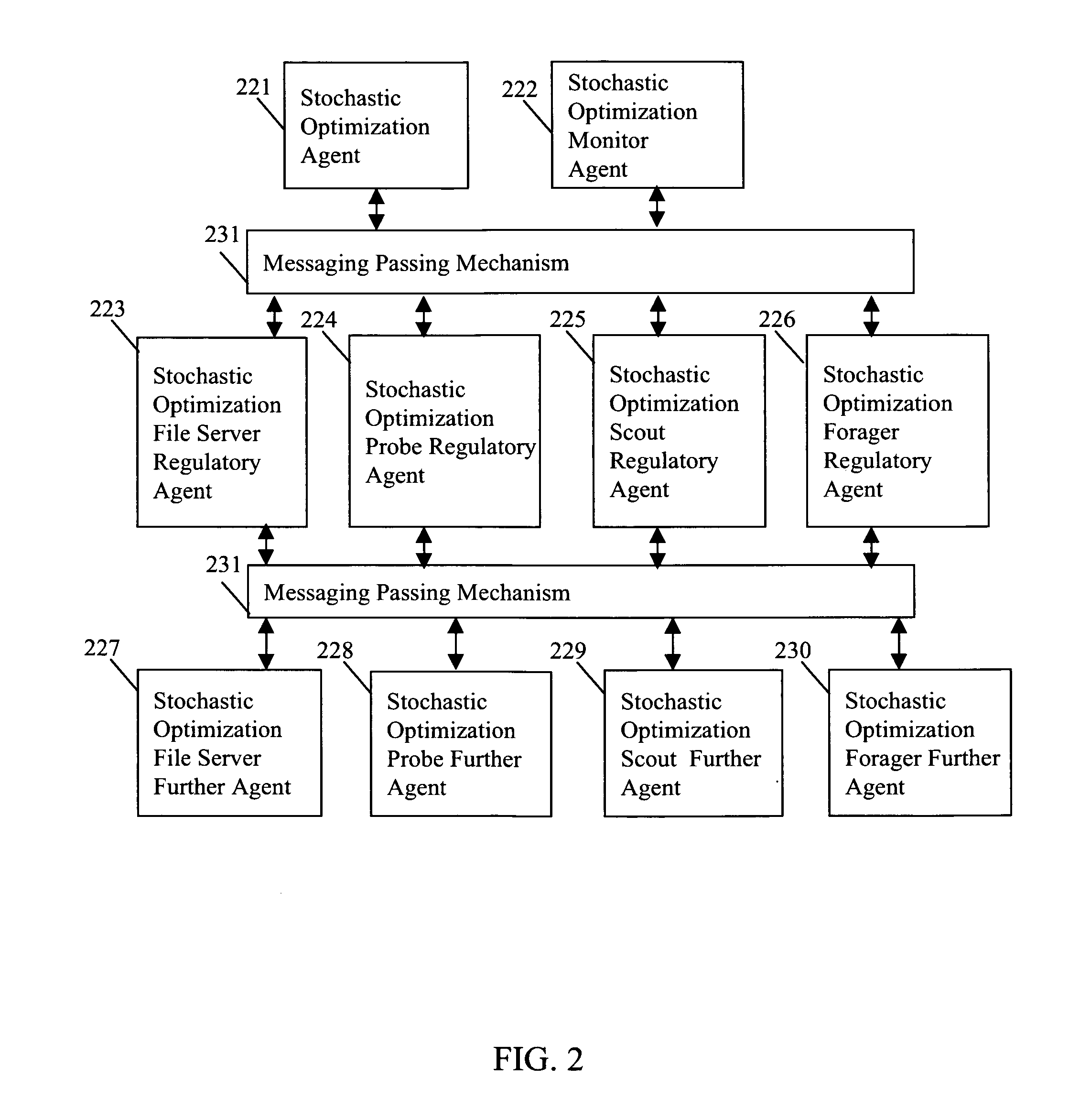Patents
Literature
137 results about "Evolution strategy" patented technology
Efficacy Topic
Property
Owner
Technical Advancement
Application Domain
Technology Topic
Technology Field Word
Patent Country/Region
Patent Type
Patent Status
Application Year
Inventor
In computer science, an evolution strategy (ES) is an optimization technique based on ideas of evolution. It belongs to the general class of evolutionary computation or artificial evolution methodologies.
System, method, and computer-accessible medium for providing a multi-objective evolutionary optimization of agent-based models
InactiveUS20080215512A1Easy to analyzeDigital computer detailsElectric digital data processingProblem descriptionAlgorithm
Agent-based models (ABMs) / multi-agent systems (MASs) are one of the most widely used modeling-simulation-analysis approaches for understanding the dynamical behavior of complex systems. These models can be often characterized by several parameters with nonlinear interactions which together determine the global system dynamics, usually measured by different conflicting criteria. One problem that can emerge is that of tuning the controllable system parameters at the local level, in order to reach some desirable global behavior. According to one exemplary embodiment t of the present invention, the tuning of an ABM for emergency response planning can be cast as a multi-objective optimization problem (MOOP). Further, the use of multi-objective evolutionary algorithms (MOEAs) and procedures for exploration and optimization of the resultant search space can be utilized. It is possible to employ conventional MOEAs, e.g., the Nondominated Sorting Genetic Algorithm II (NSGA-II) and the Pareto Archived Evolution Strategy (PAES), and their performance can be tested for different pairs of objectives for plan evaluation. In the experimental results, the approximate Pareto front of the non-dominated solutions is effectively obtained. Further, a conflict between the proposed objectives can be seen. Additional robustness analysis may be performed to assist policy-makers in selecting a plan according to higher-level information or criteria which is likely not present in the original problem description.
Owner:NEW YORK UNIV
Many-objective optimized scheduling method for combined operation of cascade hydropower stations
InactiveCN106203689AGuaranteed uniformityEnhanced Neighborhood Exploration CapabilitiesForecastingArtificial lifePareto optimalHydropower
The invention discloses a many-objective optimized scheduling method for combined operation of cascade hydropower stations, and aims at solving main problems in engineering application of standard quantum-behaved particle swarm optimization and problems in solving single-objective optimized scheduling. A multi-population evolution strategy is realized by external file set, advantageous individual selection and a chaotic mutation operator strategies, diversity of individuals is ensured, calculation of the method is accelerated, and an approximate Pareto optimal leading edge with sound distribution is obtained. An external file set is introduced to store elite individuals, dynamic update and maintenance of the file set are realized via non-inferior layered ordering and crowd distance, and distribution of the individual is kept uniform; and a chaotic mutation operator is used to carry out local disturbance on a non-control solution, and the neighborhood exploration capability of the individuals is enhanced. According to the invention, the particle swarm optimization is improved, and effectively applied to making the many-objective optimized scheduling scheme of combined operation of the cascade hydropower stations, and a feasible and high efficiency calculating method is provided for many-objective optimized scheduling of the cascade hydropower stations.
Owner:DALIAN UNIV OF TECH
Internet of Things intrusion detection method based on machine learning
ActiveCN108712404AImprove global search performanceImprove computing efficiencyCharacter and pattern recognitionNeural architecturesData setAlgorithm
The invention discloses an Internet of Things intrusion detection method based on machine learning, and belongs to the field of Internet of Things safety. The method comprises the following steps of preprocessing data, dividing a data set and carrying out data dimension reduction, constructing a least squares support vector machine, carrying out sparse processing on the least squares support vector machine, forming a base classifier, constructing a base classifier based on a neural network, carrying out intrusion behavior detection and carrying out prediction experiments. According to the method, the computational complexity is reduced by adopting a least squares support vector machine algorithm, a pruning technology and the like; an improved evolutionary strategy optimization model is adopted to get rid of extreme points, the optimal effect of the model is achieved, and the judgment accuracy can be improved. The method has the characteristics of small computational amount, low false alarm rate and high detection accuracy, and is suitable for intrusion detection in the Internet of Things.
Owner:CHONGQING UNIV OF POSTS & TELECOMM
Dynamic workflow engine supporting online self-evolution
InactiveCN102663552ASupport online self-evolutionAchieve evolutionResourcesService flowEffective solution
The invention discloses a dynamic workflow engine supporting online self-evolution. The engine mainly is composed of six parts: a workflow definition and configuration agent, a workflow execution service agent, an online self-evolution agent, a unified adapter agent, an exception handling agent and a self-evolution strategy library. According to the workflow engine, techniques of dynamic evolution, multi agent, body and the like are integrated, and main features of the engine comprise: dynamic definition, configuration, implementation and monitoring of workflow are supported; in the process of system operation, according to a system need, the execution of a service flow can be dynamically evolved; the engine has dynamic management and self-evolution ability of the workflow; the self-evolution strategy library and the online self-evolution agent are provided, and the evolution and self-adaptation of the workflow engine are realized. According to the dynamic workflow engine, an effective solution is provided for the dynamic processing and self-adaptation of the workflow in a distributed network environment.
Owner:EAST CHINA UNIV OF TECH
Five-degree-of-freedom mechanical arm inverse kinematics solving method
ActiveCN110434851ASolve the situation where inverse kinematics has no solutionHigh speedProgramme-controlled manipulatorReturn-to-zeroDegrees of freedom
The invention discloses a five-degree-of-freedom mechanical arm inverse kinematics solving method. The method comprises the following steps that 1) a positive kinematics model is established accordingto mechanical arm D-H parameters; 2) a mechanical arm tail end pose error function model is established; 3), the tail pose error function is minimized based on an evolutionary strategy algorithm; 4),an mechanical arm inverse kinematics equation is iterated within an error function allowable error; and 5), if iteration is over, the error function is not returned to zero or allowable error, and the equation is returned to the step 2 to replace the initial joint value and re-calculate is carried out. The method provided by the invention can effectively solve the problem that the mechanical arminverse kinematics is unsolved due to unfilled rank of jacobian matrix during mechanical arm inverse kinematics iteration solving. The mechanical arm inverse kinematics solving method has high speed and extremely high precision.
Owner:ZHEJIANG UNIV OF TECH
Information propagation model based on online social network and propagation method thereof
ActiveCN106682991AAccurate depictionReveal the essential laws of couplingData processing applicationsInformation propagationNetwork structure
The invention requests the protection for a information propagation model based on online social network and propagation method thereof, and belongs to the field of online social network analysis. The information propagation model is composed of accessing to the data source, building dimensional attribute driving mechanism and building dynamic evolution strategy, building hot topic propagation model. The first step, the data source is accessed. The second step, dimensional attribute driving mechanism is built, user attributes is extracted from two aspects of network structure and user history, and the effects the two factors have to the driver of the user's participation in the topic are stated quantitatively through utilizing multiple linear regression methods. The third step, dynamic evolution strategy is built, income matrix is defined and popularity is perceived, and according to evolutionary game theory, building dynamic evolution strategy. The fourth step, hot topic propagation model is built. The user multidimensional attribute model, dynamic evolution strategy and traditional SIR model build a novel hot topic propagation model. The invention has the advantages of being effective to describe the spread of trend hot information in social networks and reveal the influence of different driving factors on information dissemination.
Owner:CHONGQING UNIV OF POSTS & TELECOMM
Multi-target spectrum allocation method based on undisposal order preference quantum goose group algorithm
InactiveCN102316464ASolving discrete multi-objective optimization problemsFast convergenceNetwork planningFrequency spectrumEvolution rule
The invention aims at providing a multi-target spectrum allocation method based on an undisposal order preference quantum goose group algorithm, which comprises the following steps of: building a graph theory coloring model of cognitive radio spectrum allocation, initializing the position of the quantum geese and the quantum speed, carrying out the undisposal order preference and congestion degree calculation on individuals in the population according to the adaptability, sequencing the individuals with the same undisposal order preference levels in sequence from higher congestion degrees to lower congestion degrees, carrying out evolution on the population by a quantum goose group evolution rule, generating new quantum speed and position, carrying out undisposal order preference on obtained solutions in an elite solution set nonDomQGSAList and selecting the solutions with the undisposal solution level being 1 as the final Pareto front end solution set. The method solves the discrete multi-target optimization problem, designs the novel undisposal order preference quantum goose group algorithm as the evolution strategy and has the advantages that the convergence speed is high, and the precision is high. In addition, the method provided by the invention has a wider application range.
Owner:三亚哈尔滨工程大学南海创新发展基地
UAV group task allocation method based on quantum crow group search mechanism
ActiveCN108549402ASolve problemsFast convergencePosition/course control in three dimensionsModel NumberComputer science
The invention relates to a UAV group task allocation method based on a quantum crow group search mechanism. The UAV group task allocation method comprises the steps of: establishing a UAV group task allocation model from a plurality of start points to a plurality of tasks, wherein the UAV group task allocation model comprises UAV model numbers, start and end points, and an allocation model; initializing a quantum crow group; calculating the fitness of each quantum crow according to a fitness function, and storing a position of the quantum crow corresponding to the minimum value of the fitnessfunction as a globally optimal food position; updating a quantum position and the position of each quantum crow; and calculating the fitness of each quantum crow according to a fitness function, determining a hidden food position of each quantum crow, finding the optimal food position so far, outputting the globally optimal food position if the maximum iteration algebra is reached, and mapping themaximum iteration algebra into a task allocation matrix. The UAV group task allocation method solves the discrete multi-constrained objective function solving problem, designs a discrete quantum crowalgorithm as an evolution strategy, and has the advantages of fast convergence speed and high convergence precision.
Owner:HARBIN ENG UNIV
Method for identifying synchronous generator parameters
InactiveCN102073014AThe identification process is simpleThe operating principle is reliableDynamo-electric machine testingTransient statePower Management Unit
The invention belongs to the technical field of identifying synchronous generator parameters, and relates to a method for identifying the synchronous generator parameters by an improved evolution algorithm. Starting from an randomly-generated initial generator parameter group, optimal solution is searched through generation of an initial group, fitness calculation, recombination, mutation and selection, and stopping operation according to operating principles of struggle for existence and survival of the fittest by using actual measurement data in a power management unit (PMU) in a wide area measurement system (WAMS); and an improved evolution strategy algorithm of biomimicry is taken as optimizing theoretical basis, the decoupling of a direct axis and a quadrature axis of the synchronousgenerator and steady state and transient state are processed separately, an initial practicable parameter group is established through design parameters, and a differential equation of a higher orderis calculated by selecting a high-precision improved Euler method, so that the output variable set by the generator is solved, the optimizing process is realized through recombination, mutation and selection of the initial group, and the synchronous generator parameters are identified. The method is simple and has a reliable principle, and the correctness of the parameter identification is high.
Owner:NORTH CHINA GRID +1
Distribution network expansion planning method based on strategy adaption differential evolution
InactiveCN104102956AEasy to adjustIntuitive planning processForecastingInformation technology support systemElectric distribution networkPlanning method
The invention discloses a distribution network expansion planning method based on strategy adaption differential evolution. A capital time value is considered, calculation is carried out according to equal amount installment payment capital recovery, a model is established by taking least annual investment and operation maintenance cost as a target, a differential evolution algorithm based on strategy adaption on the basis of the model is proposed, an optimal solution obtained by the algorithm is decoded, a planning line is drawn on an electric power GIS (geographic information system) platform according to a line number obtained by decoding to carry out structure repair to an individual, and the individual is enabled to satisfy a radiative network structure. An adaption evolutionary strategy is continuously updated in an iteration process to prevent the algorithm from being trapped in local optimum, and a planning process of a distribution network line is enabled to exhibit better interactivity, more intuitive planning result and flexibility in planning scheme regulation by a GIS.
Owner:杭州中威智能科技有限公司 +1
Parallel multi-objective optimized scheduling method for cascaded hydropower station group
ActiveCN105719091AGuaranteed independenceDiversity guaranteedResourcesDecision makerMulti population
The invention relates to a parallel multi-objective optimized scheduling method for a cascaded hydropower station group. A multi-population evolution strategy is used to ensure the relative independence of small-scale subpopulations, elite individuals of a Pareto solution set are coupled to an inter-population annular migration mechanism in the evolution process, information is transmitted and back fed mutually among the subpopulations, and the individual diversity and guidance quality of the solution set are ensured; and a multi-core parallel calculation technology is used to realize synchronized evolution of the subpopulations, waste of calculation resources under in the serial calculation mode is avoided, and calculation is accelerated. According to the invention, the calculable scale of optimized scheduling of the cascaded hydropower station group is further enlarged, a reasonable and feasible scheduling scheme set is provided for a decision maker, the calculation efficiency is ensured, and the method of the invention is a feasible method to realize multi-objective optimized scheduling for the cascaded hydropower station group.
Owner:DALIAN UNIV OF TECH
Autonomous experimental design optimization
InactiveUS7831418B1Improve convenienceGeometric CADMulti-objective optimisationComputer softwareSurface structure
Iterative (nondeterministic) optimization of aerodynamic and hydrodynamic surface structures can be accomplished with a computer software program and a system using a combination of a variable encoding length optimization algorithm based on an evolution strategy and an experimental hardware set-up that allows to automatically change the surface properties of the applied material, starting with the overall shape and proceeding via more detailed modifications in local surface areas. The optimization of surface structures may be done with a computing device for calculating optimized parameters of at least one (virtual) surface structure, an experimental hardware set-up for measuring dynamic properties of a specific surface structure, and an interface for feeding calculated parameters from the computing device to the experimental set-up and for feeding measured results back to the computing device as quality values for the next cycle of the optimizing step.
Owner:HONDA RES INST EUROPE
Method and system for auditing and distributing sensitive data based on evolution strategy
InactiveCN101894239AMeet application needsReflect actual behaviorData processing applicationsDigital data protectionData integrityData set
The invention relates to the technical field of information safety, particularly to a method and a system for auditing and distributing sensitive data based on an evolution strategy. The system of the invention comprises a risk evaluation module based on trust, an auditing and distributing module based on a strategy, a data leakage auditing module and a sensitive data management service module; the risk evaluation module calculates the trust level of the user behavior and investigates the intersection of a leakage set and an intersection of an acquired set of the user, so that the crime risk of the user is obtained; the distributing module determines a distribution policy under the guide of a crime factor and a judging sum formula according to user application and distribution records; and the auditing module records a distributing log, counts the information for analyzing the user behavior and the data leakage, and feeds back an auditing result to the risk evaluation module and the distributing module. The invention meets the requirements of the anti-leakage application of the sensitive data having high requirements for data completeness; the detection source is detected by the intersection of the acquired data set of the user and the leakage data set; and no watermark information needs to be imbedded, so that the invention meets the application requirements of the sensitive data having high requirements for the completeness and the privacy.
Owner:WUHAN UNIV
A decomposition-based train operation multi-objective differential evolution algorithm
ActiveCN109815523AAchieve securityAccurate parkingInternal combustion piston enginesBiological modelsUniform designDecomposition
The invention discloses a decomposition-based train operation multi-objective differential evolution algorithm. The algorithm comprises the steps of 1, establishing a train elementary substance pointdynamical model; 2, establishing a train multi-objective optimization model according to the train multi-objective operation requirement; Step 3, decomposing the train operation multi-objective optimization problem into N single-objective optimization sub-problems by adopting a Chebyshev method; 4, in order to ensure the uniformity of the obtained Pareto solution, generating a weight vector by adopting a formula uniform design method; And 5, selecting an evolution strategy to form a differential evolution strategy pool, and improving the diversity and convergence of an evolution process by adopting a self-adaptive differential evolution strategy based on reputation. The train operation multi-objective optimization problem is converted into the single-objective problem, on the basis that the uniformly distributed weight vectors are obtained, multiple control strategies are provided for the train on the premise that safety is guaranteed through the self-adaptive differential evolution strategy, and safe, quasi-point, accurate parking and low-energy-consumption operation of the train are achieved.
Owner:NANJING INST OF TECH
Warfarin dose prediction modeling method based on integrated evolution learning
InactiveCN107993723AImprove stabilityImprove generalization abilityMedical simulationEvolution strategyCrucial point
The invention discloses a warfarin dose prediction modeling method based on integrated evolution learning. The method comprises the following steps: (1) based on genetic coding, evoluting primary functions; (2) calculating a coefficient based on an evolutionary strategy; (3) obtaining M candidate models based on the selection and optimization of a genetic algorithm framework; (4) selected m modelsto perform weight-sum integration based on the M candidate models, and obtaining a final prediction model; integrally learning an obtained regression prediction model to perform actual prediction oftest set data. According to the method, the model is constructed in an integrated evolution learning mode, and the integrated evolution learning is a key point for constructing a model for accuratelypredicting the warfarin dose; compared with modeling methods such as a Bayesian decision system, an artificial neural network and a support vector machine, an integrated evolutionary regression modelhas better generalization capability. Compared with an individual evolution regression model, the integrated evolutionary regression model has better stability.
Owner:SUZHOU UNIV
System, method, and computer-accessible medium for providing a multi-objective evolutionary optimization of agent-based models
InactiveUS8015127B2Digital computer detailsElectric digital data processingProblem descriptionTechnical standard
Agent-based models (ABMs) / multi-agent systems (MASs) are one of the most widely used modeling-simulation-analysis approaches for understanding the dynamical behavior of complex systems. These models can be often characterized by several parameters with nonlinear interactions which together determine the global system dynamics, usually measured by different conflicting criteria. One problem that can emerge is that of tuning the controllable system parameters at the local level, in order to reach some desirable global behavior. According to one exemplary embodiment t of the present invention, the tuning of an ABM for emergency response planning can be cast as a multi-objective optimization problem (MOOP). Further, the use of multi-objective evolutionary algorithms (MOEAs) and procedures for exploration and optimization of the resultant search space can be utilized. It is possible to employ conventional MOEAs, e.g., the Nondominated Sorting Genetic Algorithm II (NSGA-II) and the Pareto Archived Evolution Strategy (PAES), and their performance can be tested for different pairs of objectives for plan evaluation. In the experimental results, the approximate Pareto front of the non-dominated solutions is effectively obtained. Further, a conflict between the proposed objectives can be seen. Additional robustness analysis may be performed to assist policy-makers in selecting a plan according to higher-level information or criteria which is likely not present in the original problem description.
Owner:NEW YORK UNIV
Autonomous experimental design optimization
Iterative (nondeterministic) optimization of aerodynamic and hydrodynamic surface structures can be accomplished with a computer software program and a system using a combination of a variable encoding length optimization algorithm based on an evolution strategy and an experimental hardware set-up that allows to automatically change the surface properties of the applied material, starting with the overall shape and proceeding via more detailed modifications in local surface areas. The optimization of surface structures may be done with a computing device for calculating optimized parameters of at least one (virtual) surface structure, an experimental hardware set-up for measuring dynamic properties of a specific surface structure, and an interface for feeding calculated parameters from the computing device to the experimental set-up and for feeding measured results back to the computing device as quality values for the next cycle of the optimizing step.
Owner:HONDA RES INST EUROPE
Hyperspectral image classification method based on immune evolutionary strategy
InactiveCN101826160AImprove classification accuracyOptimal time complexityWave based measurement systemsGenetic modelsHuman–machine interfaceTime complexity
The invention relates to a hyperspectral image classification method based on an immune evolutionary strategy and develops a corresponding simulation prototype system. The system comprises the following four functional modules: a human-machine interface module, a hyperspectral optimal band selection module, a hyperspectral terrain classification module and a classification result output module. The method comprises the following steps: 1. obtaining the initial data and related initialization operations; 2. initializing populations; 3. initially selecting the populations; 4. cloning the populations; 5. mutating the populations in a mixed manner; 6. selecting the memory populations; 7. supplementing the population antibodies; 8. carrying out iterative computations and repeating the steps from 3 to 7 until achieving the maximum evolutionary generation; 9. using the optimal antibody to carry out terrain classification on the hyperspectral data; and 10. outputting the terrain classification results of the hyperspectral images. The method can adaptively select the optimal band combination needed by different terrain classifications under different scenes, has better time complexity and good robustness and is high in classification precision and wide in applicable scope.
Owner:BEIHANG UNIV
Integrated optimization method for arch truss chip mounter based on coevolution
The invention provides an integrated optimization method for an arch truss chip mounter based on coevolution. The method mainly comprises the following steps: (1) building a suction nozzle configuration optimization model and an integrated optimization mathematical model combining feeder allocation and component bonding order; (2) utilizing linear program to solve the suction nozzle configuration optimization model; (3) conducting coevolution on the feeder allocation and the component patching order adopting evolution strategies of neighborhood competition, cross-connection, variation and partial search based on coevolution to enable moving path of a bonding head to be minimum during a bonding process. The integrated optimization method has the advantages that working time of the chip mounter is shortened, and bonding efficiency is effectively improved; the method can be applied to optimization control of the arch truss chip mounter during a surface assemble process; the method overcomes the defect that conventional optimization methods are instable and simplex to solve a complex multi-decision optimization problem, and adopts coevolution to conduct simultaneous optimization on multiple subproblems.
Owner:SOUTH CHINA UNIV OF TECH
Particle swarm optimization algorithm based on clustering degree of swarm
InactiveCN105095595AImprove global search performanceReduce the possibilitySpecial data processing applicationsParticle swarm algorithmParticle clustering
The present invention discloses a particle swarm optimization algorithm based on a clustering degree of a swarm. The algorithm comprises the following steps of carrying out initialization; updating the swarm; judging whether a number of iterations is greater than a preset number of iterations and executing a corresponding step; judging whether a number of update iterations is greater than a preset number of times of stagnation and executing a corresponding step; calculating a particle clustering degree of each particle and a particle clustering degree of a swarm optimal position so as to acquire a distance between each particle and the swarm optimal position; according to a fitness of each particle, selecting a plurality of particles of which the number accords with a swarm scale to form a current swarm; and carrying out iterative optimization and updating until the maximum number of iterations is reached. According to the particle swarm optimization algorithm disclosed by the embodiment of the present invention, different evolutionary strategies can be adopted for different particles according to the progress of the optimizing process and the particle clustering degree so as to reduce the possibility of falling into the local minimum, improve the global searching ability of the algorithm and effectively avoid premature convergence.
Owner:STATE GRID CORP OF CHINA +2
Elevator dispatching strategy processing method, device and equipment, and storage medium
ActiveCN110171753ASolve problems that cannot be applied to complex elevator call situationsElevatorsStrategic analysisComputer science
The embodiment of the invention discloses an elevator dispatching strategy processing method, device and equipment, and a storage medium. The method comprises the steps of obtaining the operating status information of at least two elevators and outside calling information of each floor; entering the operating status information and the outside calling information into a preset strategy predictionmodel for strategic analysis, and obtaining the initial scheduling strategies of the elevators; building an initial strategy group based on the initial scheduling strategies; performing evolutionary treatment to the initial strategy group, and obtaining an evolutionary strategy group; determining the adaptation of each candidate evolution strategy in the evolutionary strategy group according to obtained elevator parameter information; and taking the candidate evolution strategies with the adaption meeting the preset conditions as target scheduling strategies, and achieving the technical effectof formulating the adaptive target scheduling strategies for complex elevator calling conditions.
Owner:HITACHI BUILDING TECH GUANGZHOU CO LTD
Implementation method of retina encoder using space time filter
InactiveCN101017535AIncrease flexibilityImprove adjustabilityEye implantsBiological neural network modelsRetinaTime space
This invention relates to one visual film coding method in computer application field, which comprises the following steps: inputting specimen image into time and space filter to get the BP human neural network input, train BP human neural net and to determine human neural net weight value; then inputting specimen any image and taking one random set of filter parameters by use of particle set or strategy method in filter parameter range for optimization; through multiple overlap, outputting image converged to input image and the parameters of the filter are determined with output impulse excitation is relative to input image film codes.
Owner:SHANGHAI JIAO TONG UNIV
Wireless sensor network positioning method based on adaptive differential evolution algorithm
ActiveCN109379780AImprove solution speedHigh solution accuracyNetwork topologiesWireless mesh networkWireless sensor networking
The invention relates to the field of wireless sensor networks and intelligent computing and relates to a wireless sensor network positioning method based on an adaptive differential evolution algorithm, wherein on the basis of a basic differential evolution algorithm, neighborhood information and historical search information are fused to coding; an adaptive control mechanism is introduced; basedon the adaptive differential evolution algorithm, an adaptive covariance matrix evolution strategy is combined; the method is an efficient wireless sensor network positioning method. The invention provides an adaptive mechanism to control global search and local search; by fusing the strong global search capability of the differential evolution algorithm and the excellent partial search capability of the adaptive covariance matrix evolution strategy, the wireless sensor network is made to have higher positioning precision and better robustness.
Owner:SOUTH CHINA UNIV OF TECH
Active distribution network measurement optimization and configuration method containing node injection power uncertainty
ActiveCN105720578ALow running costImprove economyForecastingAc network circuit arrangementsData acquisitionModelling analysis
The invention discloses an active distribution network measurement optimization and configuration method containing node injection power uncertainty. The uncertainties of a large-scale electric vehicle charging load and photovoltaic power generation system output are modeled and analyzed by a dynamic probability density function; the network observability of the active distribution network after containing the node injection power uncertainty is analyzed from a state evaluation angle; an active distribution network measurement optimization and configuration model containing the node injection power uncertainty is established; and the active distribution network measurement optimization and configuration model is optimized and solved by adopting an adaptive covariance matrix evolutionary strategy to obtain a data acquisition point optimal configuration scheme under the premise of ensuring the complete observability of the network. By adoption of the method, the shortcoming that the electric vehicle charging randomness and the photovoltaic power generation system output intermittence are neglected in the current distribution network situation awareness program is overcome; theoretical support for further safety evaluation of the active distribution network is supplied; and in addition, the safe operation and control economical efficiency of the active distribution network can be further improved.
Owner:SOUTHEAST UNIV
Evolutionary optimization and free form deformation
Techniques are provided for representation of designs using a basic design which is then modified by a transformation function. In free form deformation techniques the transformation function is defined by a spline function which transforms the space in which the design is defined into a second space where the new modified design is defined. During the design process the parameters of the spline function determine the parameters of the transformation function. While using Evolution Strategies, parameters of the spline function also determine the parameters the optimization algorithm works in. In order to adapt the transformation function optimally to the given problem and the necessary modification a mutation operator is proposed which allows introduction and deletion of control points. Instead of the standard mutation operator in evolution strategies this mutation operator works on the representation of the problem / design.
Owner:HONDA RES INST EUROPE
Key circuit unit positioning method oriented to multiple input vectors
ActiveCN109522628ARaise the level of reliabilityEffective positioningCAD circuit designSpecial data processing applicationsMulti inputAlgorithm
The invention relates to a key circuit unit positioning method oriented to multiple input vectors. Firstly, the circuit subnet table is read and analyzed, and the related quantities are initialized. Secondly, the initialization method of the critical weights of each circuit unit is constructed through the randomness strategy. Secondly, based on the gradient evolutionary strategy, an adaptive convergence algorithm for calculating the critical weights of circuit elements is designed. Then, based on the adaptive convergence characteristics of the proposed method and the weight relation, the key order of each circuit unit in the circuit structure is given. The invention not only ensures high positioning accuracy, but also has fast calculation speed.
Owner:ZHEJIANG UNIV OF TECH
Segmented search geomagnetism bionic navigation method based on evolution strategy
InactiveCN109813304ASuccessfully completedComplete efficientlyNavigational calculation instrumentsNavigation by terrestrial meansInvisibilityMulti targeting
The invention provides a segmented search geomagnetism bionic navigation method based on an evolution strategy. A multi-target evolution algorithm is used as a theoretical basis, and on the basis of completing the activities such as homing and migration by drawing lessons from bio-utilization geomagnetism in the nature, starting from the bio-magnetism trend sensitivity angle, the geomagnetism bionic navigation method based on the evolution strategy and independent of a prior data bank is provided. The method has the advantages of being all-weather, completely autonomous, high in invisibility,free of cumulative errors, suitable for unknown environments and the like.
Owner:NORTHWESTERN POLYTECHNICAL UNIV
Evolutionary optimization and free form deformation
InactiveUS20060187219A1Image data processing detailsSpecial data processing applicationsMutation operatorAlgorithm
Techniques are provided for representation of designs using a basic design which is then modified by a transformation function. In free form deformation techniques the transformation function is defined by a spline function which transforms the space in which the design is defined into a second space where the new modified design is defined. During the design process the parameters of the spline function determine the parameters of the transformation function. While using Evolution Strategies, parameters of the spline function also determine the parameters the optimization algorithm works in. In order to adapt the transformation function optimally to the given problem and the necessary modification a mutation operator is proposed which allows introduction and deletion of control points. Instead of the standard mutation operator in evolution strategies this mutation operator works on the representation of the problem / design.
Owner:HONDA RES INST EUROPE
Stochastic search strategies for multimedia resource discovery and retrieval system
ActiveUS20120016820A1Reduce effortEnhance physical fitnessMultimedia data indexingDigital computer detailsResource utilizationThe Internet
A method is described for applying distributed stochastic optimization techniques of evolutionary computation using a plurality of servers and a plurality of clients machines being connected via a computer network such as the Internet. The stochastic optimization techniques of evolutionary computation seek to optimize a populations of individuals against one or more predetermined fitness criteria when applied to solving solve the network routing problem coupled with one or more information retrieval problems. The field of evolutionary computation encompasses stochastic optimization techniques, such as randomized search strategies, in the form of evolutionary strategies (ES), evolutionary programming (EP), genetic algorithms (GA), classifier systems, evolvable hardware (EHW), and genetic programming (GP). The stochastic optimization component objectives of the multimedia resource discovery and retrieval systems includes maximization of resource utilization and of overall LAN throughput.
Owner:TAPICU
Coevolutionary algorithm optimized support vector machine wetland remote sensing remote sensing classification method
ActiveCN107067035AReduce diversityIncrease diversityScene recognitionSupport vector machineLocal optimum
Provided is a coevolutionary algorithm optimized support vector machine wetland remote sensing remote sensing classification method, belonging to the technical field of remote sensing. The method includes the following steps of 1. adopting an individual coding manner; 2. calculating the individual fitness function; and 3. performing PSO-GA coevolutionary algorithm: (1) initializing the population and parameters; (2) adopting a PSO evolution strategy; (3) adopting a GA evolution strategy; (4) selecting the filial generation; and (5) updating the selection probability of the strategies. The PSO-GA coevolutionary algorithm is adopted to carry out the optimization selection of the SVM model parameters, the algorithm combines the PSO and GA and takes the optimization parameters and the high-precision classification as the design scheme to perform the probability selection of the evolution strategies, and through the combination of the two evolution calculating modes, the global searching capability is guaranteed to prevent from local optimization and the evolution speed is improved.
Owner:HARBIN NORMAL UNIVERSITY
Features
- R&D
- Intellectual Property
- Life Sciences
- Materials
- Tech Scout
Why Patsnap Eureka
- Unparalleled Data Quality
- Higher Quality Content
- 60% Fewer Hallucinations
Social media
Patsnap Eureka Blog
Learn More Browse by: Latest US Patents, China's latest patents, Technical Efficacy Thesaurus, Application Domain, Technology Topic, Popular Technical Reports.
© 2025 PatSnap. All rights reserved.Legal|Privacy policy|Modern Slavery Act Transparency Statement|Sitemap|About US| Contact US: help@patsnap.com
